

Do’s and Don’ts for People Travelling to Germany
by fredo21
October 2, 2020
1 Comments
Germany is still one of the world’s biggest machinery and car manufacturers, offering travelers a unique cultural and historic experience. Its old timber houses, beer, delectable bread, gorgeous castles, and Baroque buildings are nothing short of enthralling.
The country has its own set of customs just like any other country in the world. While some of them vary by region, some etiquette is standard nationwide.
Germans place great value on upholding them. Keep the following do’s and don’ts in mind if you’re planning a trip to the heart of Europe in the future. They will earn you the respect and perhaps even friendship of locals.

Do be on Time
Being on time means being early in Germany – there’s no harm in sich verfrühen here. The concept of being fashionable late is frowned upon. It wouldn’t be an exaggeration to say dates, timetables, appointments, and deadlines have the weight of a solemn oath in this country.
Being late is equivalent to contract breach. If it happens, you need to call to warn people in advance and have a good excuse.
Do Share Rides
Cabs are a bit pricey in Germany. The minimum fare is EUR 5.00 even if you’re taking the cab to somewhere within walking distance, which you might be doing if you overindulged in the local beer. It’s best to avoid taxis outright if you’re on a shoestring budget.
Share rides if taking a cab is your only option. There are many ridesharing options here irrespective of distance. In very small towns or villages, there probably won’t be any Uber. You’ll have to make do with buses and cabs. One alternative is car rental.
Do Bring Enough Cash
Unlike the US, cards aren’t accepted everywhere. What’s more, there might not be an ATM in sight. If it is, it might not be your issuing bank’s and you’ll pay upwards of 5 euros as a withdrawal fee. It really is best to have cash on you everywhere you go.
In addition, Germans themselves prefer paying cash because it’s easier for them to monitor how much they spend this way. It must work because Germans are very savvy when it comes to finances. Their level of debt is extremely low compared to that of Americans and most other European nations.
To make a long story short, the restaurant of your choice might not accept cards, so always have Euros on you to avoid inconvenience.
Do Make Eye Contact When Raising Your Glass
Admittedly, a lot of countries have this custom, but in very few is it such a big deal when you don’t make eye contact during a toast. It’s considered disrespectful. Some Germans also believe you will be unlucky in love if you don’t look someone in the eye when raising your glass.
Do Buy a Transport Card
Germany was one of the first countries to have a very well-developed public transport network. There is a myriad of bus and subway lines in most towns and cities.
For instance Bonn, a city of fewer than 350,000 people, has around 15 subway lines. A 2 or 3-day pass will allow you to use any bus or train for free and for as long as you like.
If you’d rather buy tickets, make sure you always stamp them. You’ll find subways don’t have ticket sellers and transport inspectors (Kontrolleure) are a rarity.
Still, you don’t want to be caught and fined, which can happen because people are tempted to save some cash and use public transport for free. Tickets are purchased from machines and they’re more expensive than cards.
Do try German Bread and Beer
Hundreds of types of bread in all sizes and shapes are produced in Germany. This is a staple food and an important part of the country’s culture. It’s freshly baked daily and smells delightful.
More than 5,000 beer brands are produced in Germany’s (about) 1,400 breweries. Sorts include Hellbier, Kölsch beer (popular around Cologne and Bonn), Altbier, and Weißbier. If you don’t try German beer and bread, it’s like you never went to Germany.
Don’t Call After 20:00
It’s rude to call someone after 8 pm unless you’re really close. This is considered a disturbance of their evening routine, which usually revolves around dinner and Tatort, the German version of CSI.
The main sports news is on from 6 and 7 pm on Saturday, making this the worst interval for calls. Lively comments on social networks accompany the head sports emission. Predictably, messages on Facebook, WhatsApp, and Instagram are tolerable at all hours.
Don’t Ignore Recycling Rules
Germany was one of the first European countries to adopt strict recycling rules, and waste separation rules remain in full force to this day. It is a mortal sin to dispose of organic waste in the bin for recyclables and vice versa.
At first, you won’t have any idea of what goes where. There are tens of bins in all different colors on most street corners. They are also locked. You won’t have the key.
The best way is to just ask a local for guidelines on waste separation and recycling. Germans are unforgiving of mistakes because they want to retain their status of the top-ranked recycler worldwide.
There is a monetary deposit for aluminum cans, glass bottles, and plastic bottles on top of their prices. When you return to cans or bottles, you get your deposit back at the supermarket.
If you have a lot of bottles, this might be a pretty penny. If that’s not enough to motivate you, expect to be frowned at or even reprimanded by locals if you throw cans or bottles in the trash instead of returning them to their rightful place.
Don’t Make Noise Whenever You Feel Like It
If you believe noise means life, you might not be happy when you visit Germany. Noise has fixed hours here. You can’t partake in home improvement, mow your lawn, or play loud music between 10 pm and 7 am or around noon.
Public holidays and Sundays are off limits too. Children can’t be expected to be quiet all the time, so children making noise is an exception.
Never Walk in the Cycling Lane
Germans’ proverbial affinity for order is no secret to anyone. Like many other countries, they have specific lanes for pedestrians and for cyclists.
Unlike many other countries, the consequences of cycling in the pedestrian lane or walking in the cycling lane can be costly. You’ll receive an unfriendly, even an angry reaction, including cursing or yelling against the background of a fiercely ringing bicycle bell.
Don’t Talk or Even Mention the Third Reich
Not even as a joke. There is a neo-Nazi underground scene here like everywhere else, but anything to do with the Third Reich and Hitler is off limits outside of it.
There you have it! What do you think should we add to this list? Sound off in the comments!
About the author
Leave a Reply
Your email address will not be published. Required fields are marked
And don’t J-walk! Well you can, it’s just it’s not done here and us frowned upon.
You might also like
Learning Method
Sentence Structure and Word Order in German
German declension: the four grammatical cases in detail, prepositions with dative, accusative, and mixed, learn all about german two-way prepositions: what they are and how to use them.

17 Hilariously True Must-Knows Before You Travel to Germany
Last Updated: August 12, 2022
*FYI - this post may contain affiliate links, which means we earn a commission at no extra cost to you if you purchase from them. Also, as an Amazon Associate I earn from qualifying purchases. Check out our Privacy Policy and Disclosure. for more info.
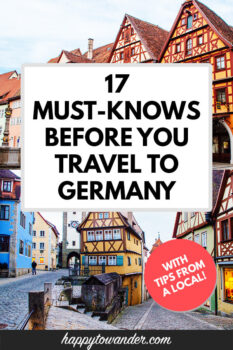
While I love exploring new places, there’s something special about travel in Germany that just gets me.
There’s mindblowing nature next to fairytale towns, big vibrant cities next to mounds of potato and meat 😉 By my accounts, it’s a near-perfect place.
… and that’s why I love it here!
There are certain quirks however that I wish was aware of before I decided to travel in Germany (and um, you know, eventually move there).
Save this post for later on Pinterest:

Despite being so similar to North America in many ways, there are radical differences to home that disorient even the most seasoned travellers.
Having learned most of these things the hard way, I’ve decided to valiantly compile my best tips for you – the important things you must keep in mind when you travel to Germany!
PS: I know, I know – Germany is a massive country, and it’s bad to generalize.
Much of my experience has been in Bavaria , where I live, and no, not all these tips will apply everywhere, but I have travelled a fair bit around the country as well and have found that much of this holds true.
Anyways, enough yapping – grab a beer and notepad – it’s time to travel Germany through these 17 important tips!
TIP: If you are still doing research for your trip to Germany, here are some recommendations. I always use Omio to compare/book transport options in Europe. It’s a free site that compares planes, trains and buses all at once and sorts them by price, convenience, etc. Also HotelsCombined offers a similar price check for hotels if you’re still needing a place to stay 🙂
17 Important Must-Knows Before You Travel in Germany
1. it’s all about that cash money, yo.
You might expect Germany, producer of supercars and epic technology to be on board with the whole credit card trend, but this simply isn’t the case.
I know it’s weird, but you’ll find that many places in Germany don’t actually take credit card, even shops in major transit hubs like central train stations.
So, if you plan to frolic/travel Germany for a while, make sure you have plenty of cash on you.
BONUS TIP: Coins are good to have as well. Carry at least some change with you at all times, especially if you have a weak bladder because…
2. Good luck if you wanna pee for free
The chance to travel in Germany is really like a fairytale come true… but sadly one where happily ever after involves paying to urinate.
Free public restrooms are quite rare, which means you’ll usually have to cough up 50 cents or more to pee at train stations, bus stations, shopping malls and even McDonalds (yeah, for real!)
NOTE: Often these places with paid washrooms will give you a little coupon to use on a future purchase, so if you need to go, head to the washroom first before buying your McNuggets.
Even restaurants and clubs aren’t immune to this, so that’s why I say you should bring change with you at all times.
Often washrooms in busy restaurants/clubs/events will have an attendant there who keeps it clean. In these cases, a tip isn’t mandatory, but heavily expected, sooo unless you enjoy getting vicious side-eye, bring some change with you.
3. On Sundays, may the odds be ever in your favour
So I’m not saying that Germany becomes the Hunger Games on Sundays…. but Germany kinda becomes the Hunger Games on Sundays.
In many parts of Germany, Sundays are a day of rest, which means that most shops (supermarkets, retail stores, malls, etc.) will be closed. Many restaurants will still be open, but if you’re hoping to run any errands or do any shopping, plan around the Sunday closures……. or you know, starve. It’s cool.
4. German punctuality is not a joke
Germans are crazy punctual. And for the most part, so is their public transport (at least in Munich, anyway!)
This means you should always get to your bus, tram and train and few minutes early, otherwise it will mercilessly leave without you.
Likewise, when making plans with a German person, don’t expect to get the whole 30 minutes buffer time you get in North America, where you both message “on my way! sorry! traffic is bad!” back and forth until one of you dies. No, a German will be on time. Maybe even ten minutes early.
Do not disappoint the German.
5. I hope you like staring contests
In my experience, Germans seem to really like staring.
Sometimes I like to pretend it’s because I’m a radiant goddess, but then the sensible part of me realizes it’s just a cultural thing.
If you think you’re being judged by that grumpy grandma sneering at you from two seats away, let’s be honest: you probably are.
We even have a special word for the older judgey people – the Oma and Opa-Polizei, (aka the grandma/grandpa police) who are sure to cast shade at you for even the most minuscule of offenses.
One time, an old woman stopped a friend of mine and yelled at him because she didn’t like his lederhosen. It’s just a way of life. Learn to laugh at it and move on. On that note…
6. Keep your voice down, lest you be judged
Germans don’t tend to speak very loudly (unless they’re shrieking folk songs after a few beers).
In fact, public transit is often eerily quiet, and if you don’t keep it down, your English voice will surely pierce through the calm and tear through the entire fabric of German social propriety.
Refer to #6 – people will stare at you, and you will feel awkward.
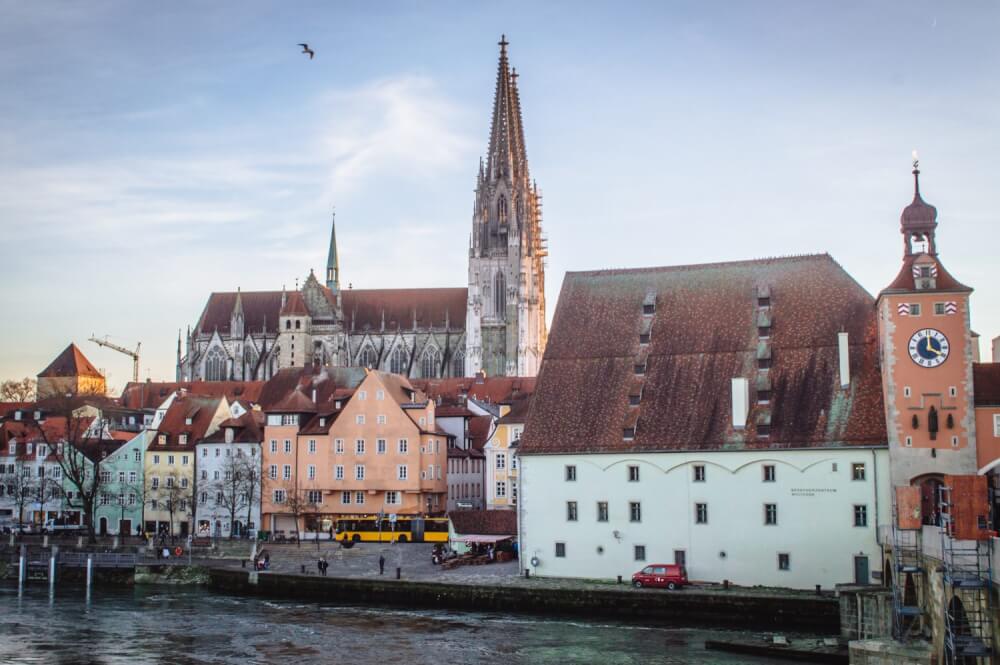
7. You might see some naked people
Ironically, for people who hate small talk and being loud on public transit, Germans are weirdly down with being nude.
Like, you wanna go to the park in the summer time? You will likely see a naked human being.
I mean maybe this is an odd Bavarian thing, but I learned it the hard way.
Once upon a time, I tried to have a peaceful picnic by the river in Munich’s English Garden (one of the world’s largest city parks). Eating my pretzel was difficult as an elderly man ran naked, wild and free across the river from me, periodically bathing himself and flaunting his body like he was Ryan Gosling on steroids.
Anyway, nudity can be common – just prepare yourself.
PS: In many saunas, wellness spas, etc., nudity is not only expected, but mandatory. This is another lesson I learned the hard way. *cringe*
8. When you travel in Germany, look for group discounts on travel/train tickets
If you decide to travel Germany by train, make sure you take advantage of all the amazing discounts!
Germans LOVE rewarding you for having friends, so group tickets will often save you ludicrous amounts of money.
As an example, in Munich a one-way bus ticket is 2.80, whereas a 3 day group ticket for unlimited travel for up to 5 people is less than 30! That’s only 6 euros a person, for 3 days of unlimited joy rides. It’s insane.
Likewise, look into special regional tickets for trains which get cheaper the more friends you bring. In Bavaria, we call this a “Bayern ticket”, but I know other states have them too. For us, you pay 25 euros for the first person, then 7 euros additional for every extra human you get on there, which means huge savings if you get up to 5 (the maximum) on the same ticket. It’s also valid for unlimited train travel within that region, which means Godzilla-sized savings. For more info, you can click here for my full Bayern ticket guide.
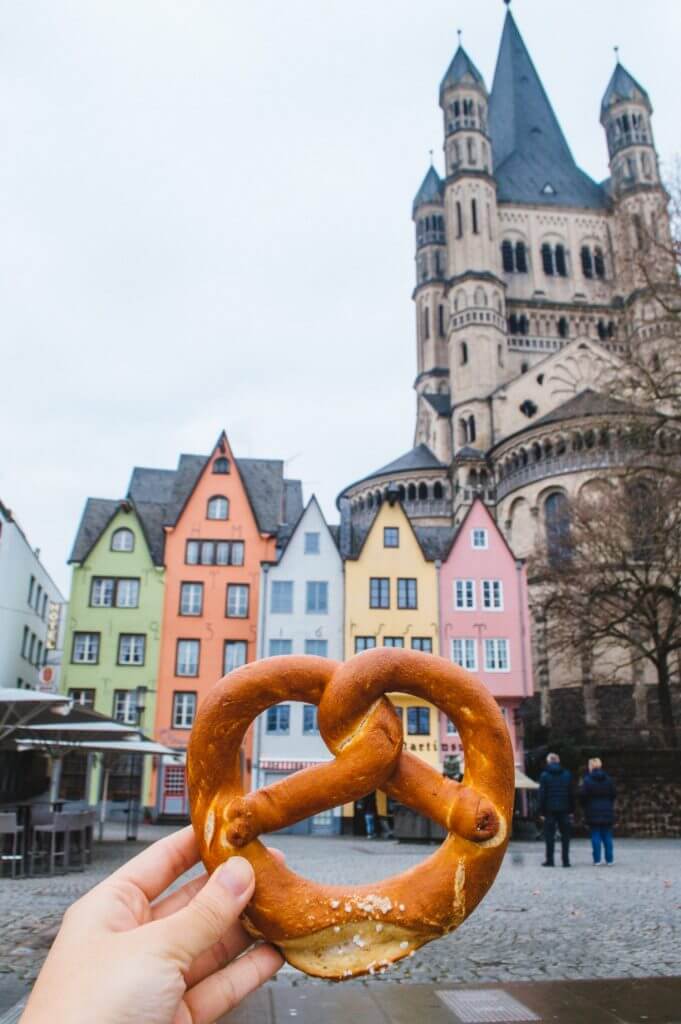
9. Water will cost you, and it’ll probably be fizzy
One of the biggest shocks for North Americans who travel to Germany is that in restaurants, a) water isn’t free and b) fizzy, carbonated water is usually what you get by default.
This thrills me because I would literally carbonate everything if I could, but I know a lot of folks hate fizzy water (ugh, weirdos ).
So, be sure to clarify whether you want still or sparkling. Sadly, there’s not much you can do about paying for it though (unless you have your own sneaky bottle of water with you).
PS: Buying bottled water at the shop will become the most confusing thing in the world (and a significant source of anxiety).
Every brand has their own colour code/name for which water has gas or not.
Some consider “natural” to be with gas, some without, some use blue for fizzy water, others use green…. They even categorize by how fizzy it is (e.g. Medium), and I just about lost it when once, I saw a teal bottle that said “EXTRA STILL” on it. What even is extra still water? How could still water possibly get any still-er? Turns out, it’s a cryptic German code for mildly fizzy water. Nothing is safe, folks. Enjoy your Russian roulette of hydration. [Sorry for the rant, I am just weirdly passionate about this topic]
10. Most people speak English, except (weirdly) where it counts
I always joke with friends that I could stop anyone on the street here in Germany and they would probably speak fluent English, yet as soon as I step into any bureaucratic environment (e.g. to get my visa sorted, to open a bank account, etc.), I’m left flailing in broken German.
Fair enough though – after all, remember that you’re in a foreign country so you shouldn’t expect people to automatically speak your language. That’s why it’s helpful to brush up on some basic German phrases, although you shouldn’t worry too much because there usually at least some fluent English speakers lurking around, especially in big cities like Munich and Berlin.
Craving more fuel for your wanderlust? Connect with me on Instagram for real-time updates, photos and stories!
11. Avoid the bike lane or risk certain death
Biking culture is pretty big here, especially in Munich where I live. Trust me when I say that you have not gotten a real taste of travel in Germany until you’ve stared death in the face while accidentally prancing down a bike lane.
There’s not often a clear division between the path for bikes/for people, and they tend to exist side by side to really shake things up and get you that sweet adrenaline rush. Here’s your best survival tip: check whether or not you’re in the bike lane!
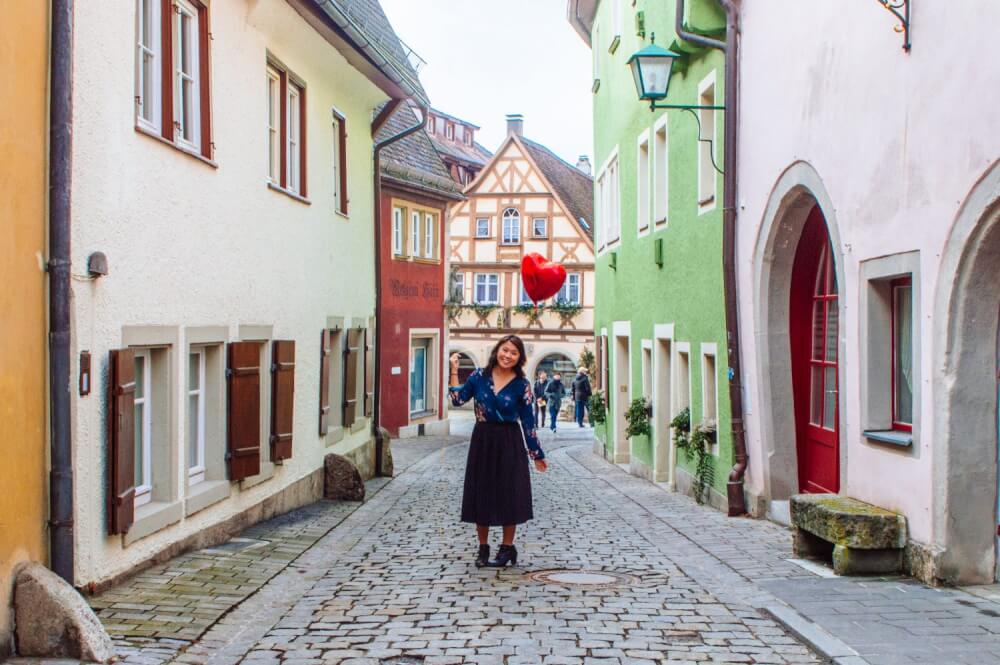
12. Oh yeah, jaywalking is worse than murder
So sure, maybe I’m exaggerating but I have literally never met a group of humans so collectively and vocally against jaywalking.
I once saw a guy in the suburbs who still waited dutifully for the light to change before crossing, despite not a single car or witness in sight (besides me, always a’lurkin).
Especially when there are kids around, parents get super angry at you for setting a bad example (which is fair enough), so it’s better safe than sorry.
There are few things more terrifying than being yelled at by an old German woman from across the street. Well, apart from trying to select the right water at the grocery store that is. Sorry – still not over it.
13. Travelling to Germany is a lot of Pfand
This is a very lame pun that won’t make sense unless you speak German, but Germans are really into recycling and the term “Pfand” essentially refers to a refundable deposit that you pay on things like cans, bottles and even glasses/mugs at beer gardens and Christmas markets.
It functions as an incentive for you to return those items to get your money back. So, in the case of cans/bottles, it encourages recycling and in the case of glasses/mugs, it prevents you from pocketing them as fun souvenirs (though many still do).
This is a really important word to know, because often items will be more expensive than the listed price at the store because of the pfand. So that 1 euro can of Coke might become 1.25 at checkout. Similarly, let’s say you’re at a German Christmas Market for the first time and want to get yourself a nice mulled wine for 3 euros. You might end up paying 5 euros at first, because of the 2 euro pfand on the mug. Extra picky places will even give you a token to return alongside your glassware to get your refund back.
Soooo remember: if your cashier slides you a plastic coin at the beer garden, it’s not some kind of sketch business dealing, it’s just something you must return to get your moola back.
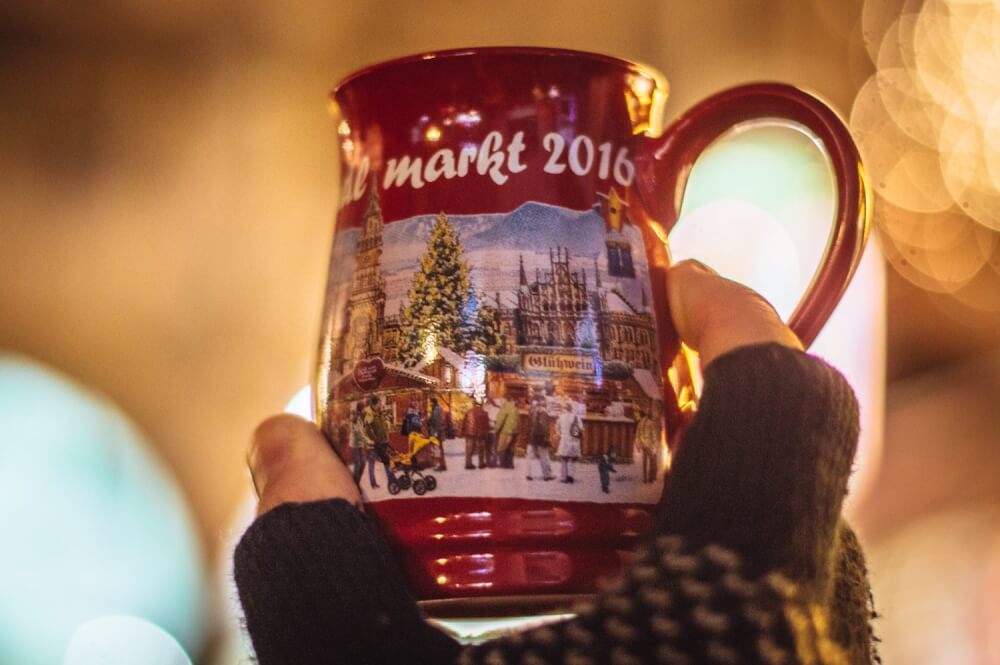
14. Small talk and pleasantries are not a thing
As a Canadian, it’s in my DNA to fill any voids of silence with meaningless chit chat. “It’s a windy day out, eh?” I’ll often murmur, yearning for that sweet human connection as I do.
Germans hate this.
Germans literally do not understand the point of small talk. Often, if you try it, they will be confused at why you are wasting their time and getting all up in their personal space. On that note…
15. Expect customer service to be frostier than a snowman on skis
There are of course exceptions to this, but generally speaking, customer service is not very friendly or warm in Germany. This goes for restaurants, retail shops and yes, official places like banks.
But hey, if you play your cards right and smile sweetly, you might get a vague acknowledgement of your presence in return 😉
Yay, little wins.
So, the next time your waiter ghosts you and doesn’t return for like, 10 years, don’t take it personally – it’s not you!
On that note, tipping is still expected – but not to the crazy extent that we take it to in North America. Generally, rounding up is enough.
16. Good luck at the Grocery Store AKA the freaking Olympic Games
Never in my life did I think I’d need to do warm-up exercises before visiting the grocery store.
… Then I moved to Germany.
I swear the cashiers in Germany are all training for the Olympic Games.
They scan items so absurdly quickly that it’s like a duel every single time. Like, dude – I just wanted some bananas, why are you rushing like your wife has gone into labour?
So, be prepared if you choose to visit the grocery store (which you should, because it helps you save loads of money!!).
Another important thing is to bring your own bag – most people do. There are bags you can buy at the checkout, but remember to pick one up and put it at the front of your item haul, otherwise you’ll be left with a million items from the Usain Bolt of groceries and nowhere to put them.
17. Be ready to giggle at fun words like “fahrt”
German is a different language than English. Duh, yes, hi – Captain Obvious reporting for duty.
BUT, there are some German words that sound just like words we have in English, usually with very different meanings.
Fahrt is one such word.
To complicate matters, it is SO common. You will literally see it everywhere – road signs, transit hubs, everywhere . And while I wish the Germans were simply big fans of flatulence, the truth is the word “fahrt” means a lot of things like trip, drive, way, outing, etc. Feel free to giggle about it though – you’re an adult who can do whatever you want.
Full disclosure: even after 2 years here, I still giggle when the little ticket machine tells me “Gute Fahrt!” after I’ve purchased a ticket. They really are trying to say “Have a good trip!”
PS: “Rathaus” (aka Rat House) means town hall and “schmuck” is actually jewellery. Heh. German is such a fun language.
A post shared by Christina 🇨🇦 happytowander.com (@happytowander) on Oct 17, 2017 at 10:09am PDT
I hope you enjoyed this roundup of must-knows for those who plan to travel in Germany! As always, if you have any more travel in Germany tips, let me know in the comments!
My Go-To Travel Favourites:
🧳 Eagle Creek: My favourite packing cubes
💳 Wise: For FREE travel friendly credit cards
🍯 Airalo: My go-to eSIM
🏨 Booking.com: For searching hotels
📷 Sony A7IV: My (amazing) camera
✈️ Google Flights : For finding flight deals
🌎 WorldNomads: For travel insurance
🎉 GetYourGuide: For booking activities
88 thoughts on “17 Hilariously True Must-Knows Before You Travel to Germany”
You crack me up Christina!!! I actually met a German trauma surgeon working here I. Seattle for a year and I am laughing out loud cuz I witnesssed some of these very things ha! ( no not the nudity )
I am actually thinking of going there to teach .. I am 3/4 German but have so many questions lol … maybe sometime I can email you and ask ?
Thx for sharing this ! Xo Valerie
Sure! I’d be happy to answer any questions you have, but I don’t have a load of experience with regular work visas (I’ve been here on student and youth mobility visas). Happy to chat about the experience of moving here though! And hehe so glad you liked the article!
I loved when shops were closed on a Sunday, they used to be like that in the Netherlands too until a few years ago. I see many similarities to the Netherlands really, great read.
It’s not so bad once you learn how to plan around it, and I totally get why it’s a thing, but I do miss the convenience of shops being open almost all the time hehe. I bet the Netherlands are super similar! Really happy you enjoyed the read 😀 Thanks for stopping by!
Haha, as a European I relate to many things, but I do think it’s funny 🙂 no. 16 is sooo true, but super weird i know 😀
Hahah so glad you could relate 😉 thanks for reading!
I love Germany SO much and loved this post! You captured so many of the great German idiosyncrasies. One other thing my husband and I can’t get enough of in Germany is how everyone always has to get the last word – or “Chuss!” in when we leave a store or a restaurant. If we say “Chuss” back they’ll end it with an “Abend!” It could go on forever! Love it 🙂
Oh my goodness you are SO write! I never realized that. I’m gonna be on a quest to always get the last word now hahah. Thanks for reading!
One of the few blogs that actually makes me laugh out loud! I really love your writing! (Yay you!! :-D) Great blog post and defo a few things I’ll keep in mind when I visit Germany.
oh my gosh you are too sweet! Thank you for appreciating my lame jokes hahah. You rock!
I have been to Germany once. Your tips just added to my knowledge. You’re a good writer, and if you lived my next door I would love to have you over for coffee. PS don’t get nervous your likely the age of my kids. GOOd JOB
Couldn’t agree more with everything! I live in Germany, in fact even Regensburg and I was surprised to see a picture of my beautiful adopted home town!
I LOOVE Regensburg! Naturally I needed a way to fit a photo in hehe. So happy you relate to this! Thanks for reading 🙂
I am a Canadian living in Germany for four years. Been here for two and a half – and agree with every single thing you said! Loved the article!
Hahaha hello from a fellow Canadian living in Germany!!! <3 Thanks for reading and laughing along.
This was very interesting, I had no idea about many of these, except for the naked people thing… I have a friend, he`s German and he loves being naked (he took his clothes off at a wedding party!!!) I had to send him this article… Like “Ahhhh, now I get why you do it!”
Hahaha that’s too funny, and I kinda want to know the story behind that wedding nudity….. 😉 but yes, I find that Europeans as a whole just find nudity a lot less taboo than we do in North America. It’s kinda nice actually – after the initial shock wears off!
I’m a German who’s living in Lima, Peru. When visiting Germany, I simply don’t have the patience anymore to wait for the green light, I’m too used to crossing the street when it’s somehow possible. On the other hand, I still remember my first grocery shopping in Lima. Oh great, just two people in front of me. Well, it would have been faster in Germany with 20 people in front of me ;-). As far as water is concerned, just drink tap water, cheaper and good quality. Punctuality is my most German habit and constantly giving me trouble in South America. I mean, I warn people beforehand that I am punctual and if I’m lucky, they’re just 10 minutes late :-).
Hahaha it’s so cool to hear your perspective! It must be so interesting bouncing between such different cultures. I had a Spanish friend I went to school with here in Munich and his lack of punctuality really drove our instructors insane lol.
I found this post so informative and helpful.
thanks for reading!!
Hahaha! I was laughing all along! The water bit, the jaywalking… it was all just spot on! Amazing article!
hahah yesssss! so happy you liked it 🙂 thanks for reading!
I’m glad Germany takes cash instead, haha, since I like to carry cash with me when I travel! When I went to London I felt like a dinosaur being the only one not paying with a debit card lol! 😛 – Charmaine Ng | Architecture & Lifestyle Blog https://charmainenyw.com
Sometimes I prefer cash too – helps me keep track of my spending haha
I think the naked thing is just much a stereotype as Lederhosen but I guess it does stick out to people that it is legal to go topless to the beach and that we do have coed saunas where everyone is naked. I remember it used to freak my American friends out.
I will send your post to the Deutsche Bahn because when it comes to punctuality they definitely have to catch up (pun fully intended).
Interesting about the stares – I never notices this as compared to countries like India. But as I said on FB I think it might also be a north south divide 🙂
Yeah it’s exactly those things! In North America we can be very prudish when it comes to nudity (being topless at the beach/naked saunas are definitely not a thing), so even those pretty “normal” things stand out to us a lot. And also re: the staring, it could very well be too that you blend in seamlessly whereas we expats/tourists have our ways of sticking out (being loud, speaking English, etc.) Just yesterday, my backpack accidentally grazed the tram ticket machine, which made a tiny sound and then this angry man looked up from his book and stared me down for a solid 5 seconds. It was awkward hahah
Hahahaha – this is so true!! The water thing – not being able to get tap water ANYWHERE drove me up the wall. And one of my colleagues (English) got done by the police for jay walking – now we just check for police before doing it! Oh and I ran into a nude man in my hotel… in the hallway…. gotta love the Germans
No way! I’ve never witnessed anyone actually getting ticketed for jay walking. I bet it wasn’t cheap either! I’ll definitely be more careful now. And LOL I feel like I need more context behind this nude encounter…….
Nicely done! I enjoy your witty writing and especially love the pictures.
Aw thanks so much, Mary!
So I learned some things about myself today. 1. As much as I hate the cold, I will definitely be visiting Germany in the winter so as to avoid the frolicking old naked men. 2. That Christmas mug is adorable and I will definitely steal it.
PS- your photography is so ridiculously gorgeous.
Hahahaa to be fair, it’s not like they’re *everywhere*. You’ll be more likely to see topless women around the parks than wrinkly old men. Maybe I just got lucky 😉 Also YES all the markets have different mugs too and it’s just the best thing. I highly recommend a separate suitcase just for them haha
You made me laugh so hard, Christina! I love this! I lived in Germany for 2 years and I can testify, everything is true!! I love this post.
Your comment makes me so happy!!! Thanks for reading, girl <3
I‘m German. I visited 18 differnt countries for job reasons, from US to Japan. And yes, you are totally right. It really tooks a smile on my face reading your 17 tips. They are so true. Brilliant. We are really a funny kind of peoples here. But wait, someone can easily write 17 funny facts for visiting the US
I would LOVE if somebody wrote that post. Even as a Canadian, there are certain funny things about the US I could write about haha
This is a fun idea for a post. I live in Germany, and what you listed is normal to me by now (still getting used to the staring, though). But I might try one about my passport country, or rather the Midwest. Something to ponder over the holidays… I only recently stumbled across your blog, and I’ll be back to read more.
Aw Beth – thanks so much! really glad you enjoyed it 🙂 One about the Midwest would be great! Let me know if you end up writing it!
Being of German descent and having visited Germany before this article rings so true and made me laugh out loud. I am taking my partner to Germany next year and this article is perfect for him as he is like the quintessential opposite of a German. One point made me want to share a story with you…. My friend and I weren’t aware of the jaywalking law and crossed on the red Ampel Man on a Sunday afternoon in Berlin, there was literally no one around and next thing we know we hear the revs and then screech of a police car mounting the kerb within a foot of our (now soiled) pants! The officer got out screaming at us, all the German I knew flew out the window. Let’s just say he thought it Germanly amusing when we finally muttered “Australien”! I still laugh about this to this day.
Hahaha wow – what a story! Thanks for sharing, Lear <3
I legit laughed out loud! Your righting is fan-freakin-tastic. I am an American who grew up around German culture here and have visited Germany many times so I can totally relate! I did not know about #8 – good to know! And #17… omg driving and you the AUSFARHT signs… I die every time! Thanks so much for sharing. Can’t wait to spend the rest of my day procrastinating real work and reading your blog!
Hey, I’m german and yes, you are so damn right about all those things! Really made me laugh! About speaking english in public offices (town hall, Bürgerbüro…) : Most of these guys there speak english, but they are not allowed to by law…
So glad you enjoyed it, Andrea! That’s really interesting – I had no idea there was a legal reason behind it. I’d love to learn more about why! Do you have a link or anything about the law in question?
I’m an American who’s been living in Munich for 5.5 years and I can say these are ALL true….hilarious. I’d also add to the supermarket olympics section to mind your spot in line so no one cuts in front of you!
Hahaha that’s a good one… some of those omas can be ruthless in getting ahead! Thanks for reading – so happy you liked it!
Great Article. I’m sure my husband will fail at #14 as he talks to everyone when we travel about anything! As for me, I’m just plain loud, so #6 is going to get me lots of stares, LOL As my husband is half German, your list also provided me with insight to his personality, ie #1 he likes paying cash for everything, #4 he has never been late a minute in his life, #7 he loves being naked (but what guy doesn’t). As for #2 we are in trouble…..he pees as if he were in his last month of pregnancy! LOVE your humor….and the article.
Hillarious read, quite entertaining. I loved it. Filled with useful information. I plan to visit Germany in the near future, I’ve been doing research and found your site. Gracias!
Thanks so much for the kind words, Ana! Glad you enjoyed it <3 <3 I hope you have an amazing time in Germany!
Always carry change! My 2 sister in laws and myself were chased out of a bathroom by “Broomhilde” the bathroom attendant. We figured out we only had 1 coin and all needed to pee . We didn’t let the door close and when she realized what we were up to chased us down the street shaking her fist and lecturing. It’s still our best story after 21 years!
I have a great jaywalking-story, as well. When I once crossed the street 3 seconds too early (the traffic lights for cars already switched to red), a police officer drove up to the christmas market I was heading to, jumped out of his car yelling and asked me if I planned to give my parents a dead daughter for christmas – then I had to pay 5 Euros. Haha he was crazy! However, here in NRW, the western part of Germany, people are generally much more friendly open-minded than in e.g. Bavaria!
What a fun read! I am a German, living in Texas with my family for 8 years. My 14 y old daughter often tells me “Don’t stare at the people!” while I am not aware of starring. I am just curious and interested … is that starring? The punctuality is really a thing. People who let us wait are rude because they are wasting our precious time (keeping us from being efficient). When we had our first big party here (Oktoberfest – what else – and I had cooked authentic food from scratch for three days) nobody showed up at the given time. We were totally irritated, double checking the (written!) invitations for time and date, calling some guests if they thought it would be in Oktober (since Oktoberfest is always in September!) etc. . The first guests showed up about 40 minutes late, some came more than an hour late and the most shocking thing: Some left after an hour, telling us that they also have to go to another party … this is like a total no-go in Germany. Well, we learned and adapted … to a certain point. But we are still always on time!
The credit card thing explained: The bank in Germany takes a high fee for credit card transactions. If you buy something for a small amount, it often would cost the store owner more to pay for the transaction than the item you bought. Germans have some sort of debit card which usually comes at a lower fee for the shop owner. But cash is still highly appreciated.
All 100% true, and not only for Munich. I grew up in the North of Germany and it is the same story. Then of course this stuff was normal for me until I moved abroad 😀 hilariously written!
Are the Christmas markets also closed on Sundays? Thank you!
Nope! Of course it depends on the actual market, but most will be open and very, very crowded haha 🙂
Hi Christina You just made my day I read your post and I as laughing sooo many times loud out . I am from Germany live now in the US ( east coast ) since 20+ years and same as you I LOVE TO TRAVEL and see the world. Mostly Asia You are mostly SO RIGHT in your description about Germany.Lucky me I am not from Bavaria but from the NORTH but most of your tips is true for all of Germany Again LOVE LOVE LOVE YOUR POST
Some are really hilarious .Nice Tips for travelers who are planing for germany trip.
Hi Christina, Germany is one of my favourite countries to visit and for many of the reasons above, especially the silence on public transport. And yes, the towns are pretty. My blogging never does them enough justice!
Hillarious read, enjoyed it. Was planning to visit Germany, found your site during my research, learnt quite a lot. Cheers!
Hallo Christina,
I love your post. I am German (from Oldenburg in Loxer Saxony) and have been looking for something exactly like this as I’ll be welcoming a Texan friend in summer time. How cool. I didn’t wanna bore her with my “preparation list” (I wouldn’t even have known how to start it!) and then I found your blog. How cool. Thanks for your brillant descriptions of literally everything a foreigner needs to know about Germany and Germans. 🙂
We Germans are so weird but of course pretty friendly and funny, too. 😉
Have a great time and be safe.
Susanne :-).
thanks for the information
Just moved to Bavaria from the states – reading up on some tips after being here nearly a month. This is super helpful but mostly a hilarious read! I loved reading your take on things! Well written. Thanks for the tips for my German adventures!
I love Germany and have travelled there three times and hopefully will visit again. I feel that the whole Ampelmann thing is peculiar as an American, but also, charming. I saw stores with Ampelmann merchandise in Berlin and in Munich. I also scratch my head over getting assorted wursts…in the U.S., long rolls are used to accommodate the shape… but I’ve only seen round rolls used, especially what we here call Kaiser rolls.
Bravo for the wonderful write up Christina. very helpful. anyone looking for further information about Germany or needs travel documents to Germany can contact this email [email protected]
Christina, my son was stationed in Germany and loved it. He’s been back home in USA for some time longing to go back. He just got notice he has job in Germany and will be moving there with his family soon. My sister and I will go visit him and travel around Europe for first and probably last time (we are 70 +) and your tips are great! I live in Louisiana and it is a very funny state.
ha ha, loved this. So much of it I remember from my German holidays
Love your article! I met my German husband in Austria, and have had 39 happy years! Our grandchildren call us Oma and Opa. You nailed it with the punctuality for sure! Germany is a wonderful country with friendly people. Love Munich, Rothenburg, Berchtesgaden, ….. Enjoy your stay!
Germany is a beautiful country with a Rich cultural heritage and the people here are honest and straight forward, thanks for sharing the travel tips which are of great help to travellers and save them from getting into awkward situations. October is the best time to visit Germany as Oktoberfest the best folk festival is held in this month.
Hi Christina, My husband and I are planning a trip to Munich, then Vienna, Italy and Switzerland in September 2020. I came across your article on “17 Hilariously True Must-Knows Before You Travel to Germany”…loved it. I would also enjoy advise on what to wear on our trip. We’re from Florida, where shorts and t-shirts are the norm. Thank you.
Your Travel Blog is really nice. I love german and culture. maybe I will do to visit one day. I would like to do a marathon run if someone invites me.
I don’t ever comment on blogs but I have quite a bit of experience in Germany and Munich is one of my favorites. Your post made me laugh out loud a couple times. I’m forwarding the link to my husband so he can enjoy it too. Thanks!
I agree with whatever you have mentioned here. I am here in germany for study and I have to change a lot of habits that is mentioned above. Speak in small voice, urinating, puncuality, taking care of cycle lane. Even some older people scold you, this is the most wierd thing. I thing the yonger genration is much better the older are sucking. But you will find good old people who speaks in english and help you. You cracked all the things i n your article. Thanks.
Next year I plan to visit Germany. This will be my first trip. Thanks for the exchange and your advices.
I love these tips! There is just so much to see in Germany! I went last year during the holidays and am dying to go back. There are too many cute towns to see!
Thanks for travelling tips to visit Germany. I will be visiting their very soon and I will probably use your tips and travel recommendation. Much grateful for the information though.
You made me laugh so much! Ah these are so true. Thank you for writing about them in such a hilarious way. It’s been four years since I moved home from Germany and escaped a few of these – and have missed some others. 🙂
Aw thanks for reading and for the kind words, Ava!! Hope you can make it back to Germany again sometime soon to visit haha 🙂
I LOVED this article! I have been living in Munich for about 18 months and all of these were spot on! I definitely laughed out loud when I read the one about the grocery stores. I still get soo stressed trying to bag my stuff! You just never get used to it!
Hey Christina, this very good written! I am actually german and do also live in Munich. I find it very interesting to see the german way of living from another perspektive from time to time 😛 Anyhow i wanted to add something about the jaywalking…(i think that is walking across the street with a red traffic light?) If you are unlucky and the police sees you while doing that it can be very expensive. I got caught once running over the strees a few seconds after the light changed and i had to pay 80€ So i do highly recommend to cross the street far far away from a traffic light (ofc after you made sure that there are no cars that could run you over) or just wait until the light turns green, because sometimes policemen also wait in plain clothes behind the traficlight for someone to cross it while its red… And there is someting else that i wamted to add to your list. I think that almost every household in Germany is a shoes off household. So if you get invited to someones house or appartement, take your shoes off or ask if you should/can leave them on. This could keep you from leaving a rude expression 🙂
Hi Lisa, thanks so much for reading and thanks for sharing your experiences/extra tips! I grew up in a shoes-off household too so it never crossed my mind that this was a cultural difference haha. Definitely a good tip for those who aren’t used to it!
The part about Still water killed me , i literally LOL! every time im in europe i break my head trying to find still water..
Doing research for my book where they visit Germany and this article was so HILARIOUS and helpful, thank you so much for taking the time to make it! <333
A very informative article about the German travel.I really appreciate your research. Thanks for sharing. Hope to read more articles on your blog…!!! Keep it up.
Christina I was laughing the entire time I read your blog thank you for the laughs and information I’m sure I’ll have a great time in Germany!
I AM a German living in Canada since a couple of years now. And what should I say: You are perfectly right with your accurate analysis. I laughed my ass of reading your blog. Thank you.
Great post, I want to thank You for sharing this as it contains a lot of details and it has been very useful.
It is great to know about places, I find such blogs which tell about a country like living, food, places to visit. Like I found a lot in this blog and I enjoyed reading it. I hope you will share such good blogs.
Thank you for sharing your valuable insights and tips on traveling in Germany. Your article is well-written, informative, and packed with useful information that will undoubtedly help anyone planning to visit Germany.
I appreciate the practical tips you’ve provided on topics such as transportation, accommodation, food, and culture. Your personal experiences and anecdotes add a relatable and authentic touch to the article, and I found your advice on interacting with locals and adapting to the local culture particularly helpful.
Your suggestions for off-the-beaten-path destinations and hidden gems in Germany were also a great addition to the article, and I appreciated the detailed descriptions and recommendations for each place.
Leave a Comment Cancel reply
By using this form you agree with the storage and handling of your data by this website. *
- Lifestyle and Cuisine
A Guide to German Etiquette
Nothing’s as easy as sticking your foot in it when you’re abroad. But don’t worry. Here the do's and don’ts.

Shaking hands
Germans are great hand-shakers, and they like to do so both when arriving and when departing. It is common for a person who is joining a group to shake hands with every single individual.
Beer and wine are part of a normal dinner and alcoholic drinks are usually offered to guests. Not drinking, however, is completely accepted. Do not insist on alcoholic drinks if a person has rejected your initial offer and don’t order them for them. A German who rejects a drink is not just being shy or polite but does not want to drink. For some cultures it is uncommon to see teenagers order a beer at restaurants and pubs. Remember that the legal drinking age in Germany is 16 for beer and wine and 18 for spirits.
Punctuality
Don’t turn up late for an appointment or when meeting people. Germans are extremely punctual, and even a few minutes’ delay can offend. Be five to 10 minutes early for important appointments and be sure to call the people you are meeting if you really cannot make it in time.
In private, the older person suggests using the informal "du" to the younger person. In the business world, the higher ranking person–regardless of age and sex–would always be the one to suggest switching to "du." A nice intermediate step is to address a person by their first name but then use the formal "Sie." Always ask, however, before you decide to take this step. If you’re not on a first-name basis in German, you can still switch when speaking English. But don’t forget to switch back.
Bring flowers if you’re invited to a German home for some social occasion. If the flowers are wrapped in paper, remember to take off the wrapping just before you enter the home.
Germans are extremely environmentally conscious and separate their garbage to facilitate recycling. If your neighbors spot you throwing recyclable glass or paper into the regular garbage, your relationship could be strained for good.
When close friends greet each other, it is common to kiss both the left and right cheeks. However, this is considered inappropriate in a business setting.
Silverware language
Crossing the knife and fork on your plate is an indication that you are not yet finished with your meal. Placing knife and fork on the right side of the plate in parallel is a signal to the waiter that you have finished and that the plate can be cleared away.
It is polite to address everyone by their family name and "Sie." Do not leave off double-barreled names, such as Frau Müller-Weber. Names are inserted into conversation after every few sentences.
Forget this outdated form of addressing young women. These days, rather than being seen as polite, it can be offensive. Just use the normal "Frau Müller."
In Germany, you might be confronted with a much more tolerant, open attitude to public nudity than might be the case in your home country. Saunas, a minority of swimming pools and even some public parks on sunny days are considered to be "textile free," at least at particular times. Getting together completely naked in a sauna, however, has no sexual dimension to it whatsoever. But if you feel you would be uncomfortable, it may be a good idea to ask first before you join a trip to the pool. This attitude spills over to television, where the programs and even the commercials can feature more nudity than is the case in most countries.
When customers enter shops, especially smaller outlets, they greet everyone in the shop. The same is true of doctors’ waiting rooms. So practice saying "Guten Tag" and "Auf Wiedersehen."
Seating in restaurants
It is common to share tables with perfect strangers when restaurants are full and very busy. Before you do so, however, always point to the free seat and ask, "Ist dieser Platz noch frei?" (Is this seat occupied?). Also, wish the other diners at the table "Guten Appetit." But don’t expect any further conversation at the table. It may be very welcome, but you shouldn’t force it. When you leave, be sure to bid farewell to your table companions.
It’s common to clink glasses with a "Prost" ("cheers") or "Zum Wohl" ("good health") before drinking. At official dinners, it is more common to lift the glass by the stem and nod meaningfully to the others. The host should lead the toast. At a dinner party or in a restaurant, you should not start eating or drinking until everyone in the group has received their drink or their meal, and then follow the lead of the host.
© www.deutschland.de
You would like to receive regular information about Germany? Subscribe here:
- Newsletter #UpdateGermany
Related content

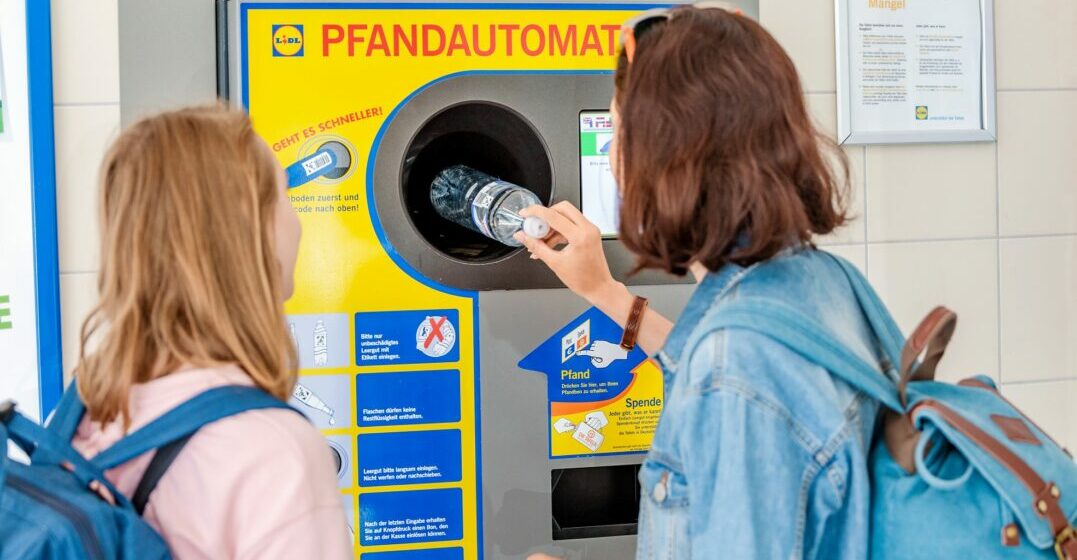
10 do’s and don’ts in Germany
by Sandra Köktas
Published on August 12, 2022 / Updated on February 8, 2024
New to Germany? Depending on where you come from, the cultural differences will be obvious. For others, everything may seem familiar. Still, each culture has its own etiquette, and Germany is no exception. We put together ten do’s and don’ts in Germany to help you settle in smoothly and avoid a major faux pas. Germans love their rules and they have many. Even throwing away your trash can get you into trouble. But no need to worry. While we cannot help you sort your rubbish, we will give you all the information to blend into everyday situations and steer clear of controversial issues. So here are cultural do’s and don’ts in Germany that will safely guide you through ten social situations.
- Conversations
- Eating together
- Appointments
- Nudist culture in Germany
Learn languages at your pace
1. greetings.
Whether you meet the neighbors on the stairs, enter a shop or come into the doctor’s waiting room: a friendly greeting is always in order. Say Guten Morgen (good morning) until about 10 am, use Guten Tag (good day from there) and switch to Guten Abend (good evening) after sunset. It doesn’t matter if you’ve never seen these people before and you don’t have to follow through with a conversation. Even a simple “Wie geht’s?” is reserved for people you personally know. Just remember to say Auf Wiedersehen or Tschüss ( Goodbye ) when you leave. When you meet with colleagues or clients at work or when introduced to a group of new friends, shake hands and make eye contact. Only close friends would greet you with a hug and/or kisses on the cheeks.
2. Conversations
During conversations , the most important thing to remember is the difference between the formal and the informal you. The informal Du is reserved for good friends, everyone else will expect to be addressed with Sie . Never assume Du will be ok, ask first. However, this is only the case if you are the older partner in this conversation. If you aren’t, you will have to wait for the other side to make the offer.
3. Eating together
Going for lunch or dinner with colleagues and friends is always an opportunity to socialize and practice German . Stick to a few cultural do’s and don’ts in Germany to make the most of it:
- Don’t start eating before everyone is seated and got their meal. Wait for someone to say Guten Appetit (enjoy your meal) or Mahlzeit or give the signal yourself.
- Beer and wine are usually served at lunch and dinner. You can of course decline and order soft drinks or water instead. If you drink, don’t overdo it. Remember to clink glasses before taking the first sip. Germans say you have to go through seven years of bad sex if you drink without looking each other in the eye, so don’t forget to make eye contact with everyone at the table!
- Always have your fork in your left and your knife in your right hand and no elbows on the table. When you have finished your meal, put your fork and knife next to each other on the plate or on the left and right of the plate.
4. Birthdays
Surprise parties are not very common in Germany. If you want to celebrate your birthday, you have to invite your friends. You will also have to provide the cake and prepare some food and drinks for your guests. In return, they will surprise you with a birthday present. Open it right away and say some nice words about it. As the birthday boy or girl, you would usually bring a cake to work or – even more important – send one to school on your kids’ birthday! There will usually be no gifts on these occasions. When invited to a birthday party yourself, bring a present and sing along to “Happy birthday”. You can also congratulate your friend with Alles Gute zum Geburtstag! But only on the day itself or after. Wishing someone a happy birthday before the actual day is believed to bring bad luck and is one of the few cultural taboos in Germany!
Germans take their privacy seriously. Be prepared for a culture shock in Germany if you come from a country that handles these things differently. Your German friends might come off as cold. They don’t like personal questions from strangers or even friends, depending on how personal it gets. They are also very selective in who they invite into their homes. If you are invited, you have probably made a friend. But even between friends, there are rules to be observed. Bring a gift to the host or the hostess. Flowers, chocolates or wine are fine. Some people prefer to take off their shoes at home, so it is best to ask where to put your shoes instead of walking right in. Ask if you can help with the preparations, but don’t just get busy in the kitchen.
If you need to use the bathroom, again ask and also let them tell you where to find it. Nothing worse than opening each door and looking into every room. You will find that most doors are closed. If you enter a room, be it at someone’s home or the office, knock first. You don’t have to wait for permission to enter, just give the people inside a little warning.
6. Appointments
Appointments are a big thing in Germany. Even friends like to know if or when you will visit them. And whatever you do, don’t be late! If you run late more than ten or fifteen minutes, call to explain. On the other hand, know when to leave. If you are invited for coffee and it gets late, say something like Es wird spät, ich sollte wirklich gehen (It’s getting late, I really should go). Dinner is family time. If your host wants you to stay, they will tell you.
Have we mentioned that Germans love rules? This is even more true when they are related to safety. Before hitting the road in Germany, know the traffic signs and opt for a defensive driving style to be on the safe side. Getting loud or cursing is never a good thing in Germany!
8. Recycling
Not only is recycling important for the environment. There are different bins for different materials, and there is a fee for waste disposal that depends on the weight. Throwing everything into one bin can lead to tense relations with your neighbors. If you don’t know how to separate your trash, just ask. Someone will be more than happy to help.
9. Nudist culture in Germany
It’s not like Germans run around naked everywhere all the time. But there is room for nudist culture in Germany. In most saunas, bathing suits are forbidden, and some beaches might be reserved for nude bathing. Like always in Germany, there will be signs to clarify the situation. Just follow the rules. And don’t stare!
Every country has difficult chapters in its history. WWII, nazism and the holocaust are sensitive topics. If you want to discuss this part of German history, stick to the facts and ask for opinions. Generalizations or jokes are taboo in Germany. Remember that the subject is also legally relevant. Expressions like Heil Hitler will rightfully get you in trouble with the police!
Avoid culture shock in Germany
Rules are always helpful to navigate unknown terrain. Luckily, there are many rules in Germany. The ten most important situations include opportunities to socialize from greetings to visits and particular topics like nudist culture or history. If you stick to these do’s and don’ts you will easily avoid awkward conversations and embarrassing situations.

Sandra Köktas
Sandra lives in Istanbul, together with her kids, cat and dog. As a historian she thrives exploring this ancient city with her two- and four-legged loved ones. Together, they also love to go on adventures through all of Turkey and its neighboring countries. The perfect opportunity to put all the language learning into practice. If she’s not on the road, Sandra is busy putting her experiences into writing as a freelance copywriter for the travel industry and everything related to language, culture and family. Her particular interest lies in providing information on animal welfare with her website contentrundumstier.de

May 06, 2024
How to talk about your hobbies in German
If you’re starting your adventure with the German language, diving into conversations about your hobbies can be a fantastic icebreaker....

Apr 23, 2024
How to rent an apartment in Germany
Finding the right apartment in Germany can seem daunting, especially for expats and international students unfamiliar with the local norms....

Apr 18, 2024
Say it right: How to compliment someone in German
A well-timed compliment can put a smile on someone’s face, but context matters — especially when you’re attempting to give...
Level up your language skills with Lingoda. Take our placement test for free and get started.


Germany Travel Guide
Looking for an in-depth Germany travel guide ?
Then you’re in the right place!
Planning your Germany travel itinerary but not sure where to start? We’ve got you covered!
There’s so much to see in this country of 83 million people.
From big cities to little Alpine villages, you’ll find that Germany is rich in culture, history, and natural splendors. In this Germany tourist guide, we’ll be sharing some of the best highlights with you.
If you’re wondering where to go in Germany, the cities are a great place to start. Destinations like Berlin, Munich, Hamburg, and Frankfurt all offer something different, from modern architecture and 24/7 nightclubs to historic churches and cobblestone streets.
Of course, some of the best places to go in Germany are the smaller cities and towns. Leipzig , for example, is just a short train ride from Berlin. Johann Sebastian Bach’s former home is full of history, classic German architecture, and art galleries.
The small towns in the Bavarian Alps also offer idyllic experiences and enough space to really see the stars at night. Again, if you’re wondering how to travel Germany, there’s no one way to do it!
The country’s modern transportation system and its central location make it easy to travel to Germany from other European destinations . The country is well-connected to its neighbors by rail and inexpensive flights from nearby countries are easy to find.
A Eurail Pass is also a great option for backpackers who want a little flexibility, particularly those who qualify for youth fares (ages 12-27). Keep all your options in mind as you plan a trip to Germany.
Keep reading to dive into resources that will help you with planning a trip to Germany in Western and Central Europe.
Note: This guide to Germany travel contains affiliate links to trusted partners!

Germany Map
Use this Germany travel map to begin planning your trip to this incredible country!
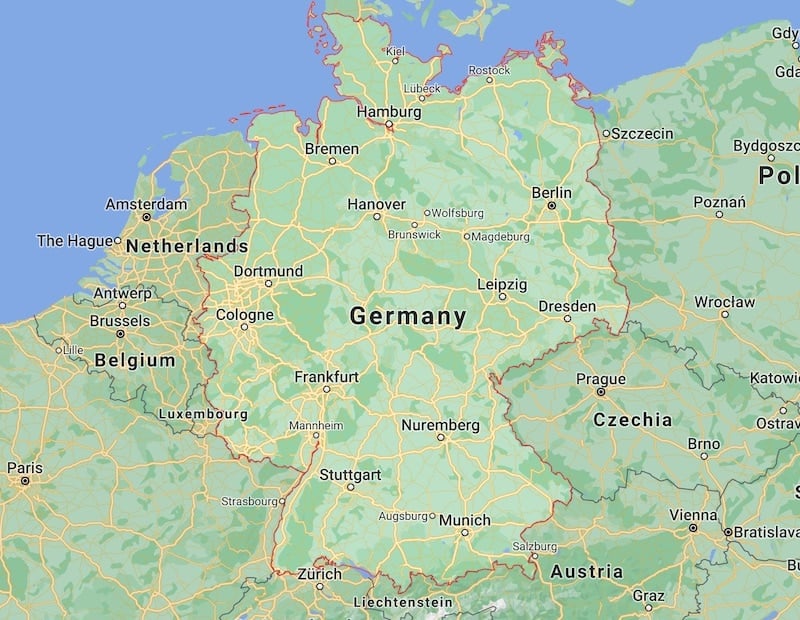
Click here for an interactive Google Map version of the above graphic.
Planning A Trip To Germany Itinerary Resources
If you’re looking for a helpful travel guide for Germany , check out:
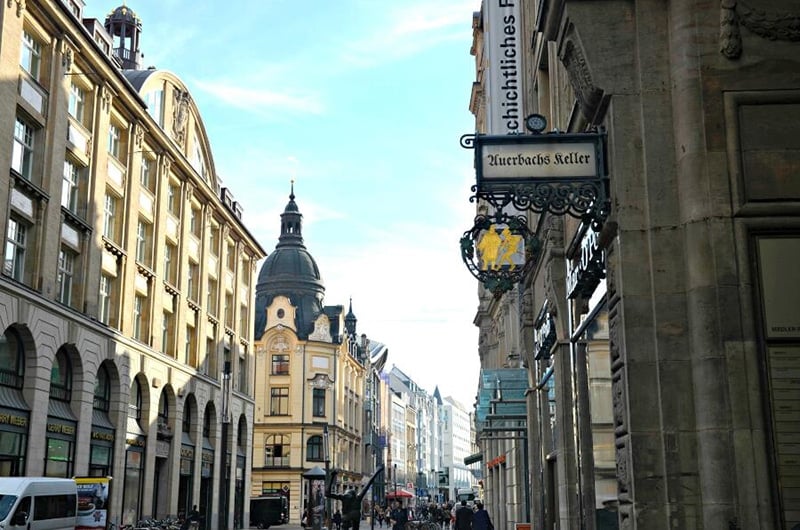
Leipzig: A Must-Have Day Trip From Berlin, Germany

Exploring Germany’s Berlin Wall History, 25 Years After The Fall
Best Things To Do In Germany
Wondering what to do in Germany ? The following guides can help! The experiences shared are highlights of any Europe travel itinerary !
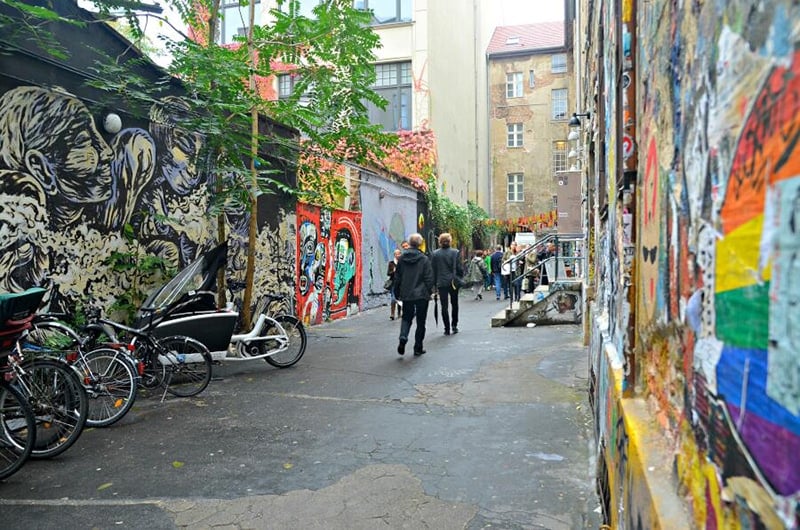
10 Amazing Offbeat Things To Do in Germany

How The Berlin Marathon Showed One Traveler That We’re All In This Race Of Life Together
Germany Travel Tips
This Germany travel advice can help you plan the perfect trip!

10 Reasons Why Germany Should Be Your Next Trip
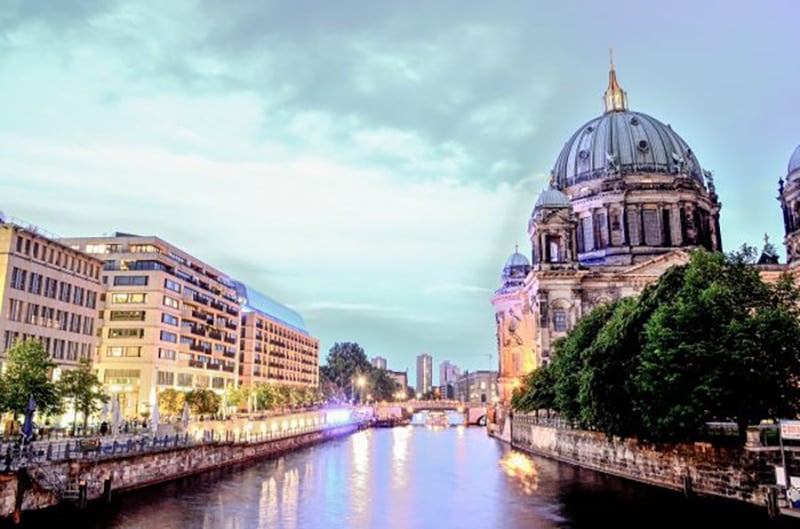
10 Tips for Traveling Berlin On A Budget
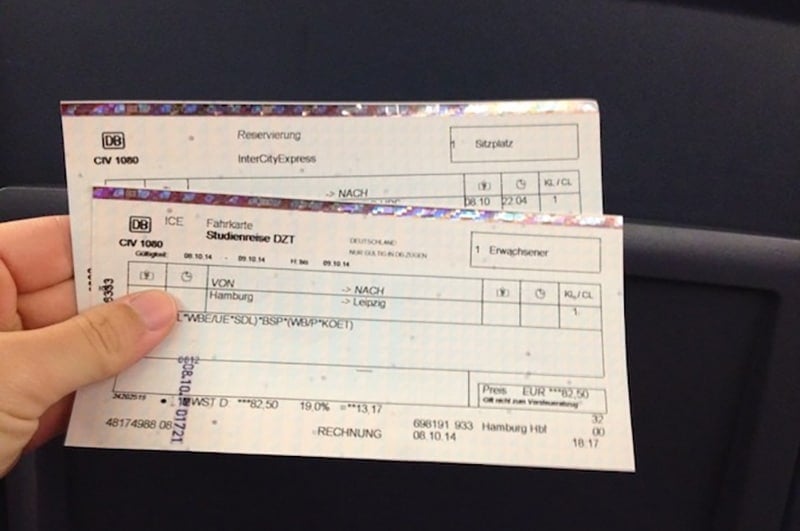
17 Essential Germany Transportation Tips For Travelers
Top Guided Tours In Germany
Explore local culture with a Germany tour guide through these unique excursions:
- Bavarian Schnitzel Cooking Class in Oberaudorf Farmhouse (Oberaudorf)
- Neuschwanstein Castle and Linderhof Palace Day Tour (from Munich)
- Cologne City Tour Experience cathedral city on the Rhine (Köln)
- Best of Bohemian and Saxon Switzerland Day Trip (from Dresden)
- Bavarian Beer and Food Evening Tour (Munich)
- 3-Hour Berlin Highlights Tour (Berlin)
Renting A Car In Germany
Need a rental car for your Germany trip?
Use Discover Cars to quickly compare your car rental options.
Germany Train Travel
Getting around Germany by train, bus, or ferry?
Omio is a must! I use this tool for all of my public transportation needs when traveling Europe.
The site is straightforward and user-friendly — and you can pre-book your tickets in advance at a discount.
They even offer flight and car deals!
Germany Hotels
Click here to browse hotels in Germany!
Prefer self-contained stays?
Click here to check out unique local apartments and rentals!
You can also use this map to search for local stays and experiences:
Germany Travel Insurance
It doesn’t matter if you’re traveling solo or with a group on a Germany tour. When visiting Germany — or any other country in the world — make sure to get travel insurance to protect your health and safety.
In my opinion, the best travel medical insurance for travelers is SafetyWing as they’ve got a large network and offer both short-term and long-term coverage — including coverage if you’re traveling for months as well as limited coverage in your home country).
Additionally, SafetyWing is budget-friendly and offers $250,000 worth of coverage with just one low overall deductible of $250.
With coverage, you’ll have peace of mind as you embark on your Germany itinerary.
Click my referral link here to price out travel insurance for your trip in just a few clicks .
Germany Travel Guide FAQ
Below, find answers to frequently asked questions about traveling in Germany .
Q: What are the best places in Germany for tourists?
Germany offers something for every kind of traveler, so your destination really depends on the kind of trip you want to have.
Looking to party until the wee hours of the morning and visit historic sites from World War II and the Cold War? Head to the capital city of Berlin .
Visiting during Oktoberfest or want to experience the famed German Christmas markets? Munich is the place to be.
Want to take in world-class concerts and wander along canal-side streets? Head to Hamburg.
Not much of a city slicker? Germany has plenty of open space for you to enjoy.
The Black Forest in the Baden-Württemberg region features iconic natural sights and is an excellent spot for hiking. The area is also home to many thermal baths in resort towns like Baden-Baden where you can relax in the natural curative spring waters.
And for those looking for the storybook Bavarian experience, a trip to Neuschwanstein Castle is an absolute must!
This 19th-century romantic castle in the Bavarian Alps has inspired many an artist, including Walt Disney, who modeled Sleeping Beauty’s castle at Disneyland after the iconic home.
Q: What are the best ways to travel cheaply in Germany?
There are many ways to stretch your budget while visiting Germany. First off, be mindful when choosing your travel dates. Prices tend to be higher and travel destinations are usually busier around the German public school holidays and major trade fairs in certain cities, so check local school schedules and event calendars before booking your trip.
Try to book your trip for the shoulder seasons; for example, if you’re planning a summer getaway, try to book in June or September which are still warm but not quite as busy.
If you’re planning to travel around Germany by train , be sure to book directly with Deutsche Bahn, the German rail service. Third-party retailers tend to tack on extra fees. You can also order a rail pass here for more flexible travel options. The sooner you book, the better — fares tend to go up closer to the date of travel.
As for accommodations, Germany has plenty of hostel and homeshare options. Many hostels offer private rooms for around $50 USD per night and are just as clean and modern as city hotels.
Looking for a little more room? Check out sites like AirBnB and VRBO for apartment and home rentals throughout the country.
Q: What are the do’s and don’ts when traveling to Germany?
As with any other country, Germany has its own customs and cultural standards. Here are some general do’s and don’ts:
– Be on time. Punctuality is seen as a sign of respect in Germany and most things start on schedule. Whether you’re taking a tour or meeting someone for coffee, try to arrive a little bit early.
– Use titles and last names when addressing people. Herr [Last Name] or Frau [Last Name] are generally appropriate unless otherwise noted.
– Learn a little bit of German before your trip.
– Make sure you have proper health insurance before your trip, as medical care can be expensive in Germany. SafetyWing is one excellent travel medical insurance recommendation.
– Tip at least 5-10% at restaurants. Tipping for most services (salons, taxis, hotels, etc.) is not common in Germany but it is still expected in restaurants. Anything over 15% is considered generous. Also, be sure to tip your tour guide if you are taking a free tour.
– Keep cash on hand. Many restaurants throughout the country do not take credit cards.
DON’T
– Get too loud or too intoxicated. Unless you’re in a nightclub or an Oktoberfest tent, this behavior is generally frowned upon.
– Wear shoes in someone’s house. Most Germans take off their shoes upon entering their house and expect visitors to do the same. If you must keep them on, make sure it’s okay with your host first.
– Throw out your bottles. When purchasing drinks in glass or plastic bottles, a small deposit (usually around 10 cents) is added to your price. If you return the empty bottles to a local shop, you’ll get that deposit back, regardless of whether or not you purchased the bottle at that shop.
– Show the Nazi salute or any other Nazi symbol. This should simply go without saying, but it is also illegal to show any Nazi symbol in Germany.
Q: How much money do you need per day in Germany?
Your budget for a trip to Germany will of course depend on your individual travel plans but the average traveler spends about $130 USD per day in the country for accommodations, transportation, food, and other expenses.
Q: Is Germany safe?
Germany is considered quite safe compared to most destinations. Violent crime is rare in the country.
Petty theft and pickpocketing do occur, particularly in train stations and at major tourist attractions, so be sure to keep your valuables close, be aware of your surroundings, and have a plan for avoiding pickpockets .
Racially-motivated assaults against those perceived as “foreigners” have also occurred in recent years. Stay vigilant, particularly if you are traveling alone.
Q: How long can a tourist stay in Germany?
Most tourist visas will allow you to stay in Germany for up to 90 days without engaging in any professional activity during your stay.
Q: Do I need a Germany travel visa?
Travelers from the United States, United Kingdom, Australia, Canada, Schengen Area member countries, and several other countries do not need a visa to visit Germany for a period of fewer than 90 days.
It’s recommended to view your country’s Germany International Travel Information page for the most up-to-date information on entry and exit requirements. You can also contact the Consulate General of Germany.
Q: What is the best time to visit Germany?
While Germany is a year-round destination, for fewer crowds and better deals, spring is a great time to visit. You’ll experience mild weather and can take part in the many events that happen during this time, like Frühlingsfest (aka “Little Oktoberfest”) and Kirschblütenfest.
Additionally, many travelers love visiting in December for Germany’s famous European Christmas markets .
Q: Where is Germany?
Germany is located in West and Central Europe. Its borders are Denmark to the north, Poland and the Czech Republic to the east, Austria to the southeast, and Switzerland to the south-southwest.
Q: Are credit cards accepted in Germany?
Credit cards are widely accepted in Germany, though it’s always wise to carry some cash on you, especially when frequenting smaller mom and pop type establishments and street stalls.
Q: Can you drink the tap water in Germany?
Yes, the water is safe to drink in Germany.
Q: Do they speak English in Germany?
In tourist areas and big cities, you’ll typically find people who speak English, though not everyone does, and even fewer people do in more rural areas.
If possible, it’s smart to learn a bit of the language and know some common German phrases before traveling.
Q: What is the local currency in Germany?
The local currency in Germany is the Euro (€).
What would you add to this Germany travel guide?

Enjoyed this ultimate guide to Germany travel? Pin it for later!


Travel Tips For Germany – Do’s and Don’ts When Visiting

Travel Tips For Germany
Respect german rules.
As you have probably heard, Germany is a very strict country when it comes to respecting the rules and paying fines if you don’t. So, if you do not want to pay enormous amounts of money for fines, make sure you check and respect the rules there.
Pay and validate tickets if you use public transportation, don’t cross the streets on a red light, don’t throw garbage on the street, don’t go over the speed limit when you are driving etc. Also, if travelling to Germany from abroad, be sure to have all your documents done if you don’t want to make a turn back home at the airport! Check if you have your passport, and make a Germany Schengen visa appointment in London before you go – arriving without a visa is a big NO NO!
Be sure to have international health insurance or travel insurance too, as health care in Germany is more expensive than you imagine.
Do a walking tour
One of the best ways to get to know a new city is to do a walking tour, and this is no different in Germany. A country with so much recent history means you need a decent tour guide to show you around, explaining the significance of certain buildings, streets and statues. I did a street art tour while in Berlin and it really helped me get my bearings for the city, as well as learning a bit of history and learning about the art of graffiti.
In Hamburg, I did a neighbourhood tour os St Pauli with an incredibly knowledgeable guide and found myself repeating his fun facts to my friend the next day.

Have cash, not cards!
Most of the pubs, clubs, and restaurants in Germany (Berlin in particular but also encountered this in Hamburg) do not accept credit card payment! Why, I do not know, but it can be incredibly annoying and frustrating once you’re landed with a bill and cannot pay. I always kept cash on me and took out large amounts at the ATM so not to get caught out. Trust me when I saw this, pretty much NOWHERE in Berlin would accept payment by card!!

Stay INSIDE the city
While German cities can be massive and public transportation is in general amazing, staying outside the city means you can feel quite isolated and cut off. Also, if you want to experience the best nightlife German cities have to offer, staying in the sticks will involve a lot of expensive taxi rides.
I also found that certain Airbnbs were in weird areas, and far away from bars and clubs so be sure to do proper research before booking. Here’s my guide on cheap places to stay in Munich .

Don’t wait for Sunday
It is well-known that all around Germany, shops, supermarkets, clubs and even pharmacies are closed on Sunday. So, better be prepared and do your shopping before you run out of something on the day. If this happens you are going to have to wait until Monday morning which in some cases can be a bit difficult – especially if it’s a food emergency! 😉 Want to know what to eat?? Check out my food guide .
Drink on the streets
Believe it or not, everyone in Germany drinks on the streets and it is perfectly acceptable. In fact, I found that in many areas of Berlin the most fun was to be had in the pop-up bottle stores that sold beer and wine for half the price of local bars and has makeshift crates outside that you could sit down or chill out on.
Many people hang out and drink either outside of bars on the streets, or outside liquor stores before heading to other bars and clubs.

Taking a taxi in Germany is a bit more expensive than you would have taught, so if you are on a low budget it is better to avoid them. Still, if you have no other option than to take a taxi then you should better find someone to share it with. There are lots of ridesharing options, both for short and long distances. Some cities, however, don’t have Uber so taxis and buses will have to do! You can even rent cars for super short periods, as little as 10 minutes, to get from A to B.
Get a transport card
German cities have amazing transport systems, with huge metro and bus networks that you should make the most of. I found getting a 2 or 3-day pass was the best option then you can use public transport for free as many times as you like.

Last updated on October 13th, 2023 at 12:03 pm

Lake Constance – Why You Need To Visit This Fairytale Lake
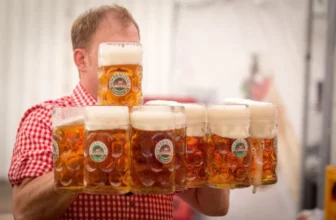
Why The Festivals and Food in Stuttgart Are Worth The Visit Alone

Fun Things To Do in Berlin: Toilet Burgers, Bunker Tour, Picnics and Parties
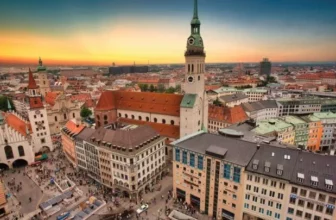
Unique Things to Do in Munich in Summer
Leave a reply cancel reply.
Save my name, email, and website in this browser for the next time I comment.
Tickets n Tour was born to help travelers and explorers find the best resources, prices and offers online with easy ways to plan, save and book your tickets and tours before the time.
The blog is written by the world explorers and marketing experts at Travel Tractions.
We ❤ travel and helping our readers find the best good travel deals by saving time and comparing the different options available. Read more about the site here .
- Latest Posts
Popular Areas
- Paris Tours
- Vatican City Tours
- Miami Tours
- Orlando Tours
- London Tours
- Kruger National Park
- Cape Town Tours
Popular Tours n Tickets
- Stanford Bridge Tour
- Sunset Cruise Cape Town
- Front of the line: Universal Studios Tickets
- Rome Colosseum Tour Prices
- Skip the Line: Eifel Tower
- Ferrari World Abu Dhabi Tickets
Terms and Conditions
Read our Terms and Conditions
Privacy Policy
Read our Privacy Policy

Compare items
- Total ( 0 )
Cultural Etiquette in Germany: Do’s and Don’ts for Foreigners
- Booka Local
- August 31, 2023
Table of Contents
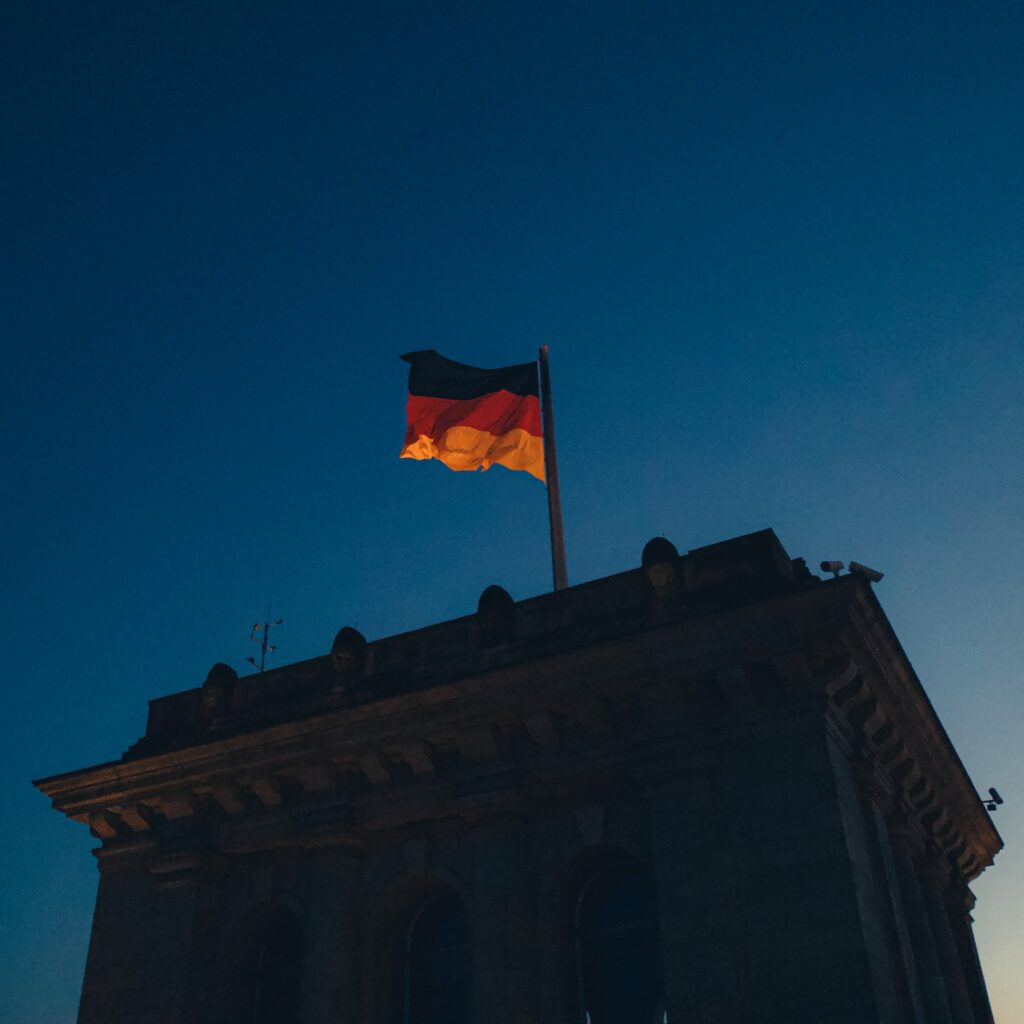
Book a Local to help you! From €14.
Germany is a country renowned for its rich culture, precision, and traditions. As an international visitor or expatriate, understanding and respecting the cultural etiquette in Germany is essential for a smooth and pleasant stay. In this guide, we’ll explore the do’s and don’ts to help you navigate social situations in Germany with ease.
The Do’s:
1. Greetings Matter:
- Do offer a firm handshake with direct eye contact when meeting someone. This shows respect and confidence.
2. Punctuality is Key:
- Do arrive on time for appointments, meetings, and social gatherings. Germans value punctuality and consider it a sign of respect.

3. Mind Your Titles:
- Do use formal titles like “Herr” (Mr.) and “Frau” (Mrs.) followed by the person’s last name when addressing individuals, especially in professional settings.
4. Recycling is a Must:
- Do participate in Germany’s strict recycling system. Separating waste into different bins is not only eco-friendly but also expected.
5. Respect Quiet Hours:
- Do observe “ quiet hours ” in residential areas, which are typically from 1:00 pm to 3:00 pm and after 10:00 pm. Loud activities during these times are considered impolite.
6. Bring Cash:
- Do carry cash, as many smaller businesses may not accept credit or debit cards. Cash is still widely used in everyday transactions.
Are you new in Germany and don’t speak German yet but need face the bureaucracy here? Do not worry, we’ve got you! Book a bilingual helper to assist you with in-person appointments, phone calls, paperwork and other tasks requiring German!
The Don’ts:
1. Don’t Be Late:
- Don’t be tardy, as being late is seen as disrespectful and inconsiderate in German culture.
2. Skip the Small Talk:
- Don’t initiate small talk with strangers, especially in public places like public transportation. Germans tend to keep to themselves in such situations.
3. Avoid Loud Conversations:
- Don’t engage in loud or animated conversations in public spaces like restaurants. Germans appreciate a quiet and calm atmosphere.
4. Don’t Joke About History:
- Avoid making jokes about sensitive historical topics like World War II and the Holocaust. These subjects are treated with the utmost seriousness in Germany.
5. Don’t Assume Familiarity:
- Don’t use first names unless invited to do so. Germans value a certain level of formality, especially in initial interactions.
6. No Open-Ended Invitations:
- Don’t extend open-ended invitations. Germans prefer specific plans, so be clear about dates, times, and locations when making arrangements.
By adhering to these do’s and don’ts of cultural etiquette in Germany, you’ll not only show your respect for local customs but also enhance your experience while living or visiting this fascinating country. Remember, understanding and embracing the culture is key to building positive relationships and enjoying your time in Germany to the fullest. Gute Reise! (Safe travels!)
Let us help you!

Booka Local is dedicated to simplifying the expat experience in Germany by offering easy access to affordable translators, ensuring no one gets lost in the bureaucratic forest.
Like the idea and want to support us? Buy me a coffee. 🫶
- +49 30 46795657
- [email protected]
Cookie Notice
Privacy overview.
- 8 Germany Travel Tips That...
Things to Know Before Visiting Germany

It’s always good to learn about local customs when you’re exploring a new country. With this in mind, we have put together tips on travelling in Germany . Customs might vary slightly in different areas, but most of these tips should help you – whether you’re heading to Berlin for business or to Bavaria for bratwurst and beer.
Respect the rules.

Germans generally like to play by the rules , and when you’re on their turf, so should you. For starters, always wait for the pedestrian crossing to go green before crossing the road – even if it seems safe, with no cars in sight. People will disapprove and shake their heads at jaywalking, and you might get a lecture about setting a good example to children nearby. If you’re planning to ride a bicycle (and you should), you always need to have a functioning back and front light for safety reasons. Being caught in the dark or running red lights both result in hefty fines.
Don’t walk in the bike lane
As long as you stick to the rules, cycling is a great way to get around. Berlin has twice as many bikes per head as cars, and an estimated half a million of them traverse the city every day, with new superhighways in the pipeline. But this can make things slightly more challenging if you’re on foot. Look out for the Radweg signs, a white bike outline on a blue background, which designates a cycle path – sometimes surfaced in red or some other distinctive colour. The Radweg is only for bikes, and pedestrians should try to keep out of it – obeying this rule is definitely in your own interests, as collisions can be painful. If a pedestrian zone has a sign saying Frei with a bike picture, take care, as it’s also open to cyclists.
Pay for AND validate your train tickets

Most newbies in Berlin are surprised, even giddy, upon discovering the absence of security gates or ticket inspectors as you enter train stations. Be warned, this is not a free pass to ride the underground, as plain-clothes officials also ride the subway and could pounce at any moment, costing you at least a €60 (£52) fine and a lot of embarrassment. You can buy tickets (which are good value compared to lots of other countries) at the station or at a sales outlet. There are also endless stories of people who diligently bought a train ticket, but forgot to validate it by putting the ticket in the machine (Entwerter), which stamps your ticket with the date and time. A ticket without an Entwerter stamp is not valid, and the ticket checkers will have no sympathy – you will still be fined. If you’re going to use public transport regularly, it is a good idea to get an even cheaper weekly ticket, which only needs validating the first time you use it.
Know your transport zone

You need to get the right ticket for the area where you’re travelling. Generally, moving away from a city centre will mean crossing into a different zone. Always check the zonal maps in the station if you are not sure. For example, Schönefeld Airport in Berlin is in ticket zone C, and, if you’re travelling around the centre of the city with an AB ticket, that won’t be enough. Munich recently simplified its zones but still has about 20 types of tickets for public transport, so it’s easy to get confused. Most tourist sights are in the central Innenraum (now known as Zone M), but to visit nearby towns and attractions, such as Schleissheim Palace, you’ll need a Zone M-1 ticket and Zone M-5 to get to the airport. Again, pleading touristic ignorance will cut no ice with the authorities, no matter how sorry you are.
Be punctual

Fünf Minuten vor der Zeit ist des Deutschen Pünktlichkeit (Five minutes early is German punctuality) is one of many German expressions about time. The saying might sound comic to people from more leisurely cultures, but it’s actually a good rule of thumb in Germany. Arriving promptly for social and business appointments is part of German etiquette; there is no such thing as being fashionably late here, and you’ll soon come to appreciate the joys of knowing people will turn up the minute they said they would. Another time-related Sprichwort (proverb), Pünktlich wie die Maurer (Punctual as bricklayers) is used – not always positively – about people who not only turn up on time but also finish exactly on time, too.

Other countries are starting to catch up, but Germans were pioneers in the matter of sorting glass, paper, plastic and so on into different-coloured containers for recycling. Putting a bottle in the paper bin or vice versa is definitely not on. And glass is sorted by colour, too. If glass or plastic bottles have a deposit (Pfand), you can get a small refund (up to 25 cents/22p for the latter) by returning it to a supermarket. (This doesn’t need to be the same one you bought it from.) If you don’t care about the Pfand, then put your refundable bottle next to or on top of the bin, instead of throwing it away, as someone else might be happy to claim the money.

Until recently, many small-business shops, bars and restaurants didn’t have card machines. But the coronavirus pandemic changed the picture, and you can now pay with plastic in almost every Bäckerei (bakery) and kiosk. It’s still useful to have cash, too, though, as shops can’t always accept all cards. And it’s worth working out which cash machines charge less to withdraw money, as some have quite high fees. Cafes are often open all weekend, but most shops, supermarkets and pharmacies are closed on Sundays, so make sure you have everything you need before the Sabbath rolls around. Shops do not all have the same opening hours; they differ from land to land, but are often open from 9am to 8pm, Monday to Saturday. Some kiosks and shops in railway and petrol stations sell basic supplies, even on Sundays, and are sometimes open 24/7.
Despite anti-smoking laws, there is generally a slightly more tolerant attitude towards the habit in Germany than elsewhere. Smokers have now been forbidden to light up in cafes or restaurants for some years – a rule widely accepted, although the situation in pubs and bars is a bit more complicated. Some have separate indoor smoking rooms or a smoking patio, while bars smaller than 75sqm (807sqft) can restrict entry to over-18s and declare themselves private smokers’ clubs. As a rule, German smokers are less willing to accept entirely non-smoking establishments, and non-smokers are less fussy when it comes to smoking in party-style environments or outdoors. And you are not allowed to smoke in a playground.
Veggies and vegans

No matter where you are in Germany, you’ll probably find a place to eat, but in smaller towns it might be tricky to get decent veggie food. Bigger cities – say, Berlin – have a thriving vegetarian and vegan culture with up-to-the-minute plant-based food sold everywhere, from Michelin-starred restaurants to market stalls. This is spreading rapidly across the country, but could take longer to catch on in rural areas. As you might expect, Mediterranean restaurants have more choice, while farmers’ markets (with great seasonal and organic produce) can be perfect places to pick up a picnic, and most supermarkets now cater amply for non-carnivorous tastes.
Eating out on a budget

If travelling on limited means, look out for an Imbiss: these are cheap snack bars, found in almost any busy street, train station and market – even in car parks. There is some truth in the sausagey stereotypes. Yes – Germans do eat a lot of wurst , with regional specialities including Blutwurst (black pudding) in Cologne and Currywurst (sausage with curry sauce) in Berlin. Another great source of reasonably priced food in expensive cities are places serving various global cuisines. No longer is it just kebab shops and Chinese takeaways. Ask around, and you might be pointed to a tiny outlet serving chilli and basil-flecked bowls of pasta arrabbiata or subtly spiced Thai curries, fresh from the wok, for just a couple of euros.
German beer

Ah, the joys of travelling in a hops-loving nation, where it’s fine to drink in public, having a cold one during your lunch break is completely normal, and the Weg-Bier (a beer to go as you make your way to the next pub or party) is immensely popular. The most controversial restrictions – among the first to be revoked, too – during the coronavirus lockdowns were temporary bans on alcohol in public places. With so many brews on offer, it might take a while to find your perfect match. Don’t imagine Bavaria is the only place for quality – Munich’s Paulaner and Löwenbräu brands are now international. Further north in Alpirsbach, Erfurt, Bamberg and Görlitz, smaller companies are creating gold in a glass, while Berlin is at the centre of a craft beer revolution, with new microbreweries experimenting with organic, unfiltered sour beers and stouts. Pioneers include Hops & Barley, in Friedrichshain and, more recently, Strassenbräu, near Ostkreuz.

While Berlin is full of the world’s tongues, from Spanish to Arabic, and most people speak English, it’s not always true in the rest of the country. You’ll benefit from knowing some basic phrases, so you don’t feel entirely lost. Phrase books and phone apps come in handy here. Of course, signs are written in German , so it’s useful to know a few staples, for instance, Damen (ladies), Herren (gents), Apotheke (pharmacy) and Polizei (police). A word of warning: it’s not a great idea to have a loud conversation in English, thinking people around you won’t understand. Plenty of Germans may be able to follow what you’re saying quite easily and may not appreciate your commentary.
Keep the noise down
Es gibt vielerlei Lärm. Aber es gibt nur eine Stille. (“There are many kinds of noise, but only one silence”), wrote German satirist Kurt Tucholsky. With the obvious exceptions of punk bands, motorbikes and carnivals, Germans love peace and quiet. Lots of areas of the country have traditionally had Quiet Hours, when there is supposed to be less noise, between about 10pm and 6am, all day on Sundays and, in some regions, after lunch (Mittagsruhe). Noisy parties, violin practice or DIY during these hours might be problematic and can mean complaints from neighbours. Perhaps even more importantly for most tourists, German travellers also tend to have a lower tolerance for noise on trains or buses (even if you’re not in a designated quiet carriage). Laughing and talking loudly, especially in a foreign language, might get you some stares and even direct comments.
Get out of town

Big cities such as Berlin and Munich are great if you want to immerse yourself in nightlife, creativity and beer festivals. But Germany is also a land of off-the-beaten-track idylls and hidden beauties . From the mystical Black Forest to fairytale castles dotted around the countryside, there is a whole heap more to explore than just the novelty of being allowed to drink beer on the street. If you have a valid EU or other accepted driver’s licence, you could rent a car; citizens of most countries are legal for six months with their existing licence after registering residence in Germany. Alternatively, plan your trip using the fast, efficient German railway system. A cheap half-hour train ride from Berlin will carry you through the lakes and forests of the Grunewald to Potsdam, with its photogenic palaces, and a couple of speedy hours by rail from Munich bring you to half-timbered, Medieval Bamberg, which is idyllic.
Book trains in advance

With speeds of up to 300kph (186mph), high-speed ICE (InterCity Express) trains are popular, and the quickest way to travel between major cities. They are not cheap, and reservations can cost extra (as well as sometimes being compulsory, with limited seats for Eurail pass holders). If you’ve got plenty of time and want to save money, you might find a cheaper slower train or bus. But you’ll find better fares (up to 50 percent off standard rates) by booking longer journeys at least a week in advance: tickets have limited availability, so the earlier you book, and the greater flexibility you have, the better. You’ll spend your trip(s) gazing out of the window, for Germany has some fabulous scenery: through the Black Forest and the Bavarian Alps or along the Rhine. Der Weg ist das Ziel, as they say in Germany, meaning roughly “the journey is the destination”.
Since you are here, we would like to share our vision for the future of travel - and the direction Culture Trip is moving in.
Culture Trip launched in 2011 with a simple yet passionate mission: to inspire people to go beyond their boundaries and experience what makes a place, its people and its culture special and meaningful — and this is still in our DNA today. We are proud that, for more than a decade, millions like you have trusted our award-winning recommendations by people who deeply understand what makes certain places and communities so special.
Increasingly we believe the world needs more meaningful, real-life connections between curious travellers keen to explore the world in a more responsible way. That is why we have intensively curated a collection of premium small-group trips as an invitation to meet and connect with new, like-minded people for once-in-a-lifetime experiences in three categories: Culture Trips, Rail Trips and Private Trips. Our Trips are suitable for both solo travelers, couples and friends who want to explore the world together.
Culture Trips are deeply immersive 5 to 16 days itineraries, that combine authentic local experiences, exciting activities and 4-5* accommodation to look forward to at the end of each day. Our Rail Trips are our most planet-friendly itineraries that invite you to take the scenic route, relax whilst getting under the skin of a destination. Our Private Trips are fully tailored itineraries, curated by our Travel Experts specifically for you, your friends or your family.
We know that many of you worry about the environmental impact of travel and are looking for ways of expanding horizons in ways that do minimal harm - and may even bring benefits. We are committed to go as far as possible in curating our trips with care for the planet. That is why all of our trips are flightless in destination, fully carbon offset - and we have ambitious plans to be net zero in the very near future.

See & Do
A voyage through germany: the lowdown on river cruising.

Places to Stay
The best spa hotels in baden-baden.

Architecture
Breathtakingly beautiful buildings in germany.

10 Reasons Why You Should Visit Bavaria

Craft and Culture in the Lesser-Known Gems of Eastern Germany

The Best Hotels to Book in Thuringia, Germany

Guides & Tips
Top tips for travelling in germany.

The Story Behind Germany's Neuschwanstein Castle

The Best Hotels to Book in Garmisch for Every Traveller

Places in Germany for History Lovers

The Best Hotels in Germany for Every Traveller

Stay Curious: Experience Germany From Your Living Room
Culture trip spring sale, save up to $1,100 on our unique small-group trips limited spots..

- Post ID: 1319620
- Sponsored? No
- View Payload

Top German Etiquette and Manners

What’s the first thing that comes to your mind when you think about German people?
You’ve probably heard things like “German people are always on time,” and “They’re direct and have good manners.” Well, I would say this is almost always the case. But now the question is: What are these so-called good manners and what does German etiquette look like?
Almost every nation defines this a little bit different. Let’s just take some Asian countries, such as China, for example. While in most European countries, you can’t burp, smack, or slurp at the table, in most Asian cultures this is called good etiquette. This means that the food was tasty and that you’re satisfied. But when doing this at the table of a German family, this would be considered bad table etiquette; they might think your parents didn’t show you how to use a spoon at home.
But on the other hand, in Asia, you shouldn’t touch your nose at the table. Can you see anything bad about touching or scratching your nose at the table if you need to? At least in Germany, this wouldn’t be a problem.
What I want to show you is this: Other countries = Other morals and manners.
In this article, we want to show you the Do’s and Don’ts in Germany. Be aware that these German etiquette tips might apply to other German-speaking countries, such as Switzerland and Austria (but not necessarily, as their cultures differ from ours in Germany).

Table of Contents
- Do’s and Don’ts for Dining
- German Social Etiquette in Public Places
- German Greeting Etiquette: Do’s and Don’ts for Greetings
- German Guest Etiquette: Manners When Visiting Another House
- German Travel Etiquette: Do’s and Don’ts in Public Transports
- German Business Culture and Etiquette: How to Behave in Business
- How to be a Good Part of German Society
- How GermanPod101 Can Help You Learn More German
1. Do’s and Don’ts for Dining
As mentioned above, when it comes to etiquette at the table in general, it becomes really difficult to handle as every culture is different. Even within Europe, you’ll find differences. For example, while French people like to extend their dinners until very late, Germans just try to finish as fast as possible. I guess we just try to be more efficient. Here are some German etiquette dining do’s and don’ts.

1- Don’t: Eat with an open mouth or make unnatural noises.

While in other cultures, burping or smacking might be a signal that the food was good and enough, in Germany you try to eat as quietly as possible.
That doesn’t mean you’re not allowed to talk; quite the reverse, you should talk as much as you can to boost your German. But don’t open your mouth while eating, and don’t make any slurping sounds when eating soup.
We prepared a free lesson about manners in Germany . Take a look before reading the rest of this guide to German etiquette to make the most of it!
Vocabulary List
- Schmatzen — “to smack”
- Bitte hör auf zu schmatzen . — “Please stop smacking.”
- Mit vollem Mund spricht man nicht . — “You don’t speak with a full mouth.”
2- Do: Say Prost and make eye contact.
Beer and alcohol have a long German tradition . You’re probably familiar with the Oktoberfest. But even outside of this famous festival, beer is highly accepted in Germany. When you’re out with your family and friends, alcohol will be a subject. We like to enjoy a nice Weizen or a cold Lager with our meal.
There can be many reasons you’re with your family or friends in a restaurant. Usually, it’s one’s birthday, you’re joining your weekly Stammtisch , celebrating the graduation of a family member or you just went with your family for a Sonntagsessen . Whatever it is, you’re there probably for a reason, and you’ll want to cheer (or toast) for the occasion. Maybe the party organizer even makes a short speech if he’s not too shy.
At a certain time during dinner, usually before the food arrives at the table, you’ll raise your glasses to cheer the occasion you’ve gathered together for. Everybody will raise their glasses and say Prost . Then you’re supposed to answer with Prost , and you’ll try to clink glasses with everybody at the table.
Important when clinking your cup with someone: MAKE EYE CONTACT .
It may sound a bit stupid, but Germans say that if you don’t look each other in the eyes when clinking glasses, you’ll have seven years of bad luck in the bedroom.
3- Don’t start eating until everybody has their food.
I know from my own experience that some cultures in South America have the attitude that when you’re making a barbecue, or even when coming together with friends and family on the weekends, there are a lot of people around you and it’s quite normal to have lunch or dinner with ten or more people.
This sometimes makes it difficult to get everybody at the table at the same time, and everybody starts eating whenever he or she wants. But be assured that this isn’t the case in Germany. When you come together, you serve everybody first, and then you start eating.
4- Do: Say Guten Appetit.
There is one similarity between French and German culture: We enjoy telling our guests that they can enjoy their meal. And we don’t just say it for fun, we really mean it. We hope that the food we prepared is tasty and will satisfy everybody.
But this isn’t just to say that you’re supposed to enjoy the food. This is also a good indicator for you, as a foreigner, to start eating. Earlier, we mentioned that you shouldn’t start until everybody has their food. When the cook, or the person who prepared your meal, says Guten Appetit , this also means that we’re ready and everybody can start eating.
There’s even a phrase that we teach our children when they’re fairly small: Pip pip pip – Guten Appetit – “Enjoy your meal!”
2. German Social Etiquette in Public Places

When going out in public, you should at least maintain a certain level of politeness. But no worries. With common sense, you’ll survive this.
1- Don’t: Cross the street on the red traffic light.
In many countries the traffic lights are only for orientation and the people mostly ignore them. Not in Germany. Remember that we’re talking about a country which is known for the phrase:
- Ordnung muss sein “There must be order”
Germans value their laws, so being in Germany you should do it as well. Crossing the street on a red light in Germany might draw the attention of other pedestrians and it might end with getting a ticket which will cost you around 5€. For ignoring the red light while being on the bicycle, the fine can grow even up to 60 – 180€ and you can even earn some Punkte in Flensburg , which might cause losing your drivers licence for a few month.
Watch out especially when children are around. Germans are very sensitive when it comes to their children. Be a good role model and show them how to behave properly in the road traffic.
2- Don’t: Squeeze in lines facing people.
You know that feeling when you’re arriving a bit late to a movie in the cinema, or you come to the theatre and your seat is right in the middle of a row?
Well, the first hint we can give you is this: If there are other free and empty seats, it might be better to just choose one of those seats, though it’s also fine to make your way to your booked place.
Just remember to be friendly at all times. While passing other visitors, you can say:
- Entschuldigung “Excuse me.”
But always remember to pass the people in the same row face to face. If you don’t do so, you might offend them. They probably won’t say something to you, but why offend someone when you can avoid it?
3. German Greeting Etiquette: Do’s and Don’ts for Greetings

German etiquette and customs for greetings can be really different from what you may be used to. You may ask yourself questions, such as:
“Should I greet everybody?” “Should I give a hug or a kiss on the cheek?” “Should I shake their hand, or maybe just say hello?”
To give you more insight on the topic of German cultural etiquette for greeting people, we’ve published a video about greetings on our site.

1- Do: Say “Hello” to everybody.
When entering a party or a family meeting, you’ll usually be introduced by the owner or the host to everyone who’s already there. But if this isn’t the case, you should introduce yourself to everybody. You don’t need to tell your life story, but a nice Hallo, ich bin [add your name] is perfect. Make sure to shake their hand.
This also applies when entering a restaurant, shop, or most other places.You don’t need to greet everybody, but for example, when entering a small shop, at least say a friendly Hallo or Guten Tag , and Tschüss or Auf Wiedersehen when leaving again. If you’re more extroverted even a short small talk is fine. That’s more than enough. This especially applies when you’re entering a waiting room at the doctor’s office.
2- Don’t make the polnischer Abgang .
British people call it the “French leave”, French people call it the “ filer à l’anglaise ” or “to leave English style” and Germans use their eastern neighbours to name this specific style of leaving.
Polnischer Abgang means literally “Polish leave”, and it describes when you’re sneaking away from a party or some other place without saying goodbye to someone (or even everybody). This is considered rude, and you should avoid doing so. Don’t be shy, and let at least the owner know that you’re leaving.
3- Do: Use the correct form of the day.
According to proper German etiquette, there are different ways to greet people depending on the time of the day. We won’t give you an extensive guide for this, but be sure to remember this:
- Guten Morgen — “Good morning” (used until noon)
- Guten Tag — “Good day” (used until it’s dark)
- Guten Abend — “Good evening” (used when it’s dark or you’re out for dinner)
- Hallo — “Hello” (almost always used in an informal situation)
- Tschüss — “Bye” (almost always used in an informal situation)
- Auf Wiedersehen — “Goodbye”
For some better insight, we have a lesson in our free course about greetings .
4. German Guest Etiquette: Manners When Visiting Another House
If your lucky, on your trip to Germany, a stranger or a friend may invite you to his home. It might be for a party or just to hang out. But in either case, there are some unwritten German etiquette rules that you should follow.
1- Do: Use the formal Sie first.
In English, addressing a person is fairly easy as you just have one word for formal and informal situations: “You.”
In German, there are some differences that you should know, and even some rules. We’ll give you a quick overview.
- The formal way to talk to someone is by using Sie .
- The informal way is to use Du .
- The actions are called siezen and duzen .
When to use which form can be confusing, so here are some general rules:
- Rule: If you’re not sure which one to use, be formal.
- Rule: When the person is older than you, use formal.
- Rule: At work, use the formal way, until the other person offers you the informal way.
- Rule: If you know the other person will use the informal way, also be informal.
- Rule: Offer du if you’re older.
If you want to extend your knowledge about formalities and etiquette in Germany , take a look at our free course.
If you want to address someone in a formal manner:
- Herr [last name] — “Mr. [last name]”
- Frau [last name] — “Mrs. [last name]”
If you want to offer the du , say:
- Du kannst ‘du’ sagen . — “You can say du .”
- Ich glaube, wir können uns duzen . — “I think we can use the informal you.”
2- Do: Make a small gift.
This is an easy one. When you come to the home of a friend or family member, just bring something small. You don’t need to invest too much time into thinking about the gift. This can be something quick and small, such as:
- A bottle of wine
3- Don’t choose the wrong topics.

Have you heard that there are some parts of German history that aren’t as bright as those of other nations? I’m talking about the Second World War.
Actually this is a very important topic to talk about, especially since Germany has shifted to the right in the past few years, giving opportunities for politicians who are denying German war crimes to grow in popularity. So if you’re interested in the topic, ask people about the war and discuss with them, but be aware of some things:
- This is still a very sensitive topic for some people. Don’t be too harsh, many people have emotional connections to this time. Try to remember that there are still many people who fought in the war, lost their families due to the war and suffered from the consequences.
- Don’t make stupid jokes about this time. Sure, they might be funny to you, but remember that there is a possibility that someone in the room lost their family members in the war.
- Evaluate what people have told you. Germany has a growing problem with fake news and with people denying or marginalizing the crimes of the Nazi Germany. It’s always better to double-check the information.
Other than this, you should avoid the topics that generally make people uncomfortable and make things awkward, like politics, money, or religion, at least when talking to people you don’t know very well.
In general, be careful with potentially sensitive topics.
5. German Travel Etiquette: Do’s and Don’ts in Public Transports

1- Don’t: Listen to loud music.
I know you might have a long ride on the subway from home to work, or the other way around. It’s also just fair that you listen to your music and enjoy the time that you’re there.
But it’s not necessary to share the music that you like with the rest of the train. They might like some other type of music. So just plug in your headphones and listen to the music without disturbing anyone.
Listening to your music loudly is even considered offensive to some people, and at some point someone will surely tell you to “Shut the f*** up.”
2- Do: Offer your seat.
When there are free seats and you have a long trip to your destination, feel free to sit down. But during the ride, people will enter and leave the train, and the closer you come to the center, the fuller the wagon gets.
Public transport is the easiest way in German cities to get around, so everybody uses it. Even pregnant women, older ladies and gentlemen, and disabled people.
Be polite and offer your seat to them. They’ll thank you, the people around you will see it, and it gives you a good feeling. We say in Germany:
- Jeden Tag eine gute Tat . “Every day a good act.”
To offer your seat, you can say:
- Möchten Sie sich vielleicht setzen, hier bitte . “Do you want to sit down here, please.”
Point to your seat while saying this.
3- Let other people leave the train first.
As in most other countries, the metro and buses are fairly full, and even more so during the rush hour. Everybody is stressed and just wants to get home to their loved ones.
Before entering the subway, make space in front of the doors so that other people can get out first. This ensures that they don’t need to squeeze past. If you’re standing in front of the door, I’m sure that someone will be impolite to you. And to be fair, with good reason.
6. German Business Culture and Etiquette: How to Behave in Business

In this section, you’ll learn about some German professional etiquette rules. When it comes to German etiquette, business depends on knowing your way around it! Here are some German etiquette do’s and don’ts for doing business in Germany.
1- Do: Bring your own cake.
This mainly applies to business culture as opposed to private birthday parties. But when it’s your birthday and you’re working in an office, then colleagues expect you to bring something to the office to share with everybody.
From experience, this doesn’t have to be a cake; a small breakfast or something for lunch is good as well. The idea of giving something to them is more important than what you give.
2- Don’t: Be late.
Don’t be late, but neither be early. It can be quite difficult for some people to be exactly on time.
Trains, buses, or anything else regarding public transport, won’t wait for your arrival. They’ll leave without you. This can also be the case with friends. You agreed on a certain hour to meet, so you’re expected to be there at that time.
When it comes to punctuality, Germans don’t mess around. Of course, no one will kill you because you’re five minutes late. But it’s better to be five minutes early, than to be five minutes late.
If you’re too late, you can lose your hour at the doctor, miss meetings at work, and miss out on other important times and events.
3- Do: Shake hands, but don’t overdo it.
While in other countries, such as France or most parts of South America, a hug or a kiss on the cheek are common, even in daily business culture. In Germany, however, you shake hands with both genders.
In more relaxed situations, you can give hugs and people won’t refuse them. But in business, a handshake is more acceptable.
Don’t get too touchy. Once a person has accepted your handshake, that’s enough. You don’t need to touch their shoulders or grab their waist, or anywhere else. Give them their personal space.
Take a look at our website to learn some helpful business German .
7. How to be a Good Part of German Society
1- do: recycle your garbage..

The “green” movement has already taken place in Germany, and we’re trying our best in everyday life to not stress the environment more than necessary.
For this, we have a recycling system. For glass, for example, we divide them into brown, green, and white glass; there will be extra recycling containers for each sort.
Also, you should separate your waste between plastic, paper, and natural garbage.
In addition to this, we have a recycling system for plastic bottles. That means that when buying a plastic bottle, you have to pay a certain amount extra. After you bring the bottle back to a machine in the supermarket, you’ll get back the extra amount you paid. This system is called Pfand . Believe it or not, foreigners love this.
2- Don’t: Open closed doors unasked.
Sometimes Germans just need time for themselves and don’t need to be out in public. For this, we have a common practice of keeping the door to our room shut when we don’t want anyone to come in.
At the same time, this means that if your door is open, a person can enter the room almost unasked.
This applies to almost every situation: at home when sharing your flat, or in the office.
8. How GermanPod101 Can Help You Learn More German
In summary, we’ve introduced you to important German etiquette regarding: public transport, greetings, visiting public places, being in friends’ homes, and the business culture in Germany. Apply our do’s and avoid the don’ts, and you’ll be more than fine visiting all parts of Germany.
Are there similar etiquette rules or cultural customs in your own country? Let us know in the comments!
If you’re interested in boosting your German skills faster, we recommend you our private teacher program . It focuses on your personal goals and your current German level, to help you improve at your own pace and toward your own goals.
We won’t just release you without making you even happier. So we’ve prepared some free-of-charge lessons on GermanPod101.com . There are classes for:
- Intermediate
Make sure you get a spot today and boost your German to the sky. But don’t forget German etiquette on your way to the top.
Or sign up using Facebook
Got an account? Sign in here

How To Say ‘Thank you’ in German

Hi, What’s Up, and Beyond: How to Say Hello In German

How to Say I Love You in German – Romantic Word List

The 5 Go-To German Podcasts for Language Learners

Intermediate German Words to Level Up Your Vocab

German Animal Names: The Ultimate Vocabulary List
How to celebrate april fools’ day in german.
- Forum Spotlight
- Scheduled Maintenance
- German Holidays
- German Dictionary
- German Language
- German Translation
- German: one word at a time
- Guest Bloggers
- Advanced German
- German Alphabet
- German Grammar
- German Lessons
- German Online
- German Phrases
- German Podcasts
- German Words
- Tips & Techniques
- Life in Germany
- Living in Germany
- Media Coverage
- News in German-speaking countries
- Feature Spotlight
- Speak German
- Success Stories
- Teaching German
- Team GermanPod101
- Uncategorized
- Word of the Day
- Immigration, Visas
Copyright © 2024 Innovative Language Learning. All rights reserved. GermanPod101.com Privacy Policy | Terms of Use . This site is protected by reCAPTCHA and the Google Privacy Policy and Terms of Service apply.
Awesome, you're subscribed!
Thanks for subscribing! Look out for your first newsletter in your inbox soon!
The best things in life are free.
Sign up for our email to enjoy your city without spending a thing (as well as some options when you’re feeling flush).
Déjà vu! We already have this email. Try another?
By entering your email address you agree to our Terms of Use and Privacy Policy and consent to receive emails from Time Out about news, events, offers and partner promotions.
Love the mag?
Our newsletter hand-delivers the best bits to your inbox. Sign up to unlock our digital magazines and also receive the latest news, events, offers and partner promotions.
- Things to do
- Attractions
- Restaurants
- Los Angeles
Get us in your inbox
🙌 Awesome, you're subscribed!

20 essential travel tips for every first-time Munich visitor
Everything first-timers need to know to get around Munich, from transport tips to top attractions to Bavarian etiquette
Sure, you might know about Munich’s great museums, foodie scene and the ridiculous amount of beer on offer. But did you know about having to carry cash? Or that shops are always closed one day of the week?
Did you know you can surf here on the side of the street? Or that you can get into a museum for a euro? Well, if any of this is news to you, it sounds like you need this list. Our local writer has compiled the 20 essential things you need to know before you visit Munich. This is your holy grail. Enjoy!
RECOMMENDED: 📍 The best things to do in Munich 🍴 The best restaurants in Munich 🍻 Best places to drink beer in Munich 🏺 The best museums in Munich 🏛️ The best attractions in Munich
Naomi Kaye is a writer based in Munich. At Time Out, all of our travel guides are written by local writers who know their cities inside out. For more about how we curate, see our editorial guidelines .
An email you’ll actually love
Essential tips for every first-time Munich visitor

1. Prepare for the ‘Millionendorf’ atmosphere
Munich isn’t just any city. The word to describe the vibe here is gemutlich, which means cosy, and let us tell you, it lives up to the name. And that’s what’s behind the term Millionendorf - Munich is the kind of place where you say hello on the street, you know your local shopkeepers, and you always make space for bikes. It’s not a skyscraper city, more like a little village. Take it in.

2. Carry cash
While major supermarket chains and shopping outlets are likely to accept your credit card, most restaurants and stores in Munich will only accept cash or EC-cards (like debit cards). Make sure you have enough euros with you for everyday use. The COVID-19 pandemic has dented the German love of cash, but hard currency remains king in these parts.

3. We’re pretty direct
Germans have a reputation for being very direct, and Bavarians are no exception. If you walk into the bike lane by accident or commit some other faux pas, chances are someone will let you know. This honesty also has some pay-offs, though – if you leave your wallet at a restaurant, someone may well run after you to return it, or if you lose a mitten on the sidewalk, you could find it hanging from a fence or tree near where you left it.

4. The Bavarian dialect can be tough
Pleased you’ll have no issue with dialect because you’re fluent in German? We’ve got bad news. The Bavarian dialect can be tricky to understand even for native Germans. Need a couple starters? Pfiade (goodbye), Rozgloggn (a stuffy nose), Fraibialädschn (a person who’s a big taker but not a very generous giver). That should do you.

5. You can surf here sans ocean
At the Eisbach on the Isar river, you’ll see people catching waves whatever the weather – there are other points where the river converges to create a surf wave, but the Eisbach is the most notable and attracts a lot of onlookers. Admittedly, people are more warmly dressed for surfing here than in Hawaii.
Check out more of the best things to do in Munich .

6. We’re bananas for Boazn
Want the ultimate local drinking experience? Hit up one of the city’s boazn , Munich’s equivalent of dive bars. They’re mostly quite cosy, with slot machines, neighbourhood drunks and effusive bartenders who can offer you not just a freshly tapped beer but also some life advice.
While you’re at it, check out our guide to the best bars in Munich .

7. Sometimes museum visits are just one euro
A museum tour is well worth your time in Munich, as the city is home to many world-class art galleries, science museums and even some obscure offerings including the Kartoffelmuseum (Potato Museum) and the Jagd- und Fischerei-Museum (the Hunting and Fishing Museum). On Sundays, a visit to many of the city’s finest costs only one euro.
Check out more of the best museums in Munich .

8. Peruse the outdoor markets
Munich’s famous year-round produce market, the Viktualienmarkt , is where to head for fresh food and brews in a gigantic beer garden. All around the city, other farmers’ markets draw the locals in – check neighbourhood listings to find out what’s closest to you. And in winter, don’t forget to explore the numerous Christkindlmarkts , Munich’s Christmas markets… perhaps a Glühwein (mulled wine) or a Lebkuchen (gingerbread) is in order.

9. A car is unnecessary in Munich
Locals do love their BMWs and Mercedes, but you can totally get by without a car in Munich (and frankly, given the cost of petrol and prevalent rush-hour traffic, this is a good idea). Public transport is comprehensive and excellent, most of central Munich is walkable and bike lanes (and rentals) are everywhere and widely used.

10. No Sunday shopping
Before you plan out your week (or weekend) in Munich, make sure you make note of the fact that most stores (supermarkets included) are closed on Sundays. Stock up on those groceries and plan your vintage shopping trip for another day, folks. Oh and don’t worry, there are emergency supermarkets and a bunch of pharmacies that stay open, so you won’t be stranded.

11. You might actually see trachten (traditional German garments)
Yes, Munich locals do really wear lederhosen and dirndls (as well as janker , and other classic Bavarian clothing) on special occasions like weddings or going to church. You’re welcome to sport your own tracht if you like – just be aware that a proper, well-made piece is costly. That said, a really good set of trachten can last for generations.

12. Take a hike
A huge perk of Munich life is the city’s quick and convenient access to the mountains. Hop on a train and you’ll be at a trailhead in less than an hour. Paths are well marked, and most of them feature Almhütte where you can enjoy a beer surrounded by the mountain air, adorable cows and breathtaking scenery.

13. Keep an eye out for street art
Sometimes Munich comes off as a bit staid and conservative, but the city definitely has an edgy side – which often manifests itself through street art. Local graffiti artists’ work can be found primarily in bike and pedestrian tunnels that run throughout the city centre. You might have to search a little while, but the hunt pays off.

14. All about that bread
This is not the city for a low carb diet; the bread in Munich is unbeatable. Salty pretzels, dark rye bread, yeast buns with raisins and sourdough are just some of the excellent baked goods you can get in this city. Bakeries abound – so you’ll never lack options. Better yet, find out how to eat like a local in Munich (pretzels included).

15. Try a group tour
Munich has a wide array of city tours you can take to help explore the city and understand its history and culture. Bike tours are particularly popular, as the city is so cycle-friendly, though also worthwhile are walking tours on topics as diverse as the local food scene, the Second World War and Bavaria’s former royalty. And if you’re that way inclined, why not try one of the brewery tours – or another around the BMW manufacturing plant?

16. Check out a castle
Munich and its surroundings have several castles that are worth a visit if you want to see how former Bavarian royalty lived. Schloss Nymphenburg, in particular, makes for a decent day trip, as it also features beautiful gardens, a neighbouring science museum, a river brimming with hungry carp, and indoor botanical gardens.

17. Don’t stop at Oktoberfest
Sure, the city is famous for Oktoberfest, but that’s hardly the only festival worth attending in Munich. The popular Tollwood festival occurs twice yearly (summer and winter) with international food, a circus and live music. Opera, music, theatre and comedy festivals are well attended and often sell out quickly. Just about every neighbourhood also has its own annual street festival, usually with hot food, live music and kids’ activities.

18. Don’t overlook the airport
It’s true that most of the time when you arrive at your destination, you want to get ‘there’ as quickly as possible – which means getting out of the airport. But the Munich airport has quite a bit going on: it has its own brewery, and there’s a giant observation area where you can watch the planes take off, play mini-golf or check out an exhibit on air travel. It also has one of the only supermarkets open in Munich on a Sunday.

19. Music is everywhere
Munich has something for every kind of music lover, from opera (your ticket even includes public transport there and back) and jazz – try catching a show in an unfinished underground station – to huge rock and pop arena gigs. Check out the university offerings as well; there are countless talented student-run orchestras, bands and choral groups.

20. Treat yourself at an Apotheke
Whether you’ve come down with a cold in Munich or are just looking for some fancy French body lotion, the city’s many Apotheken are here to help. Pharmacists are familiar with the most common ailments and can provide advice as to what sorts of over-the-counter medications might help. At many Apotheken , you can also stock up on all sorts of high-end European skincare products.
[image] [title]
Discover Time Out original video
- Press office
- Investor relations
- Work for Time Out
- Editorial guidelines
- Privacy notice
- Do not sell my information
- Cookie policy
- Accessibility statement
- Terms of use
- Modern slavery statement
- Manage cookies
- Advertising
- Time Out Market
Time Out products
- Android app
- Time Out Worldwide
- Value Package
- Blocked Account
- Health Insurance
- Bank Account
- Study Finder
- Study Eligibility Checker
- Accommodation
- Learn German
What We Offer
- Living in Germany
- Studying in Germany
- Working in Germany
About Germany
- German Cities
- Tourism in Germany
- German Culture
- Visa for Germany
- Costs of Living in Germany
- Finance in Germany
- Health Insurance in Germany
- Driving in Germany
- Renting in Germany
- German Universities
- Free Studies in Germany
- German Education System
- Germany vs. other Study Destination
- German Degrees
- Application Process to Study in Germany
- Financing your Studies in Germany
- Best Universities in Germany
- German Business Culture
- Best Cities in Germany for Expats
- After your Bachelor's in Germany
- After your Master's in Germany
- About Expatrio
- Partner log in
- Partner Log-in
German Etiquette - Do's and Don'ts

It is important to learn about German culture if you are planning to move to Germany. This article will show you the do's and don'ts when it comes to German etiquette.
Cultural differences can sometimes cause misunderstanding. What may be considered polite in your home country may be seen as bad if you do the same in Germany. That’s why it is essential to learn about German culture if you are planning to move to Germany. Read on to learn more about the do's and don'ts of German etiquette.
German Etiquette: Do's
Do #1. Shake hands
Germans love shaking hands. When joining a group, it is common to shake hands with each person for greeting. Similarly, German people also shake hands when they leave. This practice is not limited to the business environment but also happens on social occasions.
If you meet close friends or family, you can give hugs instead. Do not give hugs at work, though. A handshake is more appropriate in business.
Do #2. Say hello and bye
When you enter a shop or a waiting room at your doctor's office, greet the people there. You do not need to initiate a conversation afterward. Just move on with your shopping, or sit down quietly.
You can say Auf Wiedersehen or Tschüss when you leave, which means bye.
Do #3. Be on time
After moving to Germany , you will probably notice that German people are very punctual. When a German person wants to meet you at 3 p.m., they really mean 3 p.m., not 3:15 pm or 3:30 pm.
It may be acceptable if you are a few minutes late. But if you are going to be later than that, make sure to call the other person and let them know beforehand. It is rude to be late without a valid reason.
This rule also applies to business meetings and social situations. If you have other important appointments, such as a flat visit when looking for a rental flat , it is even better to arrive a few minutes earlier.
Do #4. Make an appointment
Germans love appointments. This does not only apply to business meetings. You should also make a Termin when visiting a doctor, a hairdresser, or any governmental body. If you want to hang out with your friends, it is better to call or text them shortly before seeing them. This is to make sure that they have time for you.
Do #5. Separate your rubbish
Germany is a very environmentally friendly country . People separate their rubbish at home (e.g., organic waste, paper, glass, and plastics). It may be a bit confusing for foreigners at the beginning. Ask your roommates or neighbors how it works if you are not sure. Never throw your rubbish randomly into the bins. This practice is considered very bad, and you may even receive complaints from other people if they see you doing so.
Do #6. Make eye contact with clinking glasses
In Germany, it is common to have alcohol with lunch or dinner. When you are in a group, you should wait until everybody has their drink and only start drinking after clinking glasses. When clinking glasses, it is essential to look into each other's eyes. Believe it or not, not doing so will result in seven years of bad sex . You probably won't want to risk that.
Do #7. Bring your own cake
If it’s your birthday, don't expect your friends to throw a party for you. Should you want a party, you will have to host it yourself. You are supposed to provide food and drinks for your guests. And they will give you birthday gifts in return.
It is common for the birthday person to bring a cake for their colleagues at work. Sometimes, the colleagues may have a small gift for the birthday person. But it is not always the case.
Do #8. Bring a gift when you visit someone
You should learn about gift-giving in Germany when living here. For example, if you visit someone, it is polite to bring a small gift. If you are not sure what to get, just buy something general like a bottle of wine, chocolate, or flowers. Those will go well in most situations. Please note that gifts are usually opened when received.
If you are invited to a house party or a dinner at home, you can ask the host if he needs something. For example, he may want you to bring some drinks, snacks, or dessert.
German Etiquette: Don’ts
Don’t #1. Cross the street when the traffic light is red
German people are very disciplined. Even when no car is coming, they do not cross the road on the red pedestrian light. This “don’t” is fundamental when children are around. You should be a good role model for the children. Breaking the rule and crossing the street on the red light is very frowned upon.
Don’t #2. Make loud noise in public
Compared to many other countries, German people are very quiet. When you are on public transportation or in the doctors' waiting rooms, you are supposed to stay silent. Having a loud conversation, talking loud on the phone, or listening to loud music are considered very impolite as you will disturb other people.
Don’t #3. Open closed doors without knocking
German people love to have their privacy. If you see a closed door, it doesn’t mean that the person inside does not want you to come in. However, it is very impolite if you just open the door. You should always knock first before entering the room. This rule applies to office spaces and also at home.
Don’t #4. Call people late in the evening
Unless you are very close friends, you should not call people late in the evening. If you will be working in Germany, it is essential to learn the German business culture . You should not call your colleagues after office hours or on the weekend. German people like to keep their private and business lives separate.
Don’t #5. Make jokes about nazism
Foreigners could associate nazism with Germany. And some people may bring up this topic during a conversation with other German people. However, you should know that this theme should only be discussed seriously. Until today, World War II can still be a very sensitive topic to many German people. Never make jokes about nazism or the war.
Don’t #6. Stare at naked people
In Germany, people may be more open to public nudity than in your home country. You are allowed not to wear your swimming suits in certain saunas. You may also see naked people in restricted lake areas. And you could see people walking around naked in the changing and showering area when joining a gym. German culture does not always associate nudity with sex. And you should not stare at naked people, as that is considered rude.
Don’t #7. Expect everyone to speak English with you
German is the official language in Germany. Even though many people in Germany can speak English, not everyone will necessarily speak English with you. You should try your best to speak some German in your everyday life. If you really cannot speak the language, ask politely in German if you can have the conversation in English.
Learning German is essential, especially if you want to stay in Germany for the long term. You could take intensive German classes or use some apps to learn German to adapt faster in the country.
Don’t #8. Wish someone a happy birthday before their birthday
In Germany, it is considered bad luck if you wish someone a happy birthday before their actual birthday. It implies that the person may not make it until their birthday. Make sure you say happy birthday only on the day of or after their actual birthday.
When living in Germany, you should be thoughtful about the German culture and the habits of people living in the country. That is why it is essential to learn how things work in Germany before moving . We hope that this article helps you to have an understanding of basic German etiquette. Following these rules will help you adapt faster to your new life in Germany.
About the author: Sindy came from Hong Kong and moved to Germany in 2010. Her blog My Life In Germany provides helpful info to expats about studying, working, and living in Germany.
Excellent Careers In Germany for People Who Know Foreign Languages | expatrio.com
13 Reasons Why Studying Medicine in Germany is a Great Idea | expatrio.com
Reasons Why You Should Study Your MBA in Germany | expatrio.com
This might also be of interest to you

10 Good Reasons to Study an Engineering Master's in Germany in 2022
Germany is a good country to study in if you want to be successful. An engineering degree from Germany is regarded as highly pretentious, so this is...

The 10 Best Movie Theaters and Film Festivals in Germany
Germany is a country with a rich cinematic history. From the expressionist films of the 1920s to the New German Cinema of the 1970s, German...
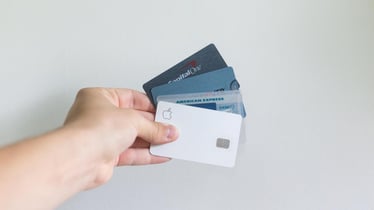
Highly Recommended Credit Cards in Germany
Germany is an excellent place to live and work, with a high standard of living and many job possibilities. If you are a student or working...

Summer Music Festivals- 2022
Summertime in Germany means one thing – music festivals! There's something for everyone, from small, intimate gatherings to massive open-air events....

Tips on How to Keep Healthy During Quarantine
As Germany faces its second lockdown, you might be wondering how to keep healthy during the winter time at home. Although most of the world is...

5 Ways To Get Your Own Pet In Germany
If you're planning to move over to lovely Deutschland, chances are you’re searching for reliable ways to bring home a pet in Germany to keep you...

How to Choose a German University That’s Right for You
Find out how to compare various higher education institutions and make the right choice. There are more than 400 universities in Germany, and all of...

13 Reasons Why Studying Medicine in Germany is a Great Idea
Find out the advantages of pursuing your MBBS in Germany. If you are considering studying medicine in Germany, read this article! This blog post will...
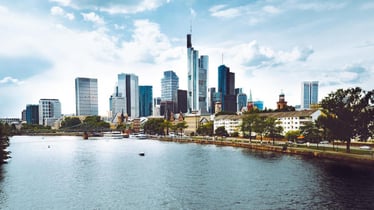
Reasons Why You Should Study Your MBA in Germany
Thinking about enrolling in an MBA? We listed the top 8 benefits that make studying for your MBA degree in Germany worth it. When an average person...
How to Get a Loan in Germany [Requirements and Tips]
Expatrio takes part in the Sino-German Annual Meeting for Business Cooperation and Technology Exchange
- Natural Wonders
- Federal States
- UNESCO Sites
- Architecture
- Art Museums
- Famous People
- Holidays & Customs
- Plants and Animals in Germany
- Extreme Sports
- Family Trips
- The Romantic Road
- Top Ski Resorts
- Do's & Don'ts
- Privacy Policy
- About Lydia
Welcome to My Germany
Discover the adventures that await.

Discover Cities
A rundown of the best cities in Germany to visit. Where to go for historical, cultural, and culinary experiences set in stunning landscapes and beautiful architecture.

Discover Castles
Discover some of Germany's famous castles, from the iconic Neuschwanstein to the tiniest of country lodges. Uncover interesting facts and helpful tips as you explore!

Discover Natural Wonders
Embark on a journey through the natural wonders of Germany with our guide to breathtaking alpine landscapes, turquoise waters, and stunning rock formations.

Discover Famous Germans
From famous musicians and poets to kings and queens, Germany was the home to so many inspirational and entertaining folk. Let's learn about the famous Germans in history!
Tour My Germany Travel Guide: Discover the Best of Germany
Do you know where the best place to eat bratwurst in Germany is? Why are there shelves inside German toilets? What is the most famous fairy tale castle to visit?
For answers to all these questions and more , read on!
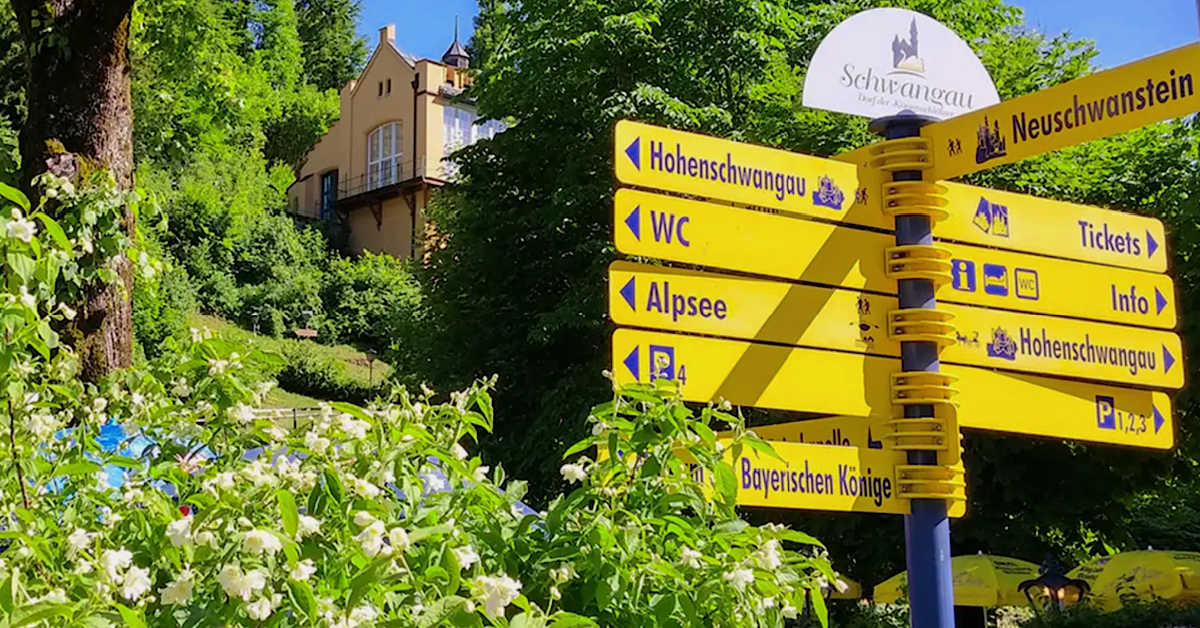
Herzlich willkommen!

I'm Gerhild and for over 15 years, I've been sharing my German cuisine on Just Like Oma . Join me now as we tour my Germany to see where these delicious foods originate.
As we travel, we'll marvel at the spectacular scenery, delve into the local culture, uncover hidden historical treasures, and find the best destinations off the beaten track that are worth exploring.
Joining us on this tour is my son Eran and my granddaughter Lydia each writing as they travel throughout Germany, discovering more about their heritage. Experience the country through their eyes as we:
- Gaze upon fairytale castles and baroque palaces
- Embark on a river cruise along the Rhine River
- Camp in interesting locations throughout Germany
- Drive down the scenic drive down picturesque Romantic Road
- Stroll through the charming Christmas markets in places like Rothenburg ob der Tauber
- Explore historic cities , towns, and the natural wonders of Germany
- Visit more than one UNESCO World Heritage Site
Be inspired to join us! Discover this popular destination in Central Europe, Germany, but not just as a tourist following the typical Germany travel guides.
- The Black Forest and the Rhine valley
- The picturesque shores of Lake Constance
- The iconic Brandenburg Gate
- The majestic peaks of the Bavarian Alps and other natural wonders
- The grand palaces and iconic landmarks and buildings
- The famous Oktoberfest celebration in Munich
Experience all of this in the best way possible, with the help of the travel tips you'll find throughout our Tour My Germany guide.
Gain insights into German culture, including customs, etiquette, and popular activities, whether you're taking a road trip, using train stations, public transportation or some of the busiest airports. Be prepared, making travel plans with the best time to go, whether during peak season or not, and the best things to do and things to avoid .
Explore today's Germany by touring the heart of Europe and visiting the major cities or fairytale towns in southern Germany, or the big cities and smaller towns in northern Germany. Meet the welcoming German people, who will inspire you to continue your quest to learn about all things German, including interestingly strange and fun facts . And of course, savor the delicious German cuisine throughout your journey!
Recent Articles and Newest Posts
Castle Hotels in Germany : The Best Castle Hotels to Stay in

Famous Architecture in Germany: Iconic Landmarks and Buildings

Plants and Animals in Germany: The Flora and Fauna of the Regions

Things to do in Heidelberg: Amazing must-see attractions

Hamburg, Germany: Things to do and the best places to see.
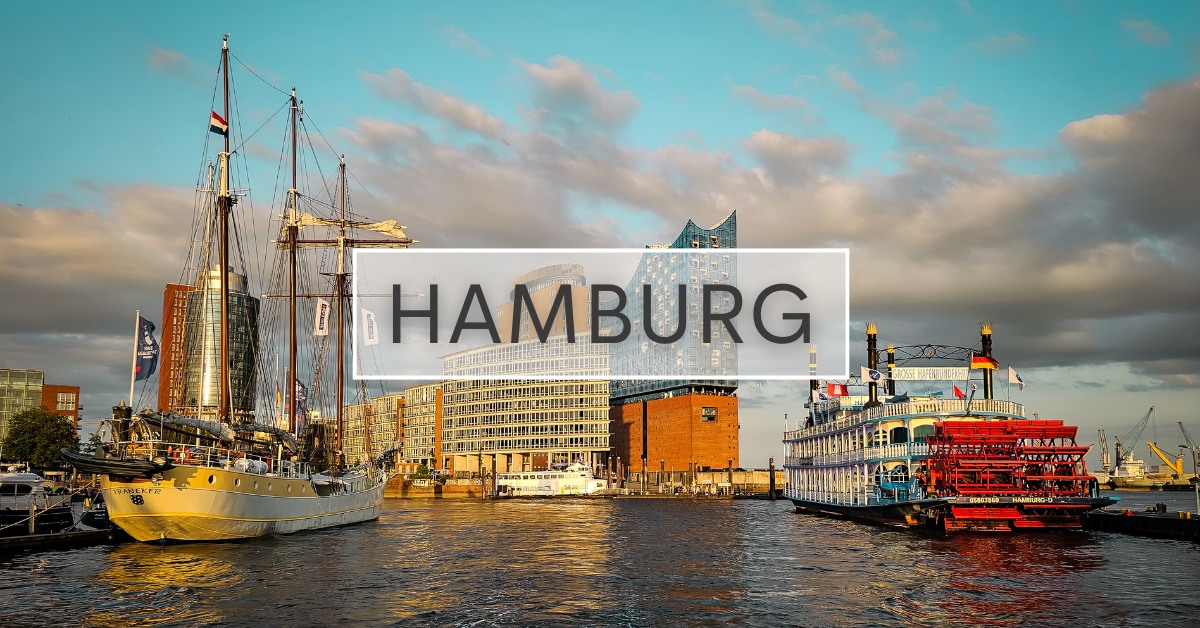
Top Things to do in Stuttgart: More Than Just Fast Cars.

Things To Do in Cologne: A Guide to the City's Best Attractions

Pears, Beans, and Bacon: Birnen, Bohnen, und Speck (from Bremen)

Best Things to do in Rothenburg ob der Tauber

Tour My Germany Affiliate Sign Up

Attractions to See in Dresden: Uncover the Hidden Gems
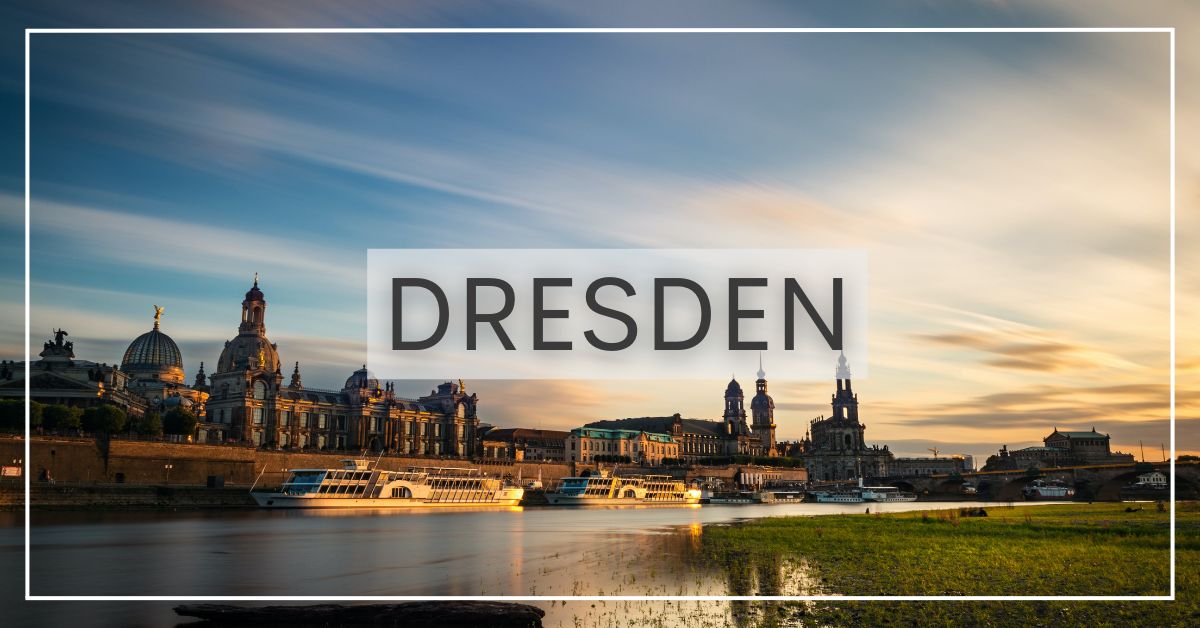
Unique Things to do in Berlin: More than a museum or two.
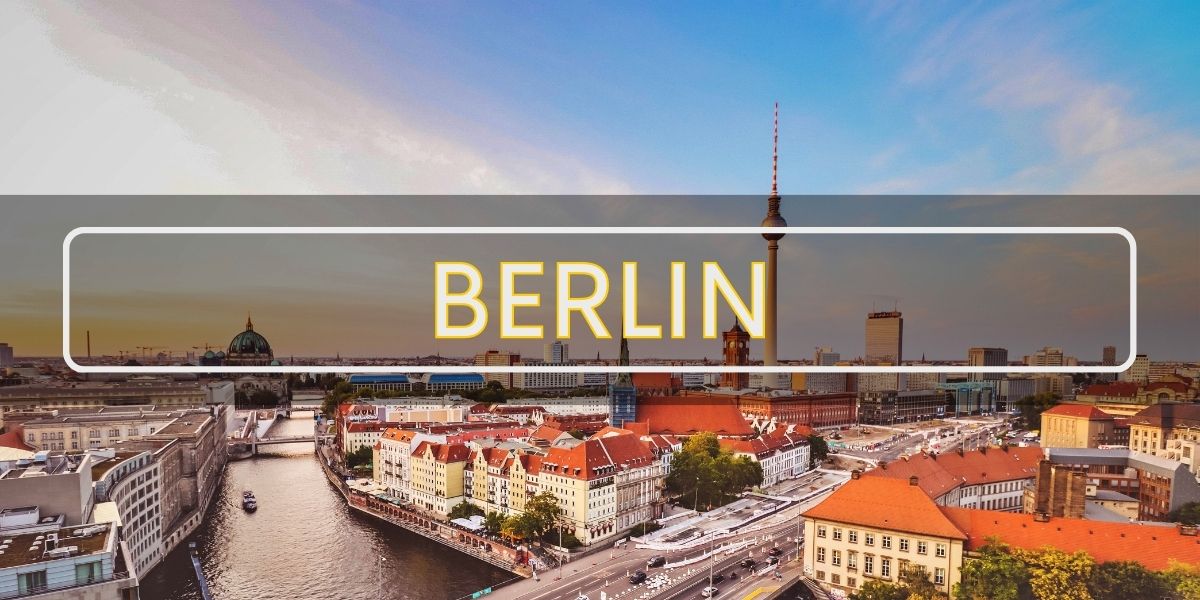
Looking for something different? Use the search in the upper-right corner or go to our sitemap .
Follow us on

Recent Articles
SITEMAP | Privacy Policy | Disclaimer | Terms and Conditions | affiliate program
AFFILIATE DISCLOSURE : Tour My Germany participates in various affiliate advertising to provide a means to earn advertising fees by linking to retail websites. We are a participant in the Amazon Services LLC Associates Program, an affiliate advertising program designed to provide a means for us to earn fees by linking to Amazon.com and affiliated sites. We will not promote products WE do not own or would not buy ourselves. Our goal is to provide you with product information and our own personal opinions or ideas. At times, We will showcase services, programs, and products. We aim to highlight ones that you might find interesting, and if you buy items from those companies, we may get a small share of the revenue from the sale.
We are independently owned, and the opinions expressed here are our own. YOU SHOULD ALWAYS PERFORM DUE DILIGENCE BEFORE BUYING GOODS OR SERVICES ONLINE.

German Culture
Do's and don'ts.
- Try to get straight to the point at hand. Germans generally do not need much small talk to warm up the conversation. They often appreciate it when others are direct.
- Provide sincere answers to serious questions, and avoid introducing humour to lighten a stern conversation.
- When making plans with your German counterparts, make sure to give all relevant details to ensure clarity.
- Expect a German to be open and honest when they disagree with you. They are generally courteous, but are unlikely to deliver their opinion in an indirect way through ambiguous hints and understatements.
- Try not to take personal offence if a German informs you of a mistake you made. They would generally expect you to do the same for them in order to help each other improve and grow as an individual in all aspects of life.
- Ask a German’s permission before taking a picture or video of them.
- Exercise discretion when discussing the arrival and settlement of refugees and migrants in Germany, and be aware that you may not be able to presume somebody’s position or education on the matter. Avoid making comparisons with Australia’s migration as it occurs under a different context and scale. See Demographic Changes under Core Concepts for more on this.
- Approach conversations about the World Wars and the Cold War sensitively. Most Germans are open to discussing their history. However, some may prefer not to revisit the past, while others may simply be tired of speaking about it.
Don'ts
- Avoid shouting across rooms or drawing attention to yourself in public. Unruly behaviour may be viewed as a lack of self-control.
- Do not press a German to revise their decision on a matter if they have already given you their response. For example, insisting that they do something after they have already politely declined can be seen as intrusive, even if it is coming from a good place (e.g. asking them to accompany you somewhere or help themselves to more food).
- Avoid cancelling on a German at the last minute or being late. If you anticipate delays, give your German counterpart a fair warning of your tardiness.
- Avoid clouding what you mean out of modesty or shyness. Germans prefer straightforward honest answers to questions. Directness and clarity is highly valued.
- Do not talk about the actions of the Germans in the World Wars as if your German counterpart was there. For example, avoid saying “ You Germans did this.. .” as if they need to claim personal responsibility. Your German counterpart was likely born after these events and had no part in them.
- Never compare a German to Hitler or the Nazis of World War II or express anti-Semitic sentiments (even jokingly). There is a strong policy against Nazi symbolism and hate speech.
- Do not refer to the era of the Third Reich as “Nazi Germany”. That is not what it was called.
Get a downloadable PDF that you can share, print and read.
Grow and manage diverse workforces, markets and communities with our new platform

The Dos and Don\’ts of Saying Hello in Germany
In German culture, greetings hold a significant importance. They are not just a formality, but a way to show respect and establish a connection with others. Saying hello in Germany is the first step towards building relationships, whether it is in a professional or personal setting. Making a good first impression is crucial, as it sets the tone for future interactions. Therefore, understanding the do’s and don’ts of greetings in Germany is essential for anyone looking to navigate the social landscape of this country.
Do: Use Formal Greetings in Professional Settings
In professional settings, it is important to use formal greetings in Germany. This shows respect and professionalism towards your colleagues or superiors. The most common formal greeting is “Guten Tag” which means “Good day” in English. It is appropriate to use this greeting when entering a workplace or meeting someone for the first time in a professional context. Another formal greeting that can be used is “Sehr geehrte(r)” which translates to “Dear” in English. This is typically used when addressing someone in writing, such as in an email or letter.
Using formal greetings in professional settings is important because it sets the tone for the entire interaction. It shows that you are respectful and take the situation seriously. By using these formal greetings, you are demonstrating your understanding of German culture and your willingness to adhere to its norms. This can help you establish a positive reputation and build strong professional relationships.
Don’t: Use Informal Greetings with Strangers
While informal greetings are common among friends and family in Germany, they should be avoided when interacting with strangers or in formal settings. Informal greetings such as “Hallo” or “Hi” are considered too casual and may be seen as disrespectful or unprofessional. It is important to maintain a level of formality when meeting someone for the first time or in a professional environment.
Using informal greetings with strangers can create a negative impression and may be perceived as rude or unprofessional. It is best to err on the side of caution and use formal greetings until you have established a more familiar relationship with the person. This shows that you respect their boundaries and are aware of the cultural norms in Germany.
Do: Make Eye Contact and Smile
In Germany, making eye contact and smiling during greetings is highly valued. Eye contact is seen as a sign of respect and attentiveness, while a smile conveys warmth and friendliness. When saying hello to someone in Germany, it is important to make direct eye contact and offer a genuine smile.
Making eye contact and smiling during greetings helps to establish a connection with the other person. It shows that you are engaged in the interaction and interested in getting to know them. This can help to create a positive first impression and set the tone for a friendly and open conversation.
Don’t: Hug or Touch People You Just Met
In German culture, personal space is highly respected. It is important to avoid hugging or touching people you have just met, as this can be seen as invasive or inappropriate. Germans value their personal space and prefer to keep a certain distance from others, especially in formal or professional settings.
Respecting personal space during greetings is crucial in Germany. It shows that you understand and respect the cultural norms of the country. By keeping a respectful distance and refraining from physical contact, you are demonstrating your awareness of boundaries and your willingness to adhere to them.
Do: Address People by their Last Name and Title
In Germany, it is customary to address people by their last name and title, especially in formal or professional settings. This shows respect and acknowledges their position or status. For example, if someone’s last name is Müller and they hold the title of “Herr” (Mr.), it would be appropriate to address them as “Herr Müller.”
Addressing people by their last name and title is important because it demonstrates your understanding of the hierarchical structure in German society. It shows that you are aware of the person’s position and are willing to show them the appropriate level of respect. This can help to establish a positive and professional relationship.
Don’t: Use Familiar Forms of Address with People You Don’t Know Well
Using familiar forms of address, such as using someone’s first name or a diminutive form, should be avoided when interacting with people you don’t know well in Germany. This is considered too casual and may be seen as disrespectful or presumptuous. It is best to use formal forms of address until you have established a more familiar relationship with the person.
Using familiar forms of address with people you don’t know well can create a negative impression and may be perceived as rude or unprofessional. It is important to show respect and maintain a level of formality until you have been given permission to use more familiar terms.
Do: Shake Hands Firmly and Briefly
In Germany, shaking hands is the most common form of greeting. When shaking hands, it is important to do so firmly and briefly. A firm handshake shows confidence and strength, while a brief handshake shows respect for the other person’s time.
Shaking hands firmly and briefly is important because it conveys professionalism and respect. It shows that you are confident and assertive, while also being mindful of the other person’s boundaries. By mastering the art of a firm and brief handshake, you can make a positive first impression and set the tone for a successful interaction.
Don’t: Shake Hands for Too Long or Too Weakly
Shaking hands for too long or too weakly can create a negative impression in Germany. A weak handshake may be seen as lacking confidence or assertiveness, while a prolonged handshake may be seen as intrusive or inappropriate. It is important to find the right balance and shake hands with the appropriate amount of strength and duration.
A weak or prolonged handshake can give the impression that you are unsure of yourself or that you are not taking the interaction seriously. It is important to practice and perfect your handshake technique to ensure that you are conveying the right message and making a positive first impression.
Do: Learn Basic German Greetings and Phrases
Learning basic German greetings and phrases is essential for anyone looking to navigate the social landscape of Germany. It shows respect for the local culture and makes it easier to communicate with others. Some basic German greetings and phrases include:
– Guten Morgen: Good morning – Guten Tag: Good day – Guten Abend: Good evening – Wie geht es Ihnen?: How are you? – Danke: Thank you – Auf Wiedersehen: Goodbye
By learning these basic greetings and phrases, you can show that you are making an effort to connect with others and understand their culture. This can help to establish a positive rapport and make your interactions more enjoyable.
Mastering the Art of Saying Hello in Germany
Mastering the art of saying hello in Germany is essential for anyone looking to navigate the social landscape of this country. Greetings hold a significant importance in German culture, as they are a way to show respect and establish connections with others. By following the do’s and don’ts outlined in this article, you can make a positive first impression and build strong relationships.
In summary, it is important to use formal greetings in professional settings, avoid using informal greetings with strangers, make eye contact and smile, respect personal space, address people by their last name and title, shake hands firmly and briefly, and learn basic German greetings and phrases. By practicing these guidelines, you can master the art of saying hello in Germany and navigate social interactions with confidence and respect. So go ahead, practice and embrace the cultural nuances of greetings in Germany, and watch as your connections flourish.
Do you have questions about Germany? then contact us by using our Contact Me page. Checkout more posts by us on our Blog .
Similar Posts
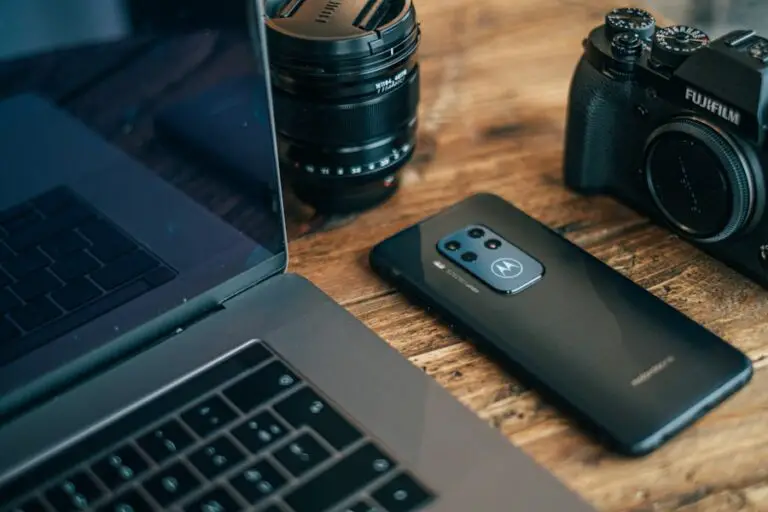
Why Ottonova is Disrupting the Health Insurance Industry
Ottonova is a German health insurance company that aims to revolutionize the health insurance industry. Founded in 2017,…

Pregnancy and Maternity Care in Germany: What to Expect
Germany is known for its exceptional healthcare system, and when it comes to pregnancy and maternity care, the…

The best time to visit Germany for fewer crowds
Germany is a popular tourist destination known for its rich history, stunning landscapes, and vibrant cities. However, beyond…

Breaking Down the Language Barrier: How to Say Good Morning in Germany Like a Pro
Language is a powerful tool that allows us to communicate and connect with people from different cultures and…
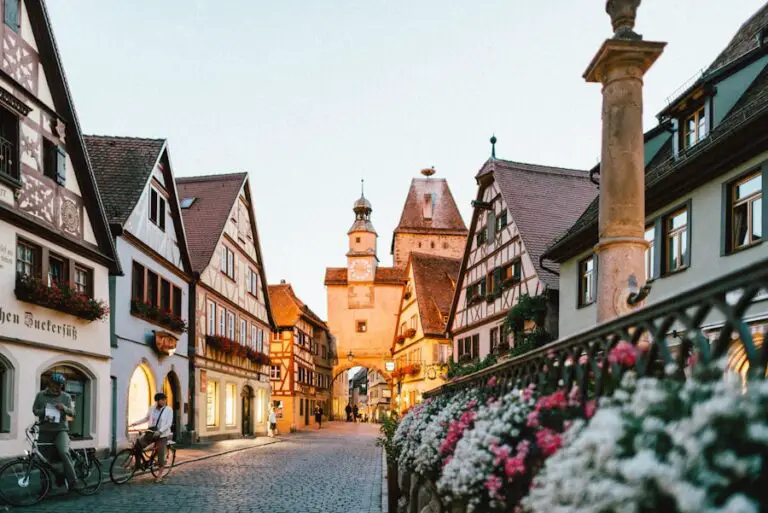
From Maternity to Paternity: Understanding Parental Leave for Both Parents in Germany
Parental leave is a crucial aspect of work-life balance and gender equality in Germany. It allows parents to…
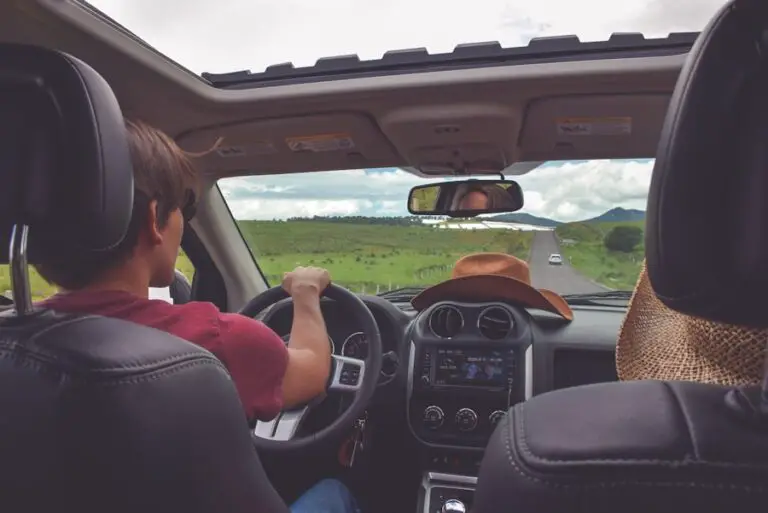
The Ultimate Guide to Obtaining a German Driving License: Tips and Tricks
Having a German driving license is essential for anyone living in Germany, whether you are a resident or…
Leave a Reply Cancel reply
Your email address will not be published. Required fields are marked *
Save my name, email, and website in this browser for the next time I comment.

TRAVEL SAFETY DOS AND DON’TS: AN EXPERT’S GUIDE TO AVOIDING ILLNESS, INJURY AND THEFT WHILE TRAVELING
Ask people what are some of the top travel safety dos and don’ts and the answers might surprise you. Some will say terrorist attacks. In fact, according to NBC News, you are more likely to choke on food, die from being buried alive, or being struck by lightning than you are to be involved in a terrorist attack.
Others will say car accidents. That’s getting close, but still not exactly correct.
This post is written by someone who DID NOT avoid illness, injury or theft while traveling. So, learn from my mistakes.
I recently had the opportunity to speak with James Page, Senior Vice President, Chief Administrative Officer and Head of Assistance and Claims of AIG Travel* and an expert on the dos and don’ts while traveling.
Mr. Page shared a wealth of information on the top causes of injury and illness while traveling and how to avoid them along with other travel safety tips.
During my lifetime of travel, I’ve seen – and experienced – many such examples. I share a few here, interspersed with Mr. Page’s advice.
It turns out, the single most common cause of injury while traveling is poor judgment , and poor judgment manifests itself in many ways.
Top Travel Safety Dos and Don’ts
Table of Contents
Don’t think you’re superwoman (or superman).
Believing that you can just jump on any vehicle and tour a new location without any proper instruction is the number one activity that causes injuries while traveling.
You know what I’m talking about; the cool scooter tours in Vietnam, the jet skis in Cancun or, in my unbelievably dumb judgment, the whitewater rafting trip down the Zambezi where I almost drowned.
Understand the vehicle you are maneuvering and know the route. Wear protective gear. Secure proper instruction or don’t do it.

Use alcohol wisely
Of all the travel safety dos and don’ts, alcohol-related ones are the most obvious.
Now here is a lethal cocktail; excessive alcohol and poor judgment. As a wine lover myself, far be it from me to eschew a glass of sauvignon blanc, but overindulge, especially while traveling and you’re looking for trouble.
The second most common reason for injury like falling off balconies, decks, ships or horses are frequently linked to alcohol consumption.
Know your limits!
The third top cause of injury while traveling is something that we’re all at least a little guilty of…venturing beyond our physical limits. In other words, know your limits and stay within them.
If you are out of breath after climbing a flight of stairs, you probably shouldn’t hike to Everest base camp. If your knee hurts while walking the dog, it’s going to hurt a lot more hiking the Appalachian Trail. Know your limits when considering the travel safety dos and don’ts.
Beware the transfer trauma
Here is one that surprised me. Transfer traumas! What’s a transfer trauma? It’s when you step off a bus, train or ferry, if you don’t watch where you place your foot, you can experience a nasty fall. I can see that. Think about it.
Ever try getting off a subway train with those huge gaps to the platform? I’m surprised these injuries are not higher up on the list.
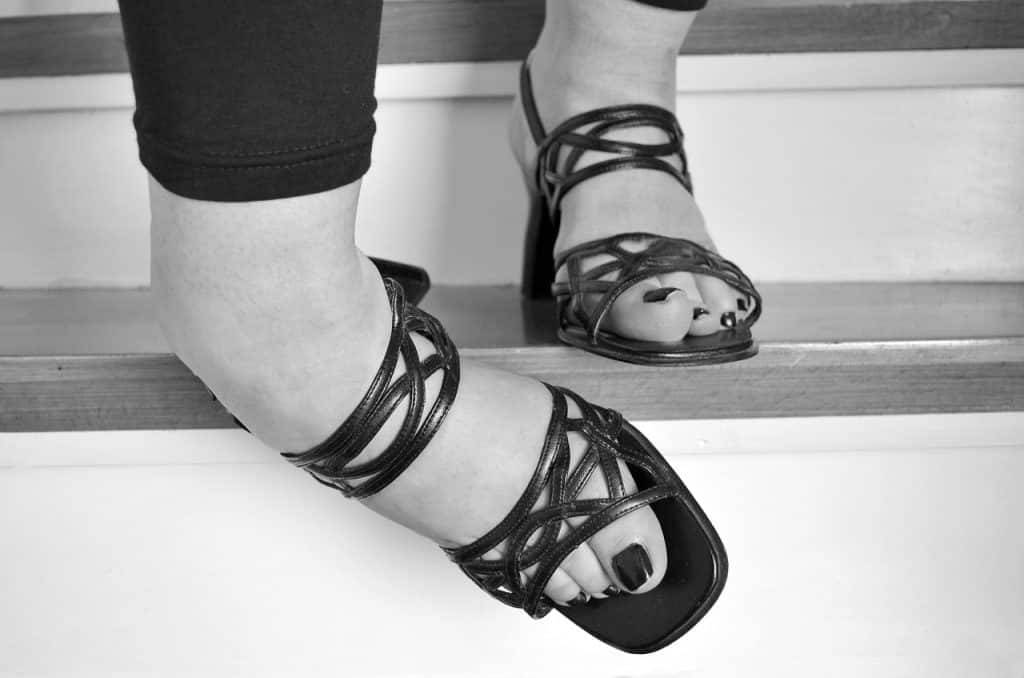
Don’t feed the animals
Here is one of the classic causes of injury while traveling; mishaps when approaching animals. Been there, done that (I’m raising my hand). I am guilty of one of the biggest travel safety DON’TS… feeding the monkeys.
In my defense I will say that the monkeys I fed were really cute. Look at these guys! Would you have done the same thing? Still. I realize now that’s a bad idea, especially after The Great Monkey Attack of Angkor Wat.

Continue your normal medical routine
I laughed when I read this one. “Medical conditions do not disappear when you are traveling!” Seriously, are you surprised? Your high blood pressure and cholesterol do not magically disappear while you are on vacation.
You still need to take your medications and watch your dietary intake. This is really a major “travel safety DO ” that many travelers ignore,
The mother of all travel safety dos and don’ts: Wash your hands
Wash your hands… a lot. Over and over and over. This little habit grows on you. Something as simple as this can prevent you getting any number of afflictions.
My husband carries around a little container of antiseptic gel and uses it a lot. I made fun of him for years for being overcautious until I read that this is one of the easiest way to avoid illness. This is one of the major DOs in the travel dos and don’ts.
Pay attention!
Travel safety dos and don’t are easy to follow if you pay attention. We’ve all seen videos of people falling into ditches, manholes or escalators while looking at their cellphones. It’s a thing, all right. Watch where you are walking! Store your selfie sticks until you get to wherever you’re going to take your photo. Ignoring standard safety measures to take better photos is an accident waiting to happen.
Consider what you eat.
Eating exotic cuisine, or food you are not used to, is a top cause of illness while traveling. Now, one man’s “exotic” is another man’s daily bread.
I have eaten everything from iguanas, crickets and ant eggs in Mexico, to sheep eyeballs in Mongolia to things too bizarre to mention in Beijing and actually enjoyed (or at least tolerated) everyone of them, but I’ve been doing this all my life.
Do people build up a resistance to weird food? Maybe. But perhaps people who have never encountered exotic or unusual food should pace themselves. It’s not just what the foods are, but how they are prepared that can cause stomach issues.
The last thing you want is stomach issues on a trip. I speak from experience.
Wash fruit before you eat it
I got horribly sick from eating a big, fat, beautiful (but unwashed) peach in Dubrovnik. I was in a hurry to catch the bus to Split. I knew I SHOULD wash that peach, but it looked so appealing. I was running out of time and I was hungry so I bit into it.
Four hours later when I got off the bus I thought I was going to die. I spent the entire visit to Split in my Airbnb projectile vomiting so bad I made “The Exorcist” look tame by comparison.
Washing the peach would have been the easiest travel safety DO to follow.
Like many things related to traveling, you have to weigh the pros and cons. Experimenting with different cuisines is one of the great pleasures of traveling.
Don’t deprive yourself from trying new food because you think you might get sick. But do evaluate the condition of the restaurant. Don’t be shy about asking how the food is prepared. Finally, use your best judgment.
Below are a couple of activities that I can vouch for as being accidents waiting to happen. We all like to try our hand at adventurous and strenuous activities when we travel , sometimes with no prior experience.
Examples include rock climbing, zip-lining, parasailing or my favorite, whitewater rafting. They are all dangerous but they are SO MUCH FUN!! How do you reconcile this?
All I can say is get proper instruction, check weather conditions, make sure you have the proper gear, or don’t do it at all. Jeopardizing your body or your health is not worth it under any circumstances.
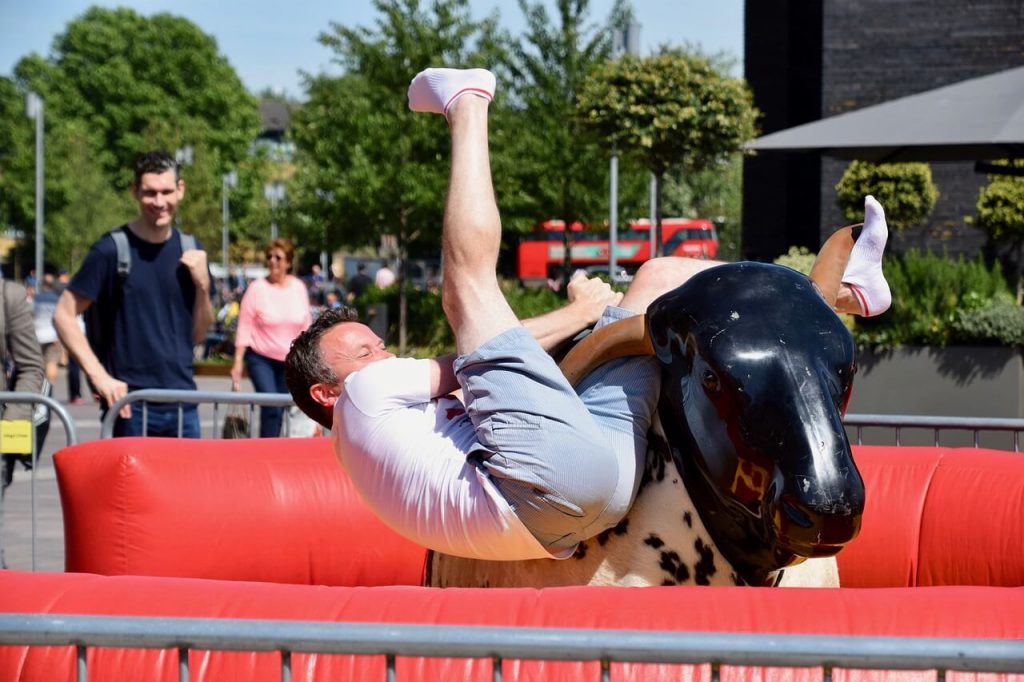
Whether you decide to be foolish or prudent while traveling, always, always, always get travel insurance because seriously guys, you never know.
What surprised me about these safety dos and don’ts of traveling is how simple it is to follow them. It’s all common sense and sober (pun intended) judgment. A little preplanning goes a long way towards safe travels.
- * As Senior Vice President, Chief Administrative Officer and Head of Assistance and Claims of AIG Travel, James Page has global responsibility for the AIG Travel Operations and Assistance Services. Previously, he was President of AIG Travel Assist, Inc., and President of American International Assistance Services, Inc. James joined AIG in 2000 and has played an integral role in the development and growth of the assistance business and call center operations worldwide.
What do everyday frequent travelers do to stay safe while traveling ? We asked a few frequent travelers to give us a list of their travel safety dos and don’ts . The answers may surprise you. Check out these valuable travel safety tips.
A couple of good travel safety dos and don’ts can make all the difference between a great hassle-free trip and getting ripped off.
Travel Safety Dos and Don’ts from Frequent Travelers
Sew secret pockets into your clothes.
Find a seamstress to sew secret pockets inside of your favorite travel pants (or do it yourself if you’re crafty). That way, you can hide your phone, passport, or wads of cash whenever you’re passing through sketchy areas.
You wouldn’t believe the freedom and peace of mind this brings—even if nothing bad ever happens!
If you want to take it a step further, you can hide your valuables in your secret pocket while carrying a fake wallet and cheap Nokia phone in your normal pockets. This way, you’ll have something to hand over if you get robbed.
The reality is, most thieves aren’t going to believe you’re walking around without a phone or wallet. And if they do, it might piss them off (something you’re best off avoiding).
Tip: Before sewing everything together, make sure your valuables (passport, phone, money and cards) fit inside. The idea is for the pocket to be as low-profile as possible so there are no noticeable bulges anywhere.
Lastly, I wouldn’t recommend storing anything in these pockets when you’re going through airports. If security decides to pat you down, they might find your secret pockets a bit suspicious.
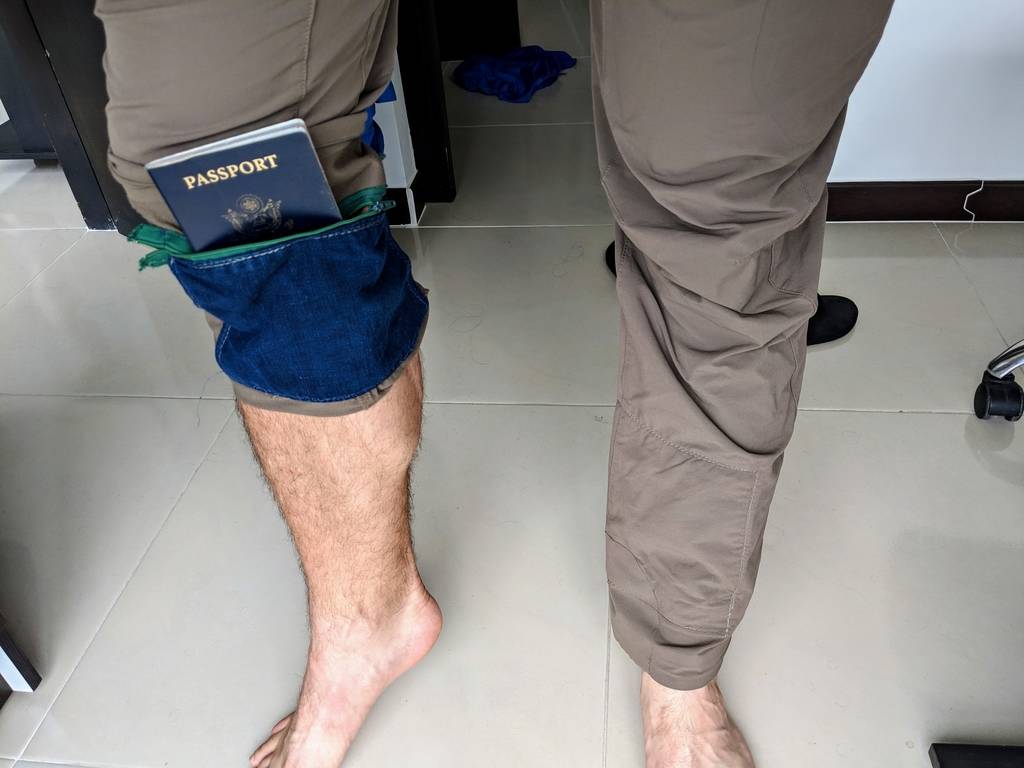
Mitch Glass blogs at Project Untethered .
Make copies of your ID and passport
You never know when your passport or ID might get stolen or misplaced. By making two copies, you can give one to a friend or relative and keep the other with you while you travel.
If you’re a U.S. citizen or national traveling abroad, you can enroll in the Smart Traveler Program for free for an added level of travel safety. If you are abroad, you can enroll at the nearest U.S. Embassy or Consulate, which can assist you if you lose or have your passport stolen.

Stymie pickpockets
Pickpockets are an inevitable hazard while traveling. You’ll find them and travel scams in all big, bustling cities throughout the world.
You’ll find pickpockets anywhere tourists congregate and transmit the fact that they are tourists by reading maps in the street, carrying prominently displayed camera equipment, using their phones in public or staring up at skyscrapers with mouth agape.
Pickpockets are increasingly sophisticated and we must be equally adept at stopping them. Here’s how.
Use a money belt, ankle belt or some other accessory to keep a large part of your valuables while traveling
Don’t keep all your money in one location. Split it up; wallet, money belt, other hidden location.
Know where pickpockets congregate; metro, train and bus stations, airports, entertainment venues, any crowded location.
Be alert to any commotion which can frequently be a diversion to pickpocket you.
Don’t display valuables; jewelry, electronic devices, cash, wallet.
There are so many other ways to stymie pickpockets.
Perhaps the best DO of the dos and don’t while traveling is just being alert and acknowledging to yourself that this can happen is a good start.
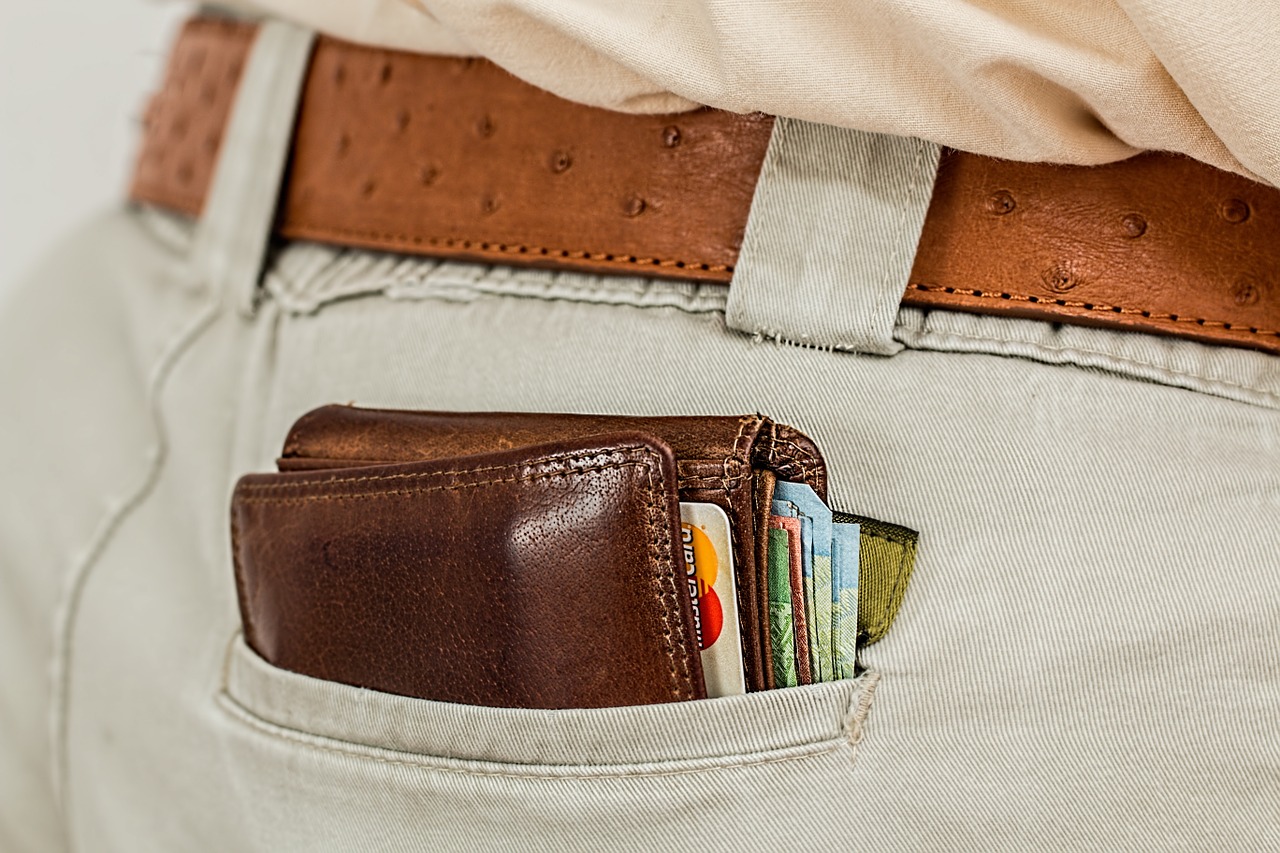
Talek blogs at Travels With Talek
Travel with a dog
My rescue dog Annie is a wonderful travel companion. She never complains about my choice of music on the car stereo, she is always happy to go out hiking (even if it is raining) and she never complains about where we stay the night, as long as she is by my side she is happy!
She also helps me to feel safer when I am visiting new places as a solo female traveller. Okay, she is no guard dog, she doesn’t actually have an aggressive bone in her body, and I don’t travel with her for safety reasons but that doesn’t stop me feeling like she is an extra layer of security.
She does alarm bark and I imagine pick pockets may be less likely to approach someone with a dog by their side!

Gemma blogs at A Girl and Her Dog on the Road .
Don’t draw attention to yourself
One of our favorite travel safety tips is trying to blend in. If you look like you’re from out of town, you are a much bigger target for crime.
Blend in as much as you can by wearing inconspicuous clothing and only looking at maps when necessary. It’s also a good idea to be careful about who you ask for directions so that someone doesn’t take advantage of you.
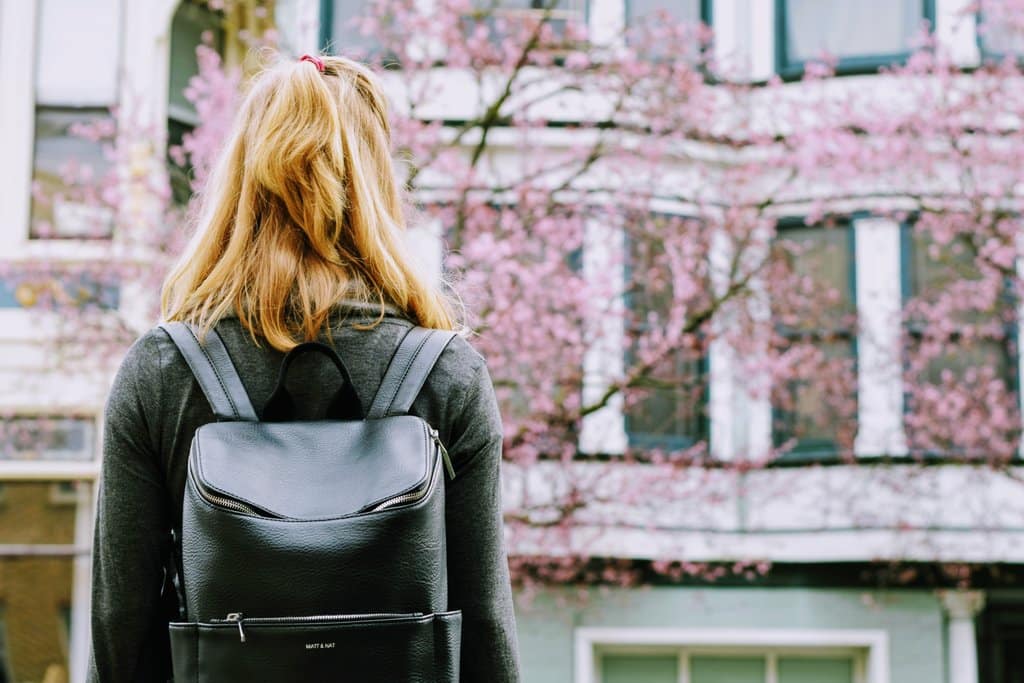
Travel dos and don’t to t ake precautions to avoid theft
Losing my valuables is one of my biggest worries while travelling. As a blogger, I travel with expensive camera equipment, along with regular valuables like cash and passports. To avoid my fears coming true, here are some tips I use to keep valuables safe:
Lock everything up that you don’t need while you’re out exploring. Most hostels and hotels have lock boxes inside the rooms where you can store your valuables. If the room doesn’t have a lockbox, you can ask the front desk to store your valuables in the lockbox there.
When locking away valuables, be sure to use your own locks. Often the locks provided by hotels can be cheap and easily broken into. I bring two locks with me while travelling: one for storing my belongings at the hotel, and another to carry with me.
When I take any valuables out with me, especially in populated areas, I lock my bag to deter anyone who might try to pickpocket me. As an extra precaution, I carry my bag in front of me in crowded areas.
Try to avoid having your valuables show in public. I once had someone grab my iPhone right out of my hand!
Last but not least, purchase travel insurance that covers theft of personal belongings. This brings peace of mind that even if something unfortunate happens, you will at least get reimbursed for the monetary value of the items.
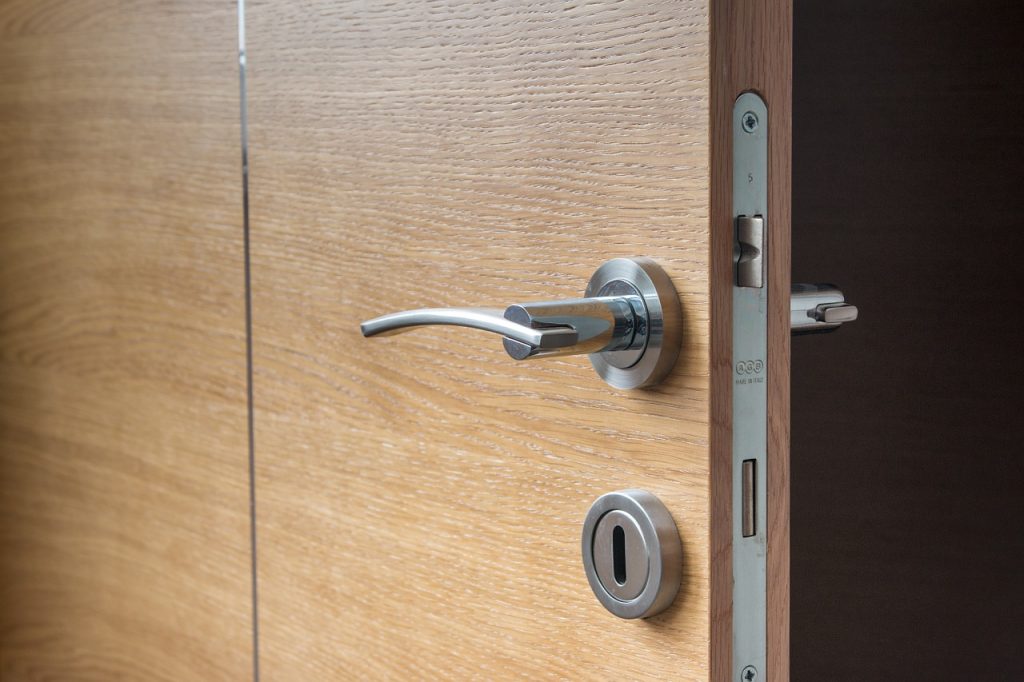
Lora Pope blogs at Explore with Lora .
Don’t trust public WiFi
Another way to stay safe while traveling is avoiding public WiFi when you travel. Why? Using it makes it very easy for hackers to steal your personal information, like credit card numbers. This travel safety tip has become increasingly important.
To protect your identity, you can always sign up for something called a VPN (virtual private network) that will allow you to securely connect to the Internet.
You can also get a portable router to set up your own WiFi hotspot. It will allow you to convert any wired connection, say in your hotel room, to a secure wireless one.
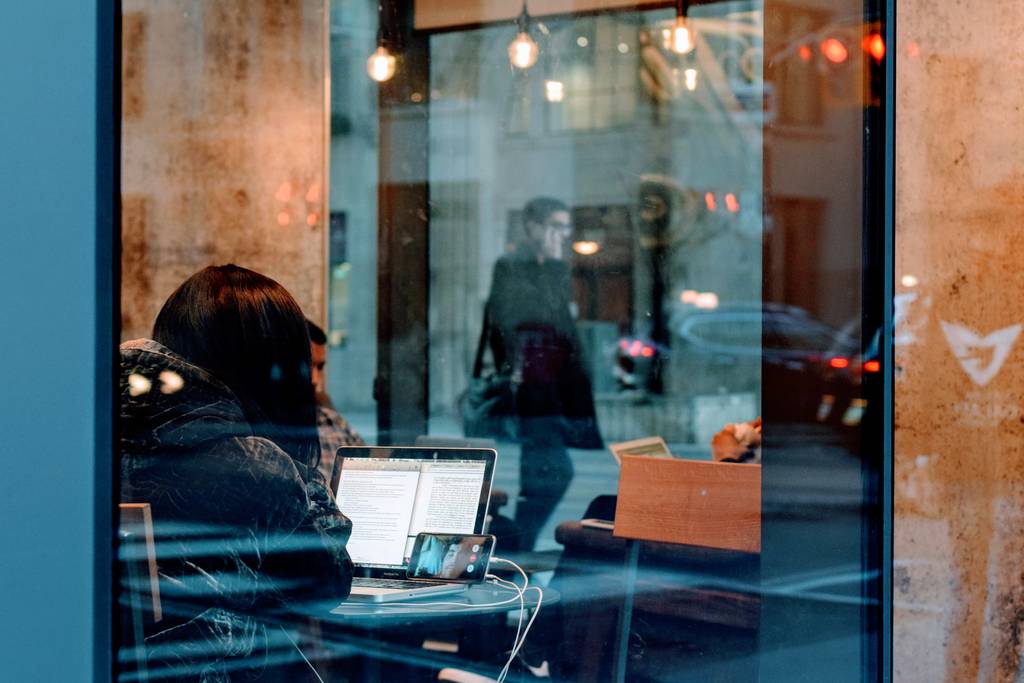
Always bring snacks and drinks for emergencies
When on the road, travelers often find themselves needing to take long bus rides. Whether the trip is three hours or a long-haul overnight ride, I always recommend bringing bus snacks and drinks in case of emergency.
You just never know when you’ll be stuck somewhere for long hours if an unexpected event happens on your ride. I’ve been in situations where buses and trains that were supposed to take only four hours lasted up to eight, and I’ve seen people get stuck for ten hours in traffic jams.
This is especially common in developing countries or places where the roads are two-lane mountain roads. Even in situations where you would normally expect to stop, you may find yourself without the right currency to make a purchase.
My recommendation is to bring a bottle of water or two, and enough snacks that you can go at least two meals without a problem. Hopefully you won’t end up needing these, but you need to always be prepared when circumstances would otherwise be out of your control.
You also need to pack these inside of your carry on so that they aren’t visible. There are some bus companies that do not allow food and drink. In this situation, you would only be busting them out in case of emergency. But better safe than sorry, and if they see them they may force you to throw them out.
Great bus snacks are anything that comes pre-packaged and won’t cause an annoying smell for other passengers or make a mess for the driver. And of course, always clean up after yourself before you go.

Stephanie Craig blogs at Sofia Adventures .
Password-protect phones and add tracking tools
Our smartphones store so much personal information, such as emails, credit card information, and bank accounts. By adding a passcode to your phone, it makes it very difficult for a thief to open your phone and steal your sensitive information.
Some phones offer fingerprint IDs and face recognition, adding an extra layer of security for when you travel.
You should also turn on location tracking and install software that will wipe your phone so that you can track it down or destroy all of your data if it’s ever stolen when you’re traveling.
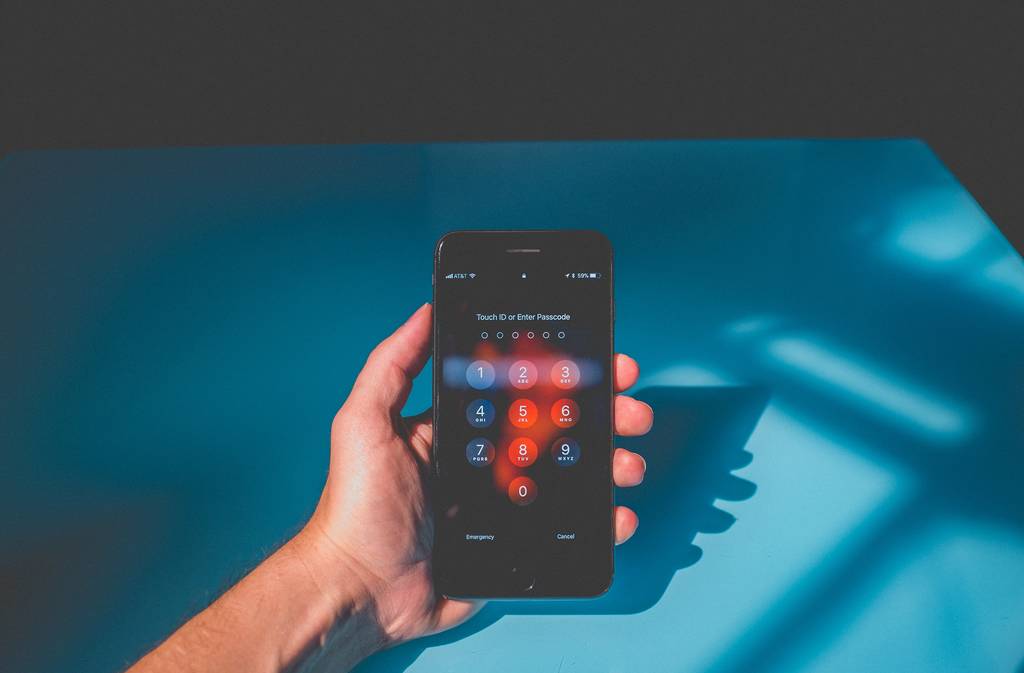
Travel with a Pacsafe
In the world where safety is not guaranteed everywhere we travel to, keeping yourself and your valuables safe is paramount. But how do you make sure that you don’t fall a victim to the country’s insecurity? My all-time favorite tip to keep my items safe is to always carry a Pacsafe or the most appropriate Pacsafe product for your needs.
Commonly known as an anti-theft travel product, a Pacsafe will guarantee the safety of your valuable items you might have traveled with. (Although it’s not advisable to travel with valuable items, sometimes you just have to travel with your really expensive camera to capture the best moments)
Regardless of how secure your hotel might seem like, a Pacsafe is a must-have to lock away your valuables, passport, and some extra cash. (The amount of items you can keep in a Pacsafe depends on its size, so remember to purchase a Pacsafe size that suits your needs).
A Pacsafe comes with a wire which you can fasten around the hotel chair or bed. Although it is unlikely that someone would break into your hotel room, it is better to take precautions rather than being sorry.
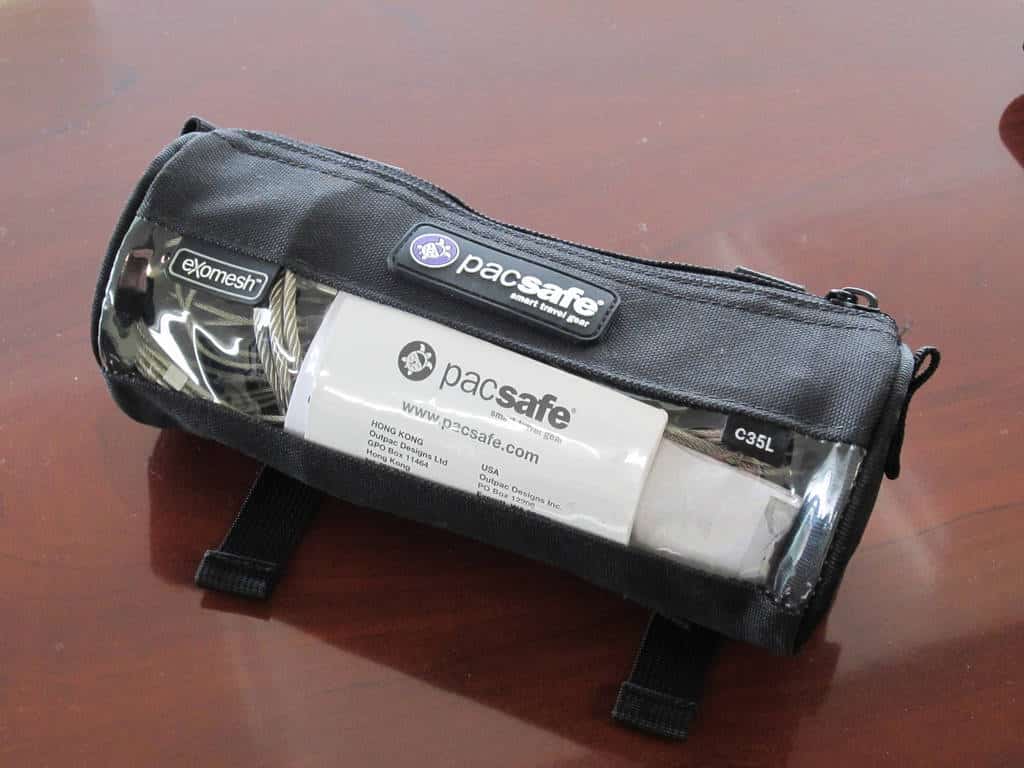
Esther Namugerwa blogs at The Adventurous Feet .
Learn about your destination before your trip
Part of the excitement about travel is the planning! So while you are researching the best places to stay and eat and your bucket list activities, take a look at the travel safety information for where you’re headed. How safe are your accommodations?
Are there any local health issues you need to concern yourself with? What will be your main mode of transportation? Which neighborhoods are the safest, and which should you avoid?
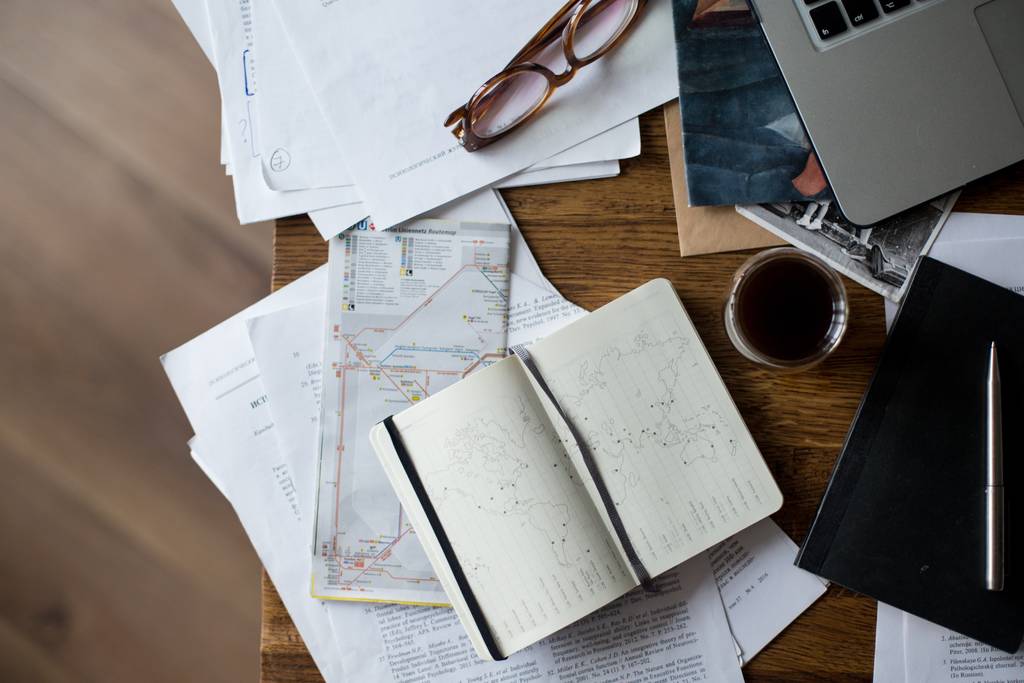
An underrated travel safety tip: The importance of proper sleep technique.
We know one of the most important dos of the dos and don’t while traveling is being alert. Not getting enough sleep while you travel can lead to not paying enough attention to your surroundings and bad judgement.
Of course this can also make you groggy and sluggish when you want to be alert to enjoy your vacation.
Whether you’re traveling a few hours from home or across the country, sleeping away from home can be a challenge. Yet, you need to sleep to enjoy your travels.
Sleep keeps your immune system strong, clarifies your thinking, and stabilizes your appetite and metabolism. That’s going to give you the energy to do all you’ve got planned. Here are a few ways you can sleep better when you’re on the road.
To better understand the effects of sleeplessness, I spoke to Alicia Sanchez, a researcher for the sleep science hub Tuck.com with a specialty in health and wellness. Her suggestions follow.

Adjust Your Sleep Schedule in Advance
If you’re only traveling one or two time zones, you can probably move on to the next tip. However, if you’ll be three, four, or more time zones away, shifting your sleep schedule can alleviate jet lag .
Start by moving your bedtime and wake up times 15 to 30 minutes closer to your planned bed and wake up times at your destination. This method is also more helpful if you’ll be in your location for longer than a week. Otherwise, by the time you get adjusted, it’s time to return home.
Bring a Piece of Home with You
Your body reacts to environmental signals. Bringing a few things from home that you normally use in your bedroom or in your bedtime routine can prepare your brain for sleep. A pillow or blanket that smells like home reminds your brain what to do at bedtime.
For some people, it could be bringing along their favorite pair of slippers. If you usually burn a candle in the evening, bring it along. Look for small items that can help your travel destination feel, sound, and smell more like home.
Create the Right Sleep Environment
You could be fighting unfamiliar sounds and smells along with jet lag. To help you sleep well while traveling, try to create a healthy sleep environment from the very beginning—one that’s cool, dark, and quiet.
Your body temperature drops at the onset of sleep and continues to fluctuate throughout the night until it starts to rise again near morning. Lower the room temperature to somewhere between 60 to 68 degrees to support your body’s nighttime needs.
Quiet can be hard to find if you’re visiting family or at an urban destination. Try bringing along a white noise machine. White noise contains a combination of all noises, which drowns out other sounds.
Limited space in your suitcase? Download a white noise app. Most apps have several noises to choose from, including nature sounds, the hum of an airplane cabin, the whir of a hairdryer, and the tumble of a clothes dryer.
Light can also be a major sleep disrupter. At home, you can install blackout curtains or heavy drapes, but you don’t have that option on the road. Close the curtains, draw the blinds, and do what you can to keep light out at night.
If you’re not sure what kind of accommodations you’ll have, pack a sleep mask. You might want to try it out before you go to make sure you’ll be able to sleep with it on.
Move Your Body and Get Outside
Exercising and getting outside are incredibly valuable if you’re suffering from jet lag. You need to stay awake when it’s light outside to help your body adjust to local time.

Your eyes have special photoreceptors that absorb sunlight and send messages to the brain to suppress sleep hormones. What better way to do that than a morning or afternoon walk to help you sleep well while traveling?
Exercise helps you stay awake when you’re sleepy. If you’re traveling far enough from home, it might be beneficial to fill your first day with tours and other scheduled activities, so you keep moving.
You’ll be tempted to nap, but if you’ve got a lunch reservation and a museum tour ahead, you won’t have time for it.
Eat on a Regular Schedule
Light isn’t the only way your body times your sleep cycle. Your eating schedule does too. You may not be able to eat meals at your regular times, but do try to eat them at regular intervals. Doing so can help your body adjust to local time and help you sleep better on the road. Eating on a regular schedule is a key DO in the collection of dos and don’ts while traveling.
Be Consistent Before, During, and After Your Trip
Establish a bedtime routine long before you leave home. Bedtime routines serve two purposes—to trigger the start of the sleep cycle and relax the body before bed. You need both of those when you’re away from home.
If you normally change into your pajamas, brush your teeth, and read a book before falling asleep, your brain will recognize that pattern even when you’re in an unfamiliar bedroom. However, to be effective, you have to have that pattern established long before you leave.
Once you have a pattern, follow it during your trip, and keep it long after so that you’re set for your next adventure.
Travel enriches and feeds the soul. Plan in advance, and make sure to pack a comfort item to help you sleep. Make the effort to get better rest, so you can fully enjoy everything your destination has to offer.
Alicia Sanchez is a researcher for the sleep science hub Tuck.com with a specialty in health and wellness. A Nashville native, Alicia finds the sound of summer storms so soothing that she still sleeps with recorded rain on her white noise machine.
More Travel Safety Dos and Don’ts for a Safe Trip
Register with your Embassy prior to travel. If you are a U.S. citizen, consider enrolling in the Smart Traveler Enrollment Program to download the Smart Traveler app for important emergency information and register with the local embassy. Know the security risk level of your destination.
Ensure your phone is able to make calls to your home country and that you know how to place an emergency call in a foreign countr y
Leave a copy of your passport and itinerary with someone at home who is designated as your emergency contact registered with the embassy.
Confirm if you need any vaccinations before you travel and be educated about the risks of your destination including water, streets, proper gestures, etc.
OMG! Don’t pack medication or medical equipment in your checked baggage. Take your meds on your carry-on with you.
Have your passport with you when you take a cruise, even if you depart from the US. You never know when you will need to disembark due to an emergency and travel home.
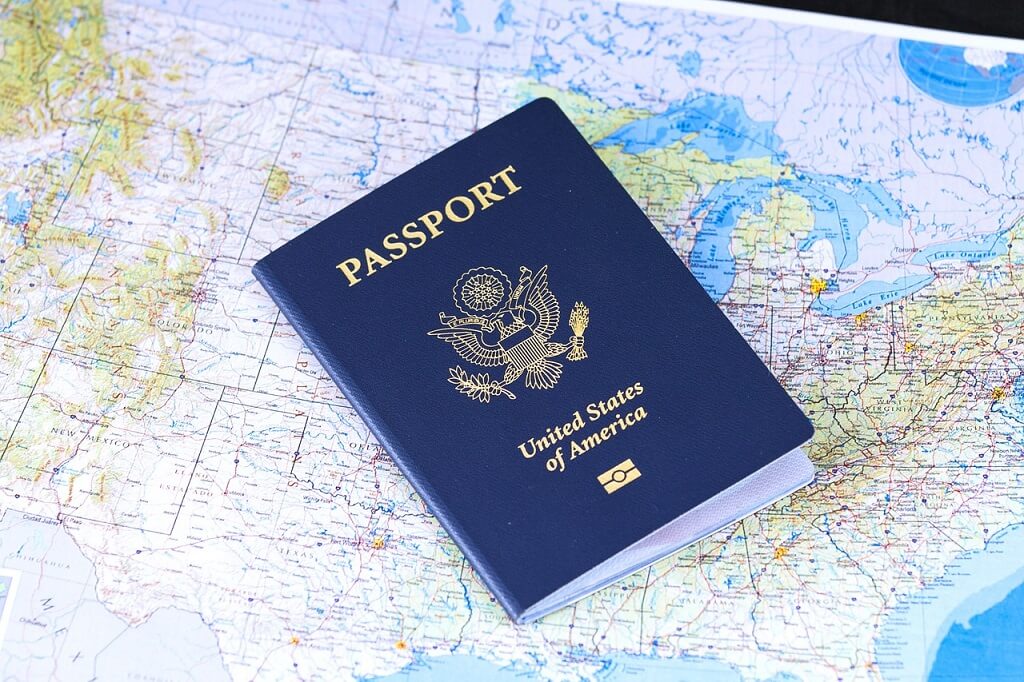
Educate yourself on insurance; does your primary health insurance cover you outside the US? Are you purchasing appropriate coverage for travel insurance based on your destination?
Know how to say a few key words such as “police” and “help” in the language of the country you are visiting.
The same common-sense rules apply overseas. Avoid discussing sensitive topics like politics and religion. People often will give foreigners’ faux-pas some leeway, but then again, they may not.
Don’t forget to carry chargers for your digital devices. Don’t risk running out of batteries in an emergency.
Prepare a list of your emergency contacts including family, friends and coworkers, as well as contact information for insurance and emergency travel assistance. Keep both hard and digital copies.
Activate travel notices with your bank and credit cards ; familiarize yourself with local currency and the closest banks and ATMs.
Here is a selection of travel safety books for your reference. What are your favorite travel safety dos and don’ts ? Let us know in the comments.

If you like this post, you will enjoy these other articles with essential travel safety dos and don’ts for your next trip:
- True Confessions of a Travel Addict
- Nomadic Matt Shares His Favorite Travel Tips
What are your favorite travel safety dos and don’ts? Let us know in the comments.
Updated February 10, 2023

BTW, if you are getting ready for your trip, make sure to take advantage of these useful, money-saving links to book your trip:
- Research and book your flight with Skyscanner . I have found them to be the best because they list all airlines including the budget ones. You are always sure of having researched all options.
- For car rental around the world, Discover Cars has flexible pickup and drop-off options, I recommend Discover Cars .
- Book your accommodation with Booking.com . I find they have a wide selection and a nice, user-friendly, transparent website.
- Protect your trip and, more importantly, protect yourself with travel insurance. I use Travelinsurance.com and have been very happy with them.
- Looking for a small group tour to unforgettable destinations with top professionals? Intrepid Trave l is your choice.
- For more general tours to any destination or attraction, book with Viator . Check them out.
- Need a visa? Get your visa for all countries with Passport Visa Exp ress.
- Looking for a cool walking tour to explore a city? My favorite walking tours are offered by Take Walks.
- Food and drink tours are the best way to enjoy a city. And Devour Tours are my favorite.
- Looking for a good VPN to protect your security, privacy and freedom online while traveling? Nordvpn is your best option.
- The best and most economical way to stay connected while traveling is with an Airalo eSIM.
I personally use, and can recommend, all the companies listed here and elsewhere on my blog. By booking through these sites, the small commission we earn – at no cost to you – helps us maintain this site so we can continue to offer our readers valuable travel tips and advice.
Talek Nantes
8 thoughts on “travel safety dos and don’ts: an expert’s guide to avoiding illness, injury and theft while traveling”.
This is an informative article. All of the above information is important to know while traveling. Thanks, travelswithtalek.com for sharing this article.
Thank you so mush for your kind comments. I am glad this post was useful.
It is a really really nice valuable travel tip and advice. Thank you for the article.
Thanks! I’m glad you found it helpful.
I just returned from Rwanda and Zanzibar and followed most of your Do’s and Don’t for safe and healthy traveling. I am a seasoned traveler, but made the mistake of thinking that I was more fit than I was when Gorilla trekking in Volcanoes National Park. The altitude affected my breathing and the step terrain with muddy conditions slowed my accent so that I was holding up my group who was always waiting for me to catch up. It was a once in a lifetime experience, but I doubt that I would attempt the trek if I had known how difficult it was going to be. Know your limits is now on top of my list!
Hi, Christine: Yes, I hear you! Been there too (not to Zanzibar, but over-exerted.) One suggestion is to travel with a group of people your age so everyone is more or less at a similar pace. Ruanda and Zanzibar are on my bucket list. Thank you for sharing and commenting. Talek
Leave a Comment Cancel Reply
Your email address will not be published. Required fields are marked *
This site uses Akismet to reduce spam. Learn how your comment data is processed .

Disclosure: As an Amazon Associate I may earn from qualifying purchases. Posts may contain affiliate links. If you click on one of them, we may receive a commission at no cost to you.

JOIN OUR NEWSLETTER

Lets Connect
Privacy policy.

IMAGES
VIDEO
COMMENTS
Making noise. Life creates noise. Everywhere and even in Germany. Here, however, noise has fixed office hours. You will make yourself very unpopular if you mow the lawn, use your electric drill or invite your 16-year-old nephew's heavy metal band to practice between the hours of 10pm and 7am, around lunch time or on Sundays and public holidays.
Do be on Time. Being on time means being early in Germany - there's no harm in sich verfrühen here. The concept of being fashionable late is frowned upon. It wouldn't be an exaggeration to say dates, timetables, appointments, and deadlines have the weight of a solemn oath in this country. Being late is equivalent to contract breach.
17 Important Must-Knows Before You Travel in Germany. 1. It's all about that cash money, yo. You might expect Germany, producer of supercars and epic technology to be on board with the whole credit card trend, but this simply isn't the case. I know it's weird, but you'll find that many places in Germany don't actually take credit card ...
This is an informative guide about the Do and Donts in Germany. Also called Deutschland, the country with a remarkable history is a dream destination for many. ... This tip is an essential part of the list of 'Do and Donts in Germany.' Travel: A good travel tip is, while you are out in Germany, ... Another must add, in the 'Do's and Don ...
Be cautious and courteous with signaling. Drive defensively, not aggressively. There are no "arrive first, leave first" crossroads in Germany, only "right side first" crossroads. When parking, pay close attention to the plethora of different parking signs used in Germany. Each has different rules attached.
Drinking. Beer and wine are part of a normal dinner and alcoholic drinks are usually offered to guests. Not drinking, however, is completely accepted. Do not insist on alcoholic drinks if a person has rejected your initial offer and don't order them for them. A German who rejects a drink is not just being shy or polite but does not want to drink.
Published on August 12, 2022 / Updated on February 8, 2024. Facebook. Post. Did you just move to Germany? Here are 10 do's and don'ts in Germany to help you settle in the country and avoid any cultural taboos!
Quiet hours are an important rule to respect when travelers visit Germany. It's unusual to hear of quiet hours if one is coming from a bustling, busy city life. But these hours are a great excuse to, well … do nothing! Time to relax after a busy week. Quiet hours are typically from 10 pm-7 am on weekdays.
Destinations like Berlin, Munich, Hamburg, and Frankfurt all offer something different, from modern architecture and 24/7 nightclubs to historic churches and cobblestone streets. Of course, some of the best places to go in Germany are the smaller cities and towns. Leipzig, for example, is just a short train ride from Berlin.
Having just returned from trips to Berlin and Hamburg, I want to share with you some travel tips for Germany that should make your trip stress free and more enjoyable. Travel Tips For Germany Respect German rules! As you have probably heard, Germany is a very strict country when it comes to respecting the rules and paying fines if you don't.
This travel guide to Berlin, Germany was written by Casey from Carefree Compass. The best way to see Berlin is by being an invisible tourist, so I'm very excited to share her top insider tips for how to blend in amongst locals during your stay. These do's and don'ts in Berlin will also help you make the most of your visit.
The Don'ts: 1. Don't Be Late: Don't be tardy, as being late is seen as disrespectful and inconsiderate in German culture. 2. Skip the Small Talk: Don't initiate small talk with strangers, especially in public places like public transportation. Germans tend to keep to themselves in such situations. 3.
Don't walk in the bike lane. As long as you stick to the rules, cycling is a great way to get around. Berlin has twice as many bikes per head as cars, and an estimated half a million of them traverse the city every day, with new superhighways in the pipeline. But this can make things slightly more challenging if you're on foot.
Rule: At work, use the formal way, until the other person offers you the informal way. Rule: If you know the other person will use the informal way, also be informal. Rule: Offer du if you're older. If you want to extend your knowledge about formalities and etiquette in Germany, take a look at our free course.
8. Peruse the outdoor markets. Munich's famous year-round produce market, the Viktualienmarkt, is where to head for fresh food and brews in a gigantic beer garden. All around the city, other ...
German Etiquette: Don'ts. Don't #1. Cross the street when the traffic light is red. German people are very disciplined. Even when no car is coming, they do not cross the road on the red pedestrian light. This "don't" is fundamental when children are around. You should be a good role model for the children.
Experience all of this in the best way possible, with the help of the travel tips you'll find throughout our Tour My Germany guide. Gain insights into German culture, including customs, etiquette, and popular activities, whether you're taking a road trip, using train stations, public transportation or some of the busiest airports. Be prepared ...
Read the Blog on What Tourists Should Not Do When They Visit Germany: https://woltersworld.com/10-things-tourists-should-not-do-when-they-visit-germany/Grab ...
DOs and DON'Ts - Today we are going to take a look at some random and incredibly useful tips for navigating life in Germany. In no particular order: On the escalator, stand on the right, leave room for people to walk past on the left. Those bottle machines at the grocery store? Return your empty bottles here for recycling.
Don'ts. Avoid shouting across rooms or drawing attention to yourself in public. Unruly behaviour may be viewed as a lack of self-control. Do not press a German to revise their decision on a matter if they have already given you their response. For example, insisting that they do something after they have already politely declined can be seen as ...
Let's Go Germany: Your ultimate resource for all things Germany. Discover, learn, and explore everything about moving, living, working, and traveling in Germany. Get expert insights, practical tips, and valuable resources to make your German experience unforgettable. Let's Go Germany is here to guide you every step of the way.
1. Waiteth for thy little traffic man to turn green before crossing the street. Lest thou arriveth ever late at thy destination. 2. Eateth a daily döner after thine first year here. Lest it burn ...
A couple of good travel safety dos and don'ts can make all the difference between a great hassle-free trip and getting ripped off. Travel Safety Dos and Don'ts from Frequent Travelers. Sew secret pockets into your clothes. Find a seamstress to sew secret pockets inside of your favorite travel pants (or do it yourself if you're crafty).